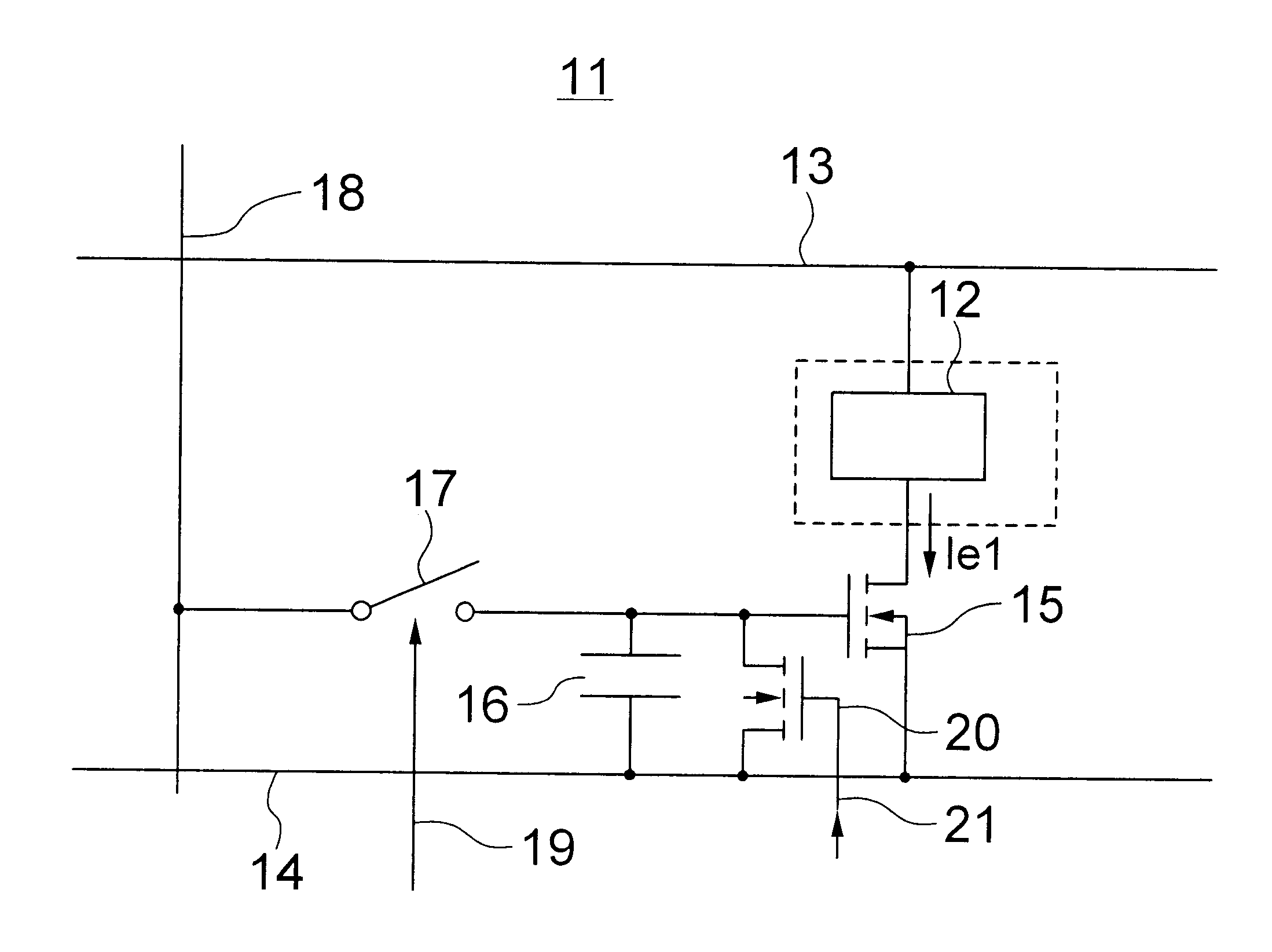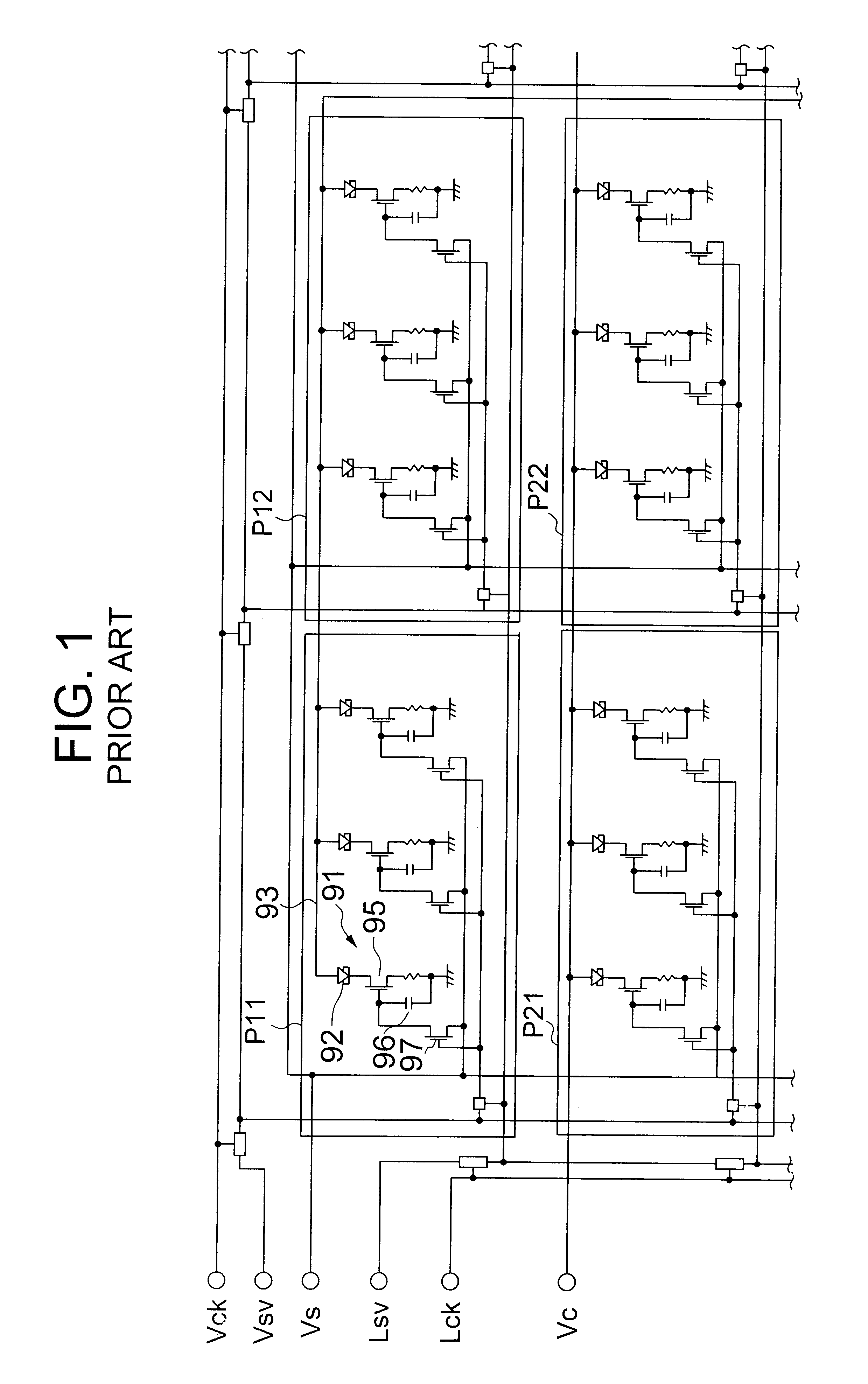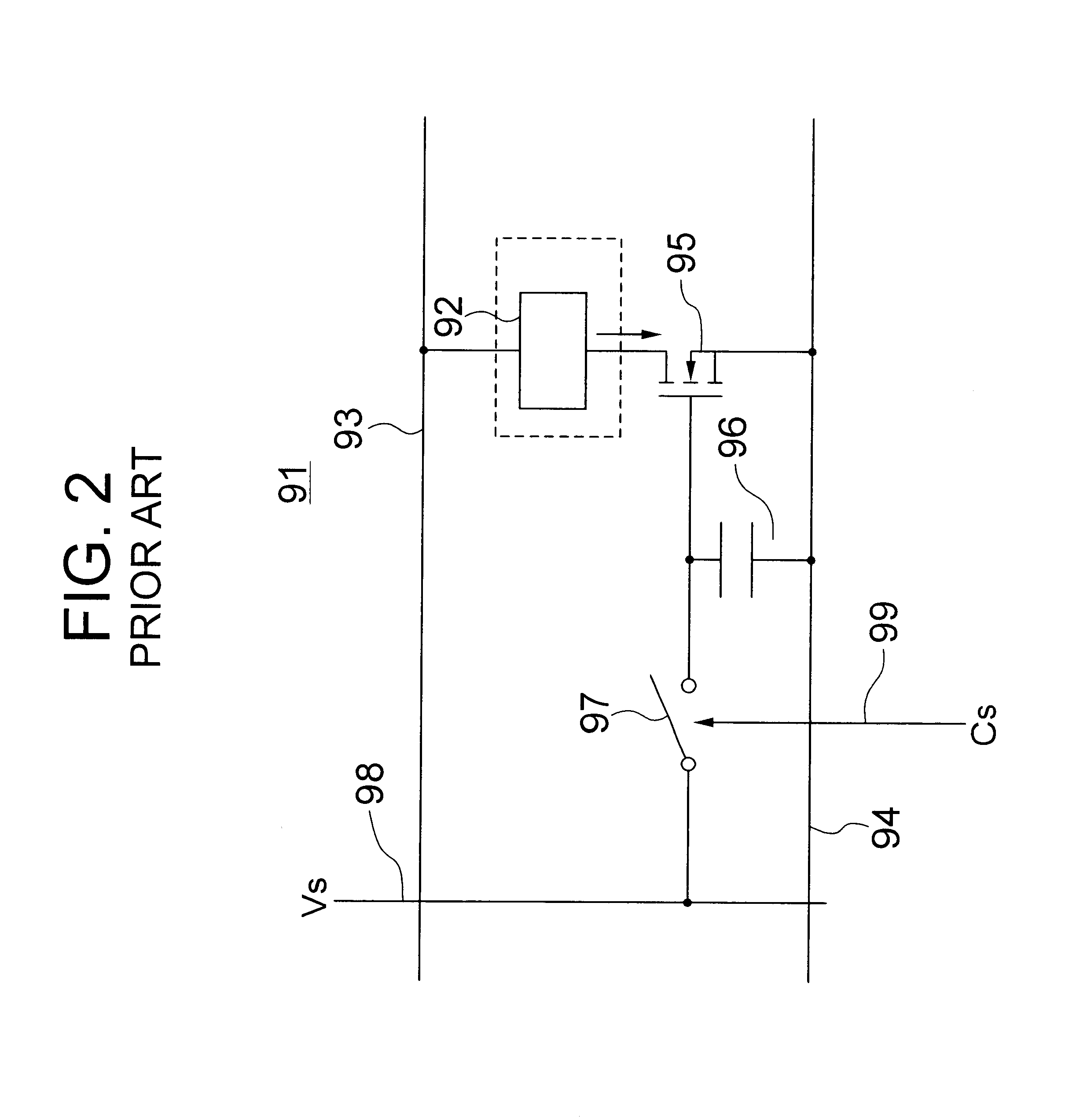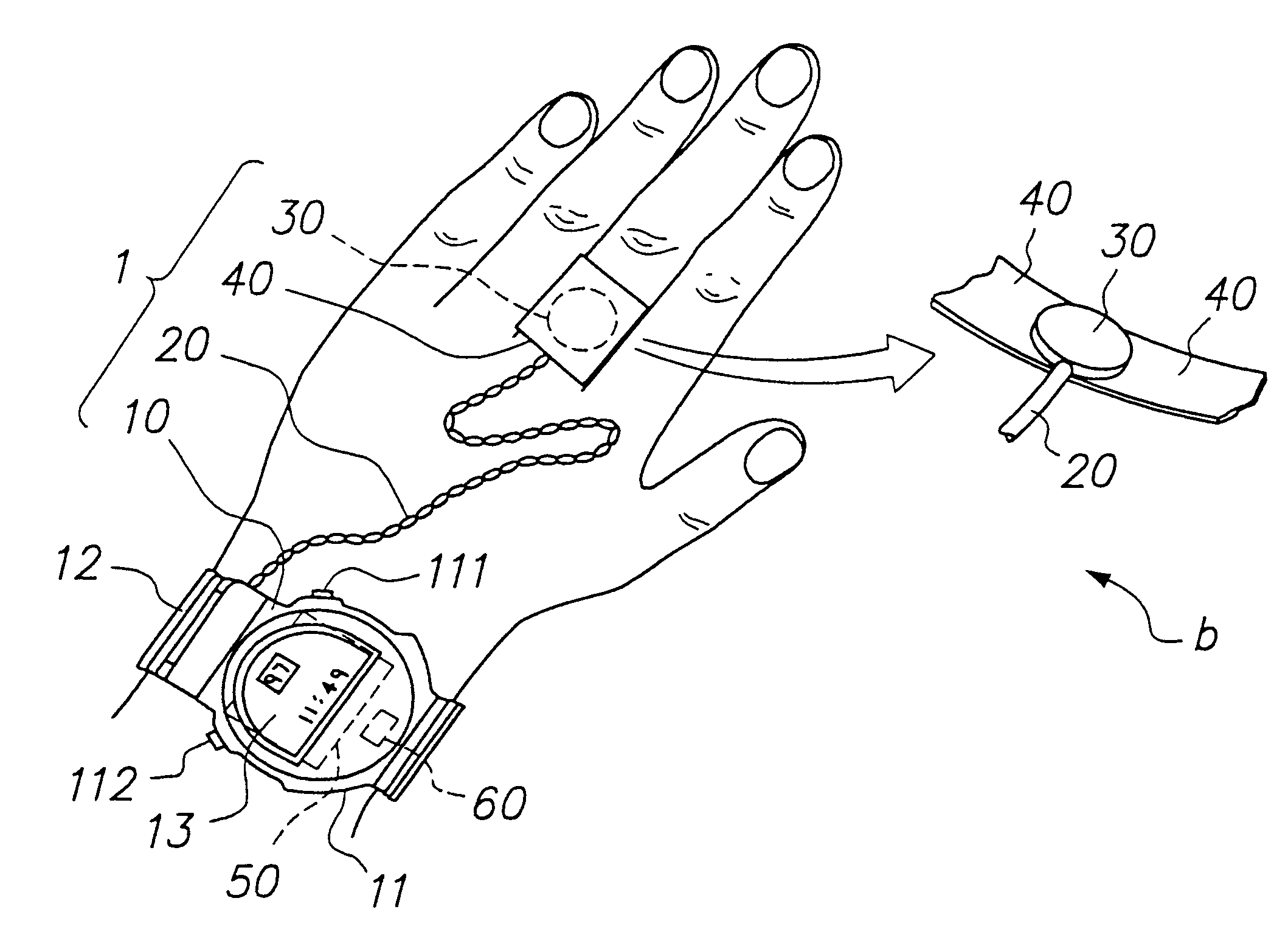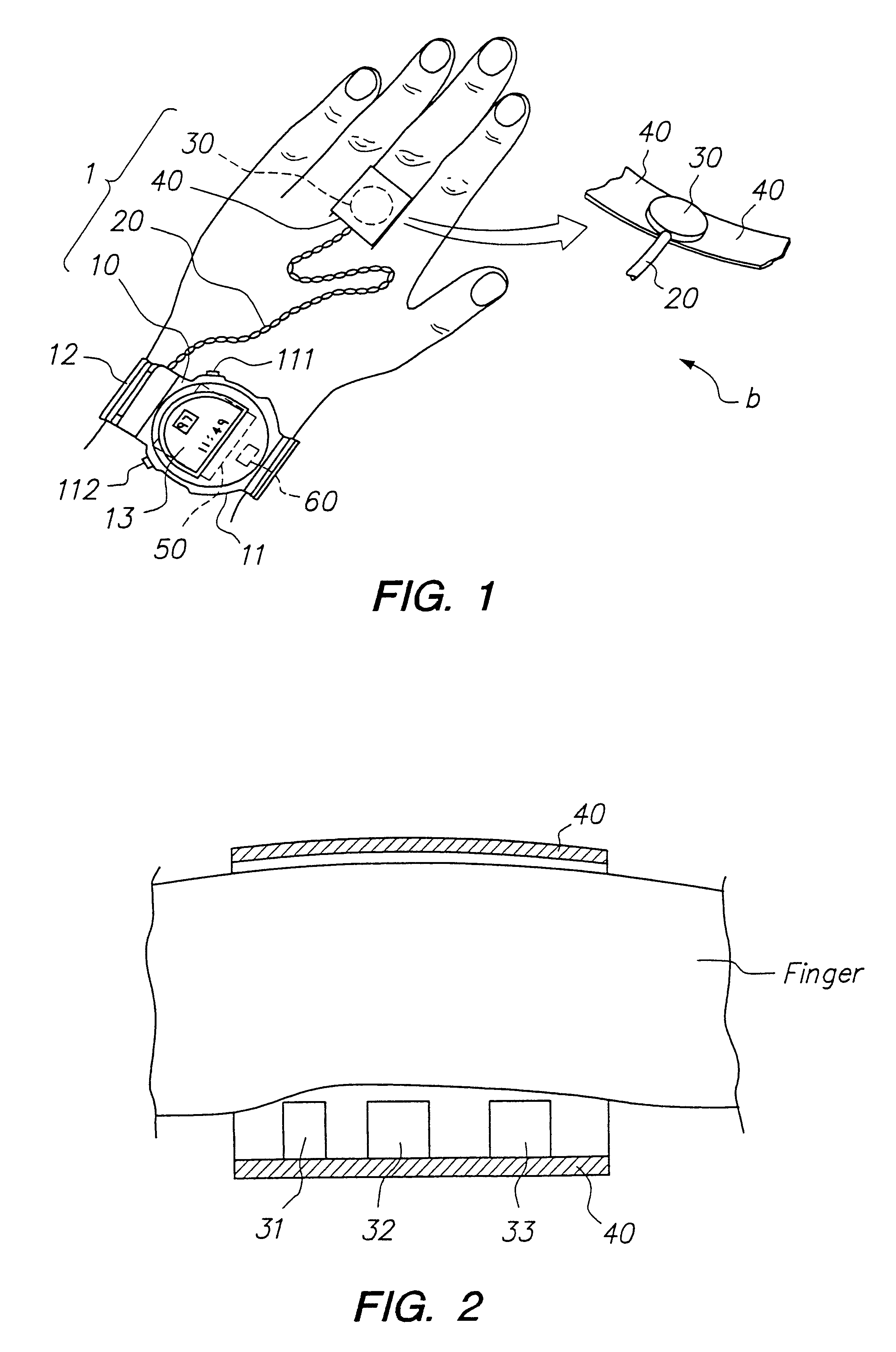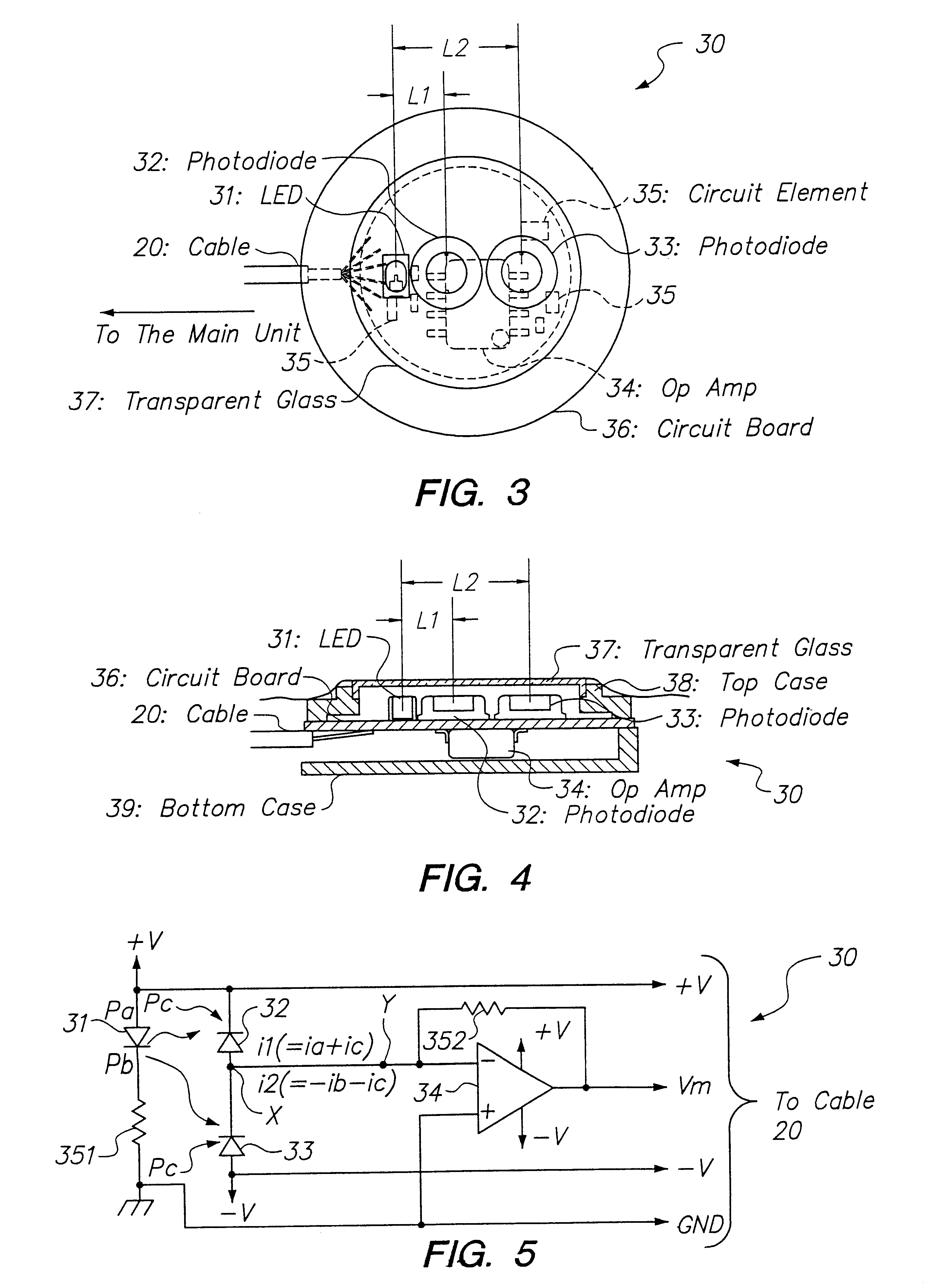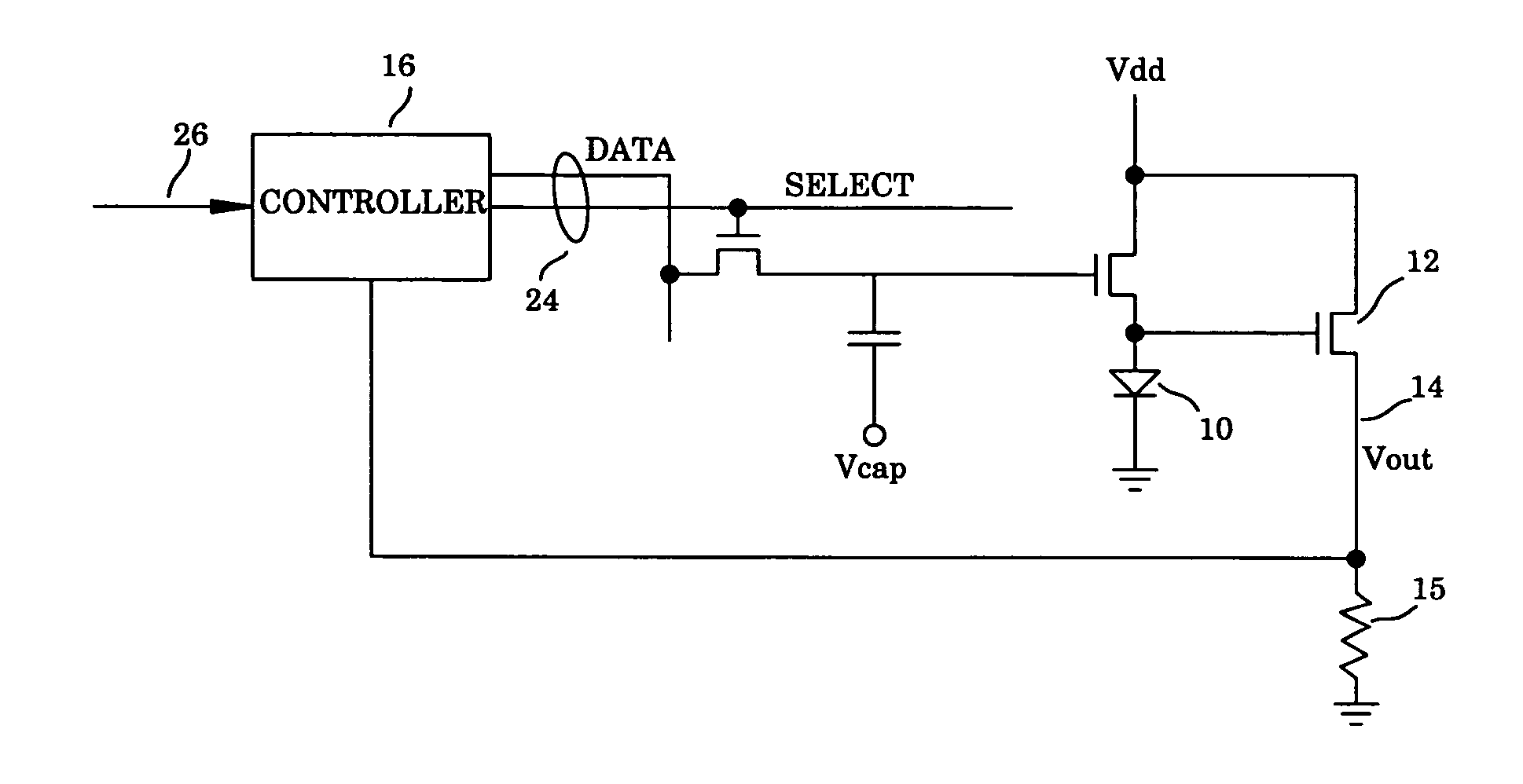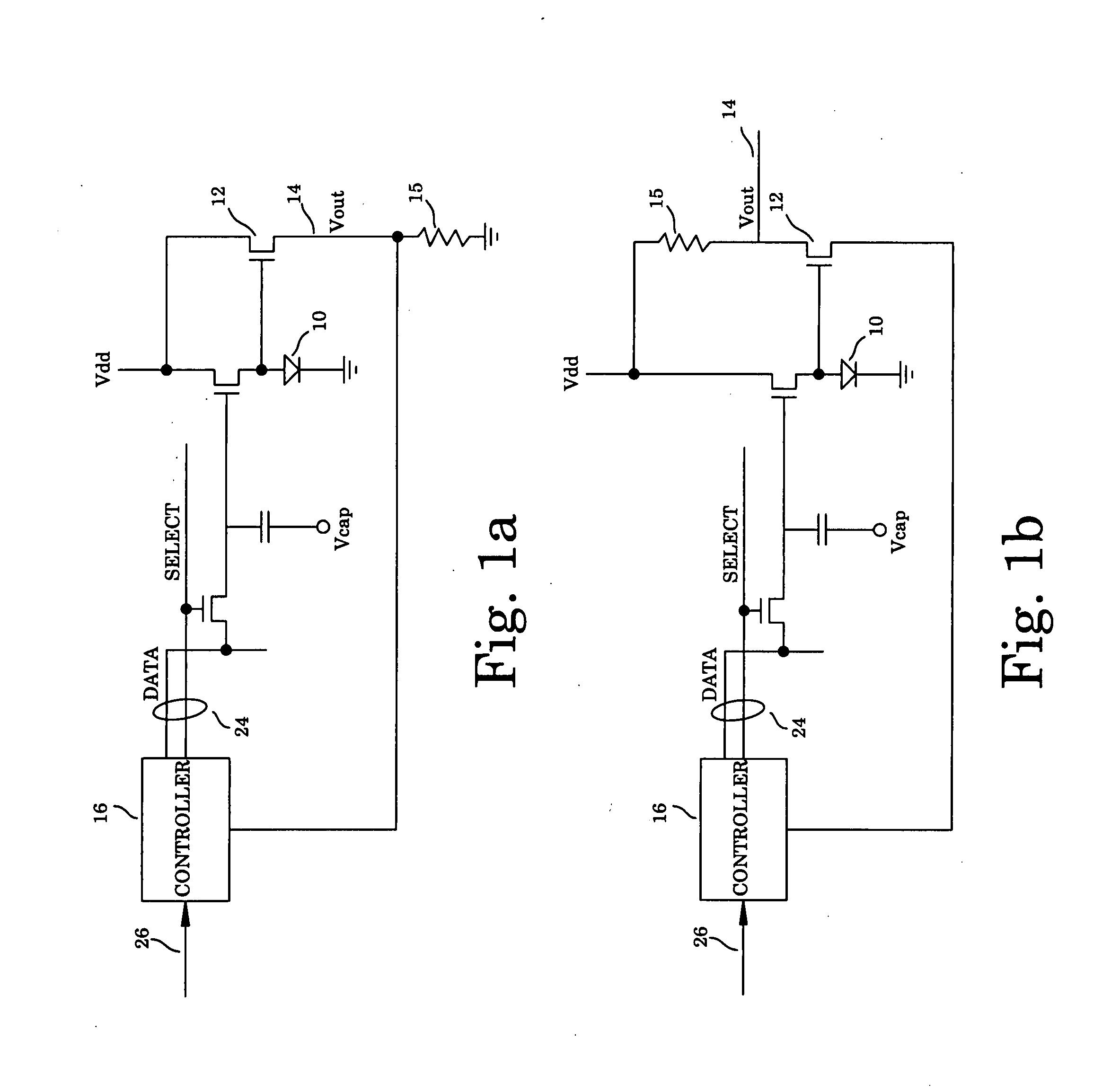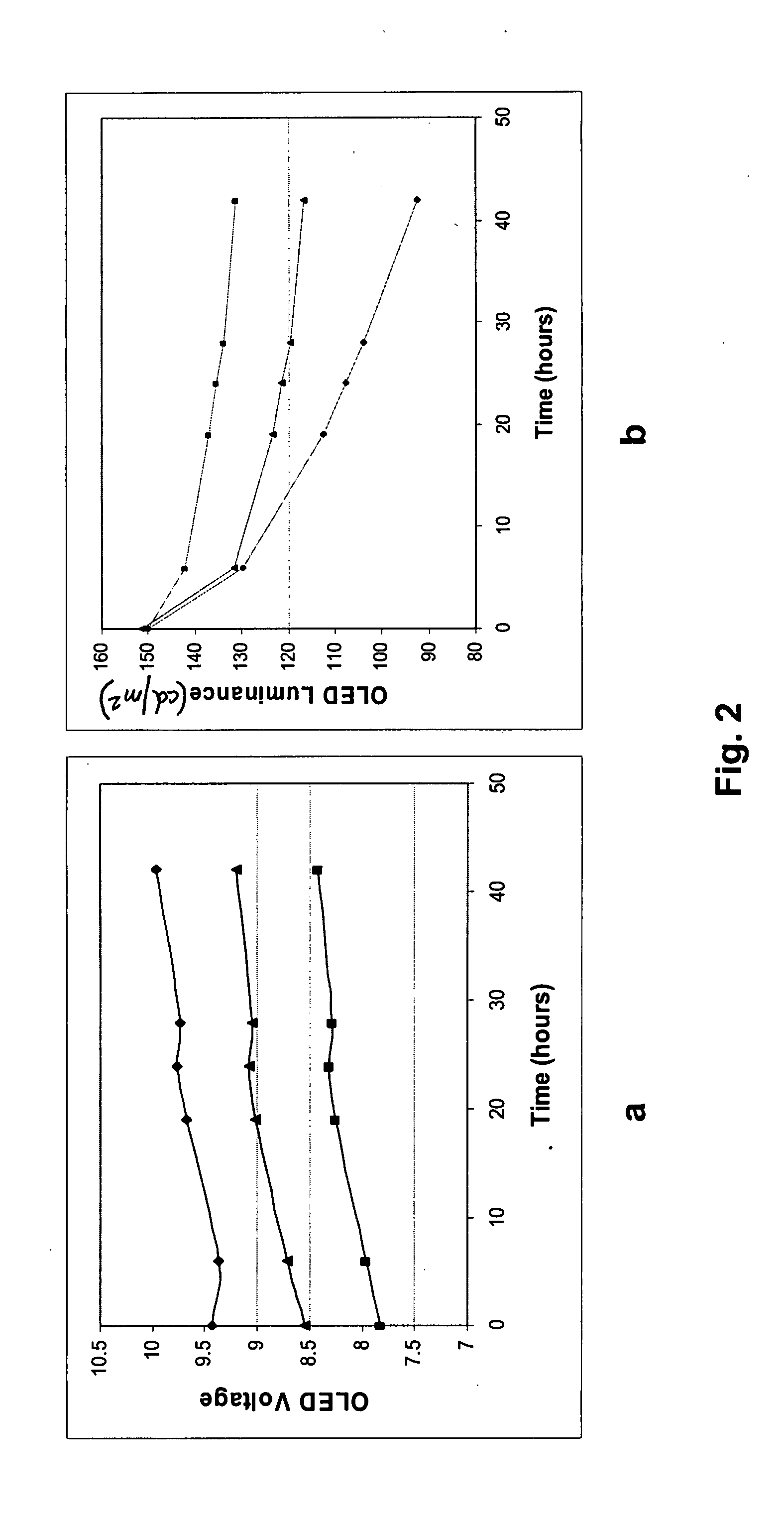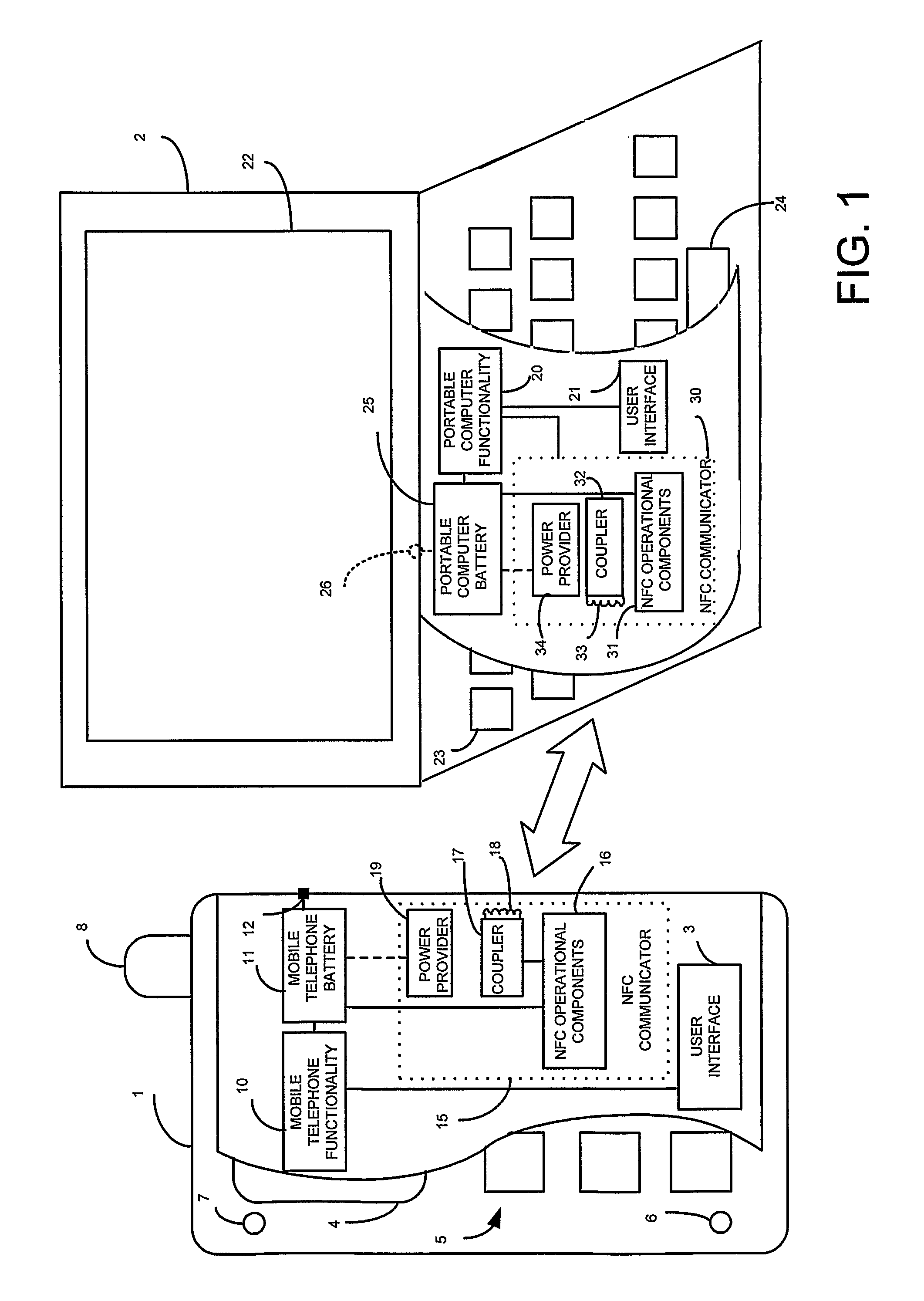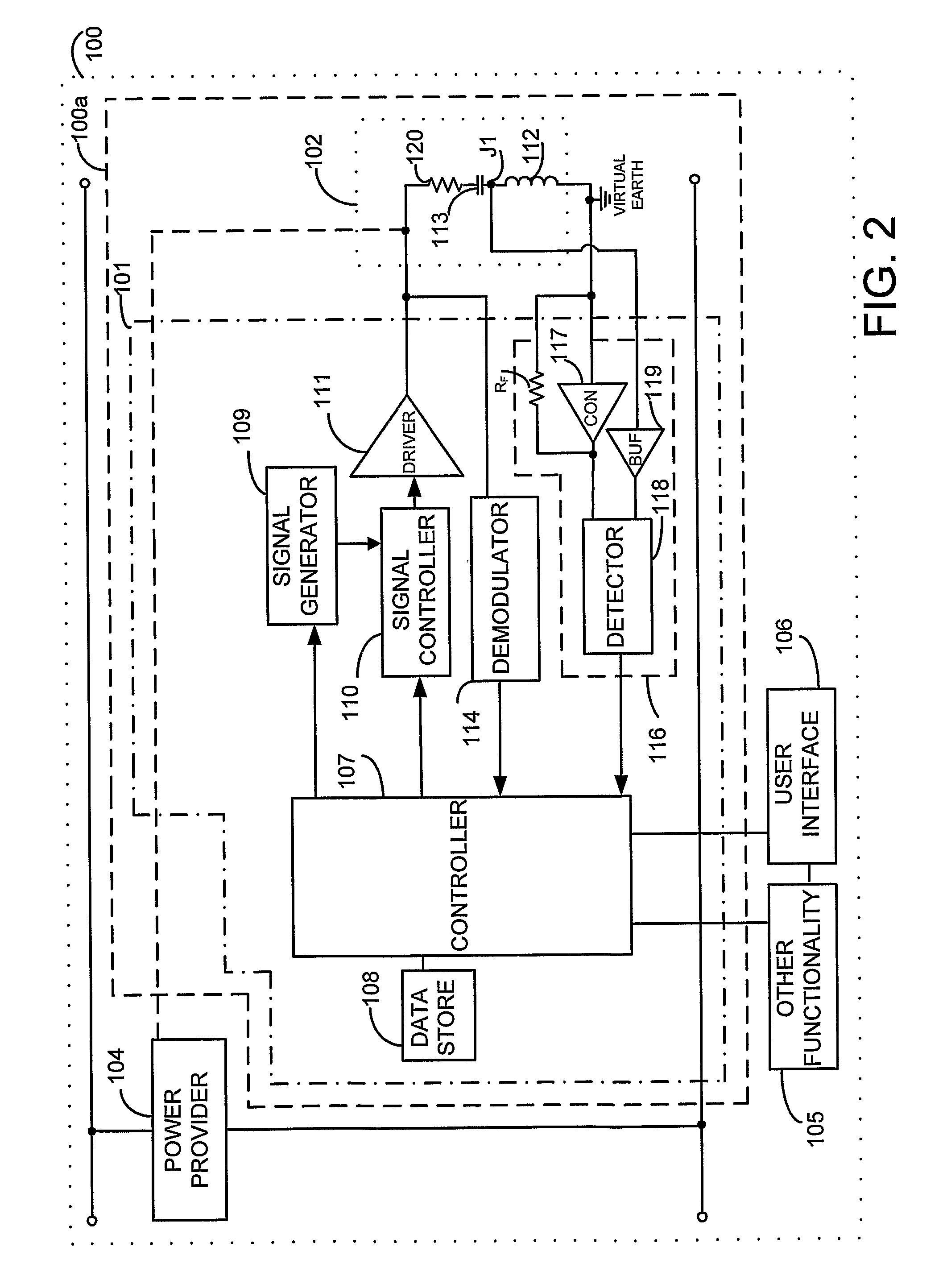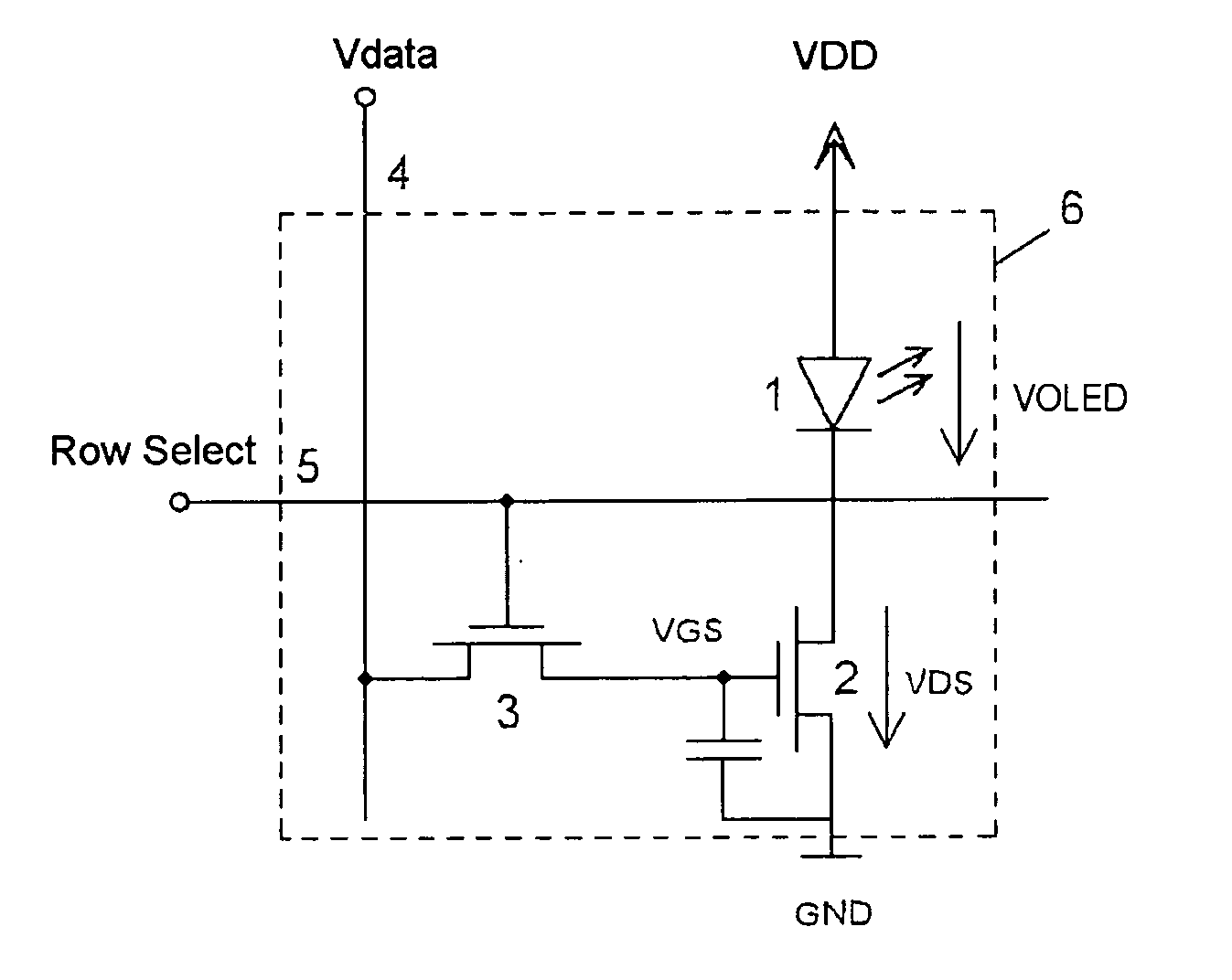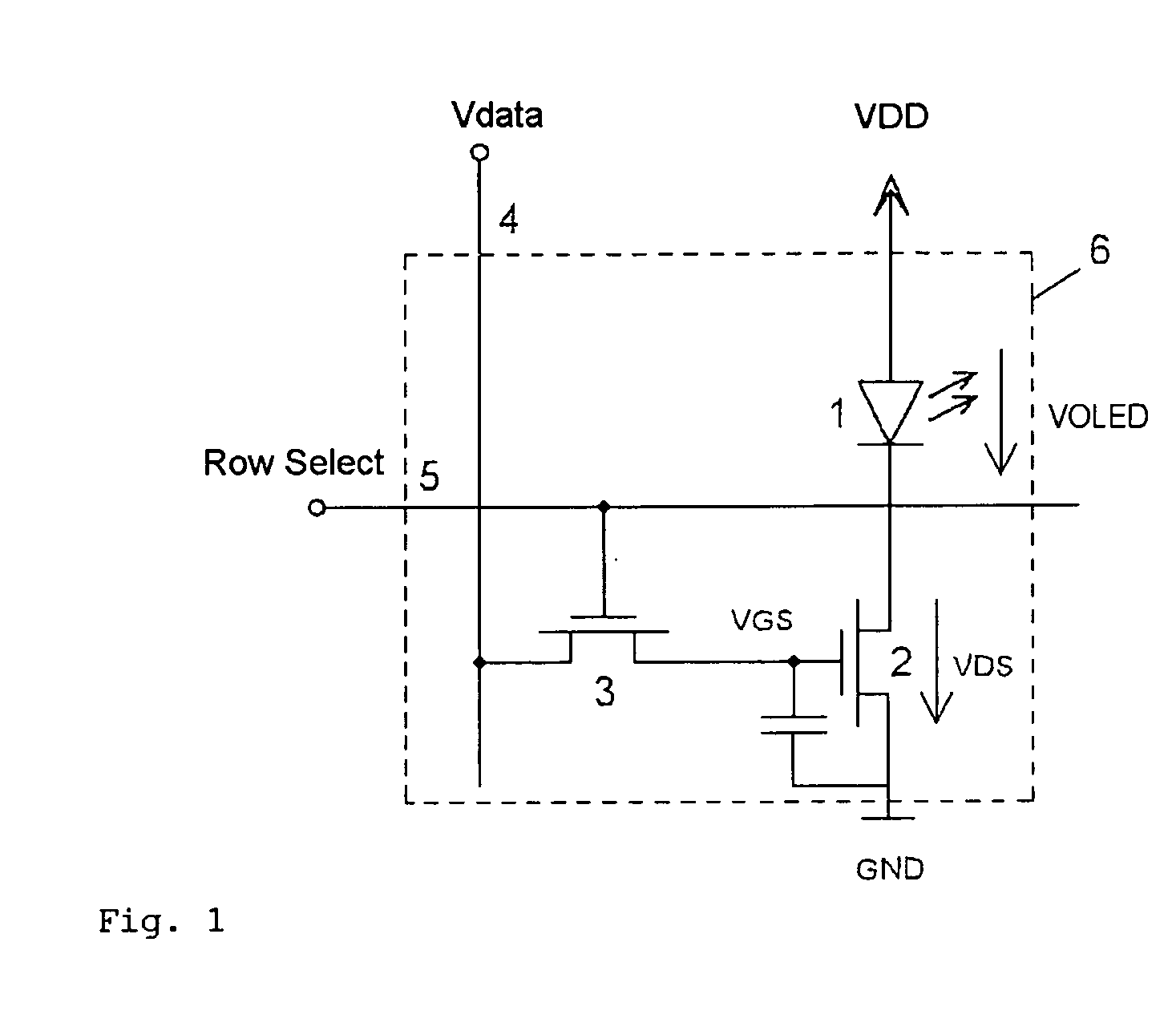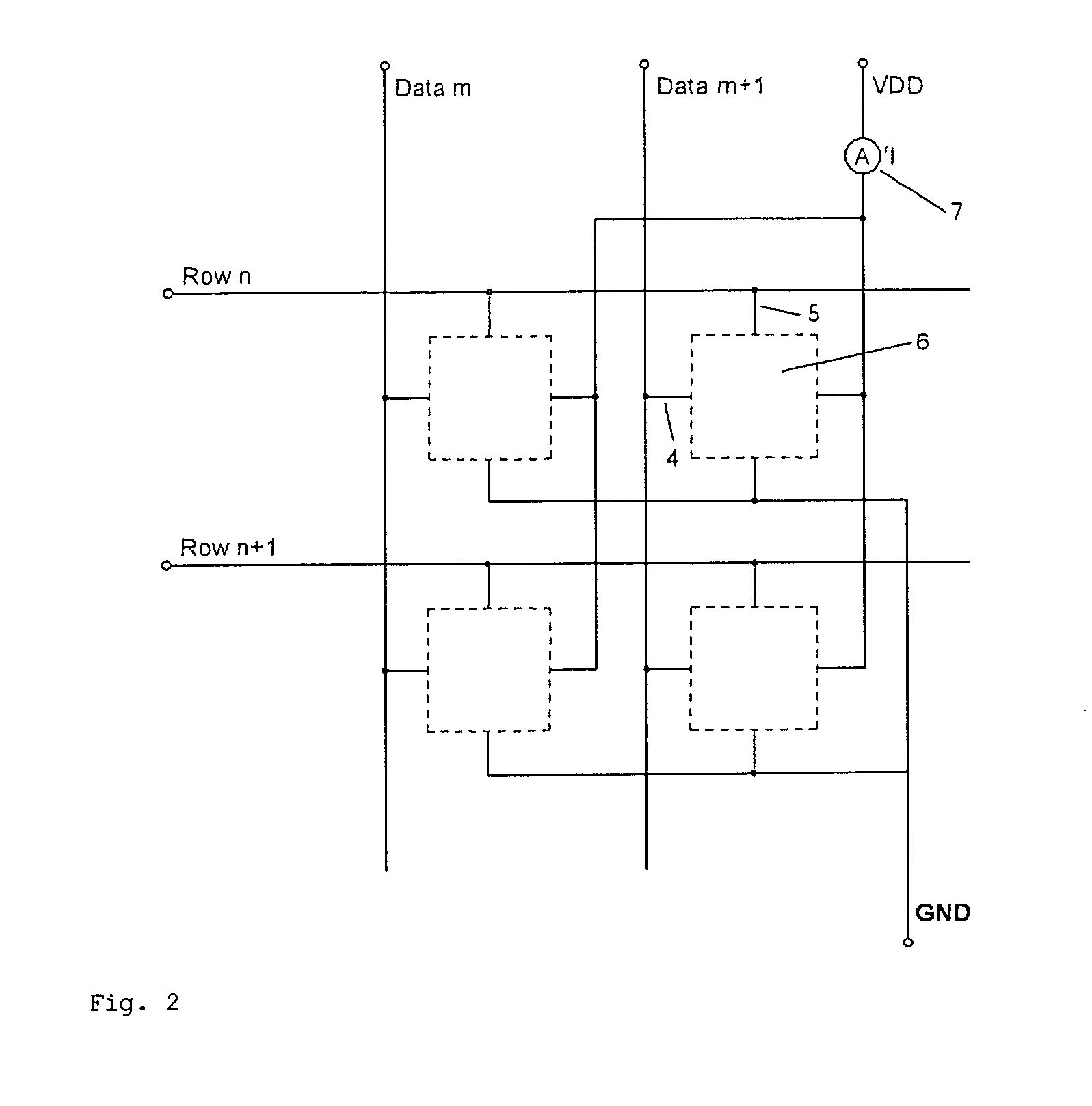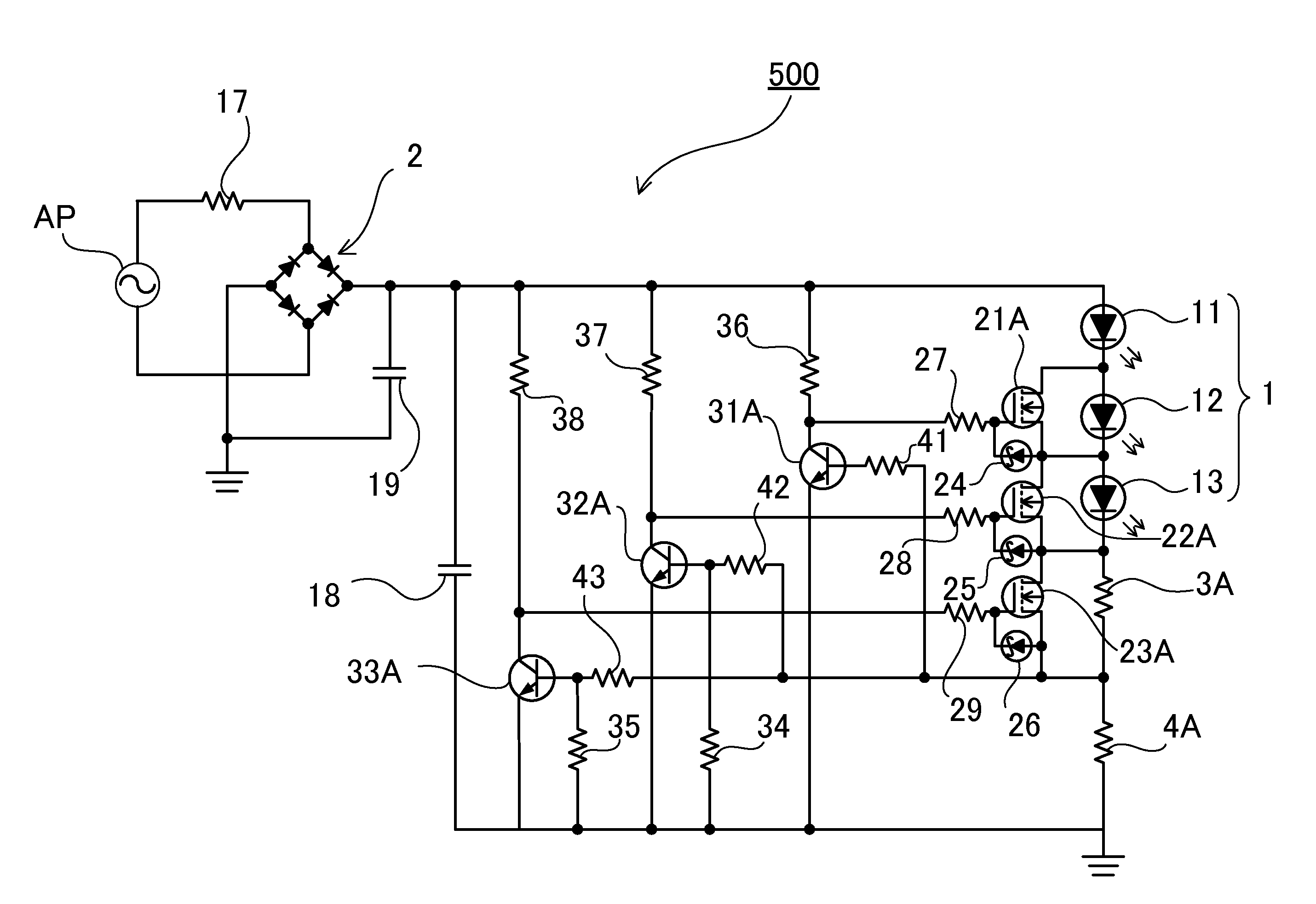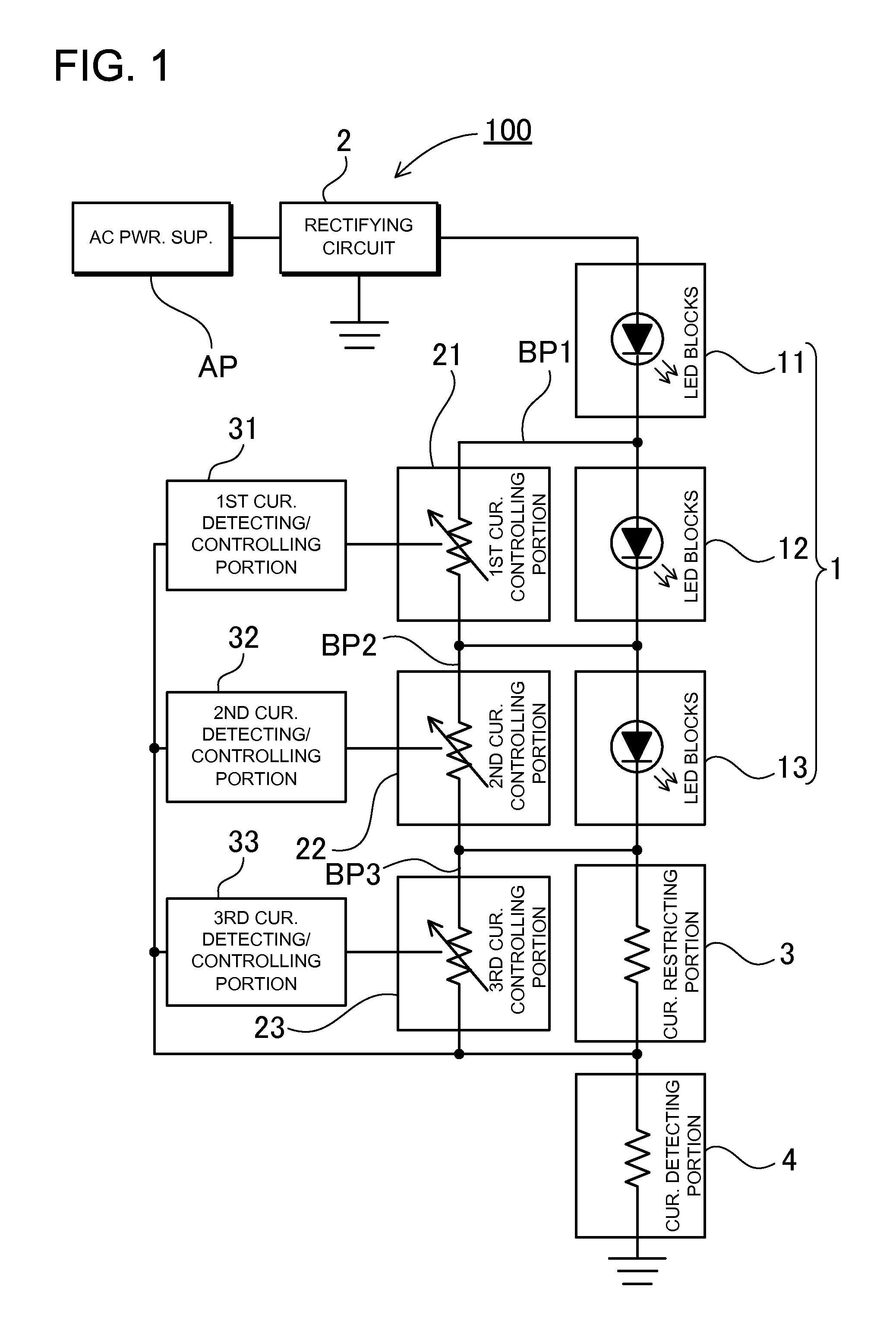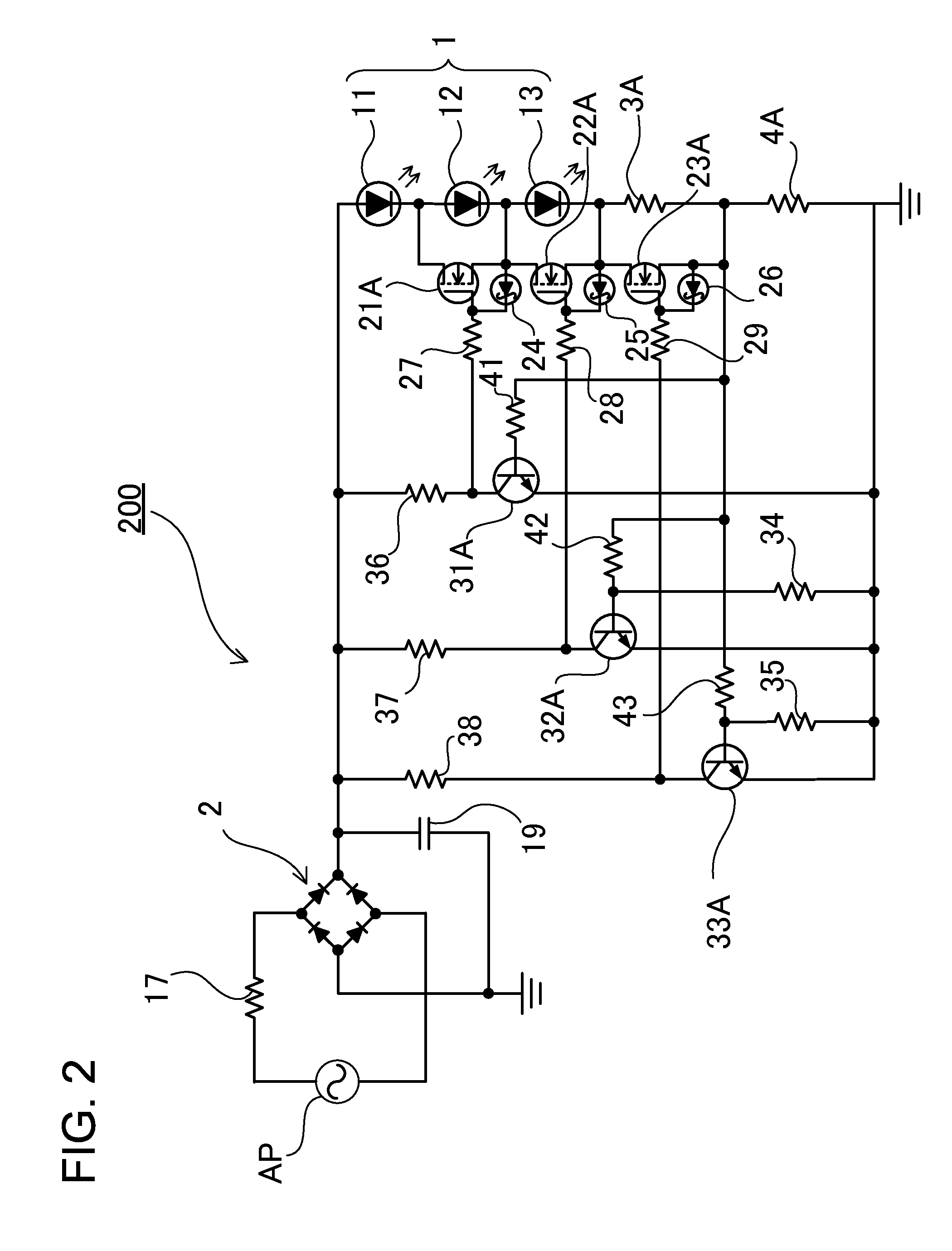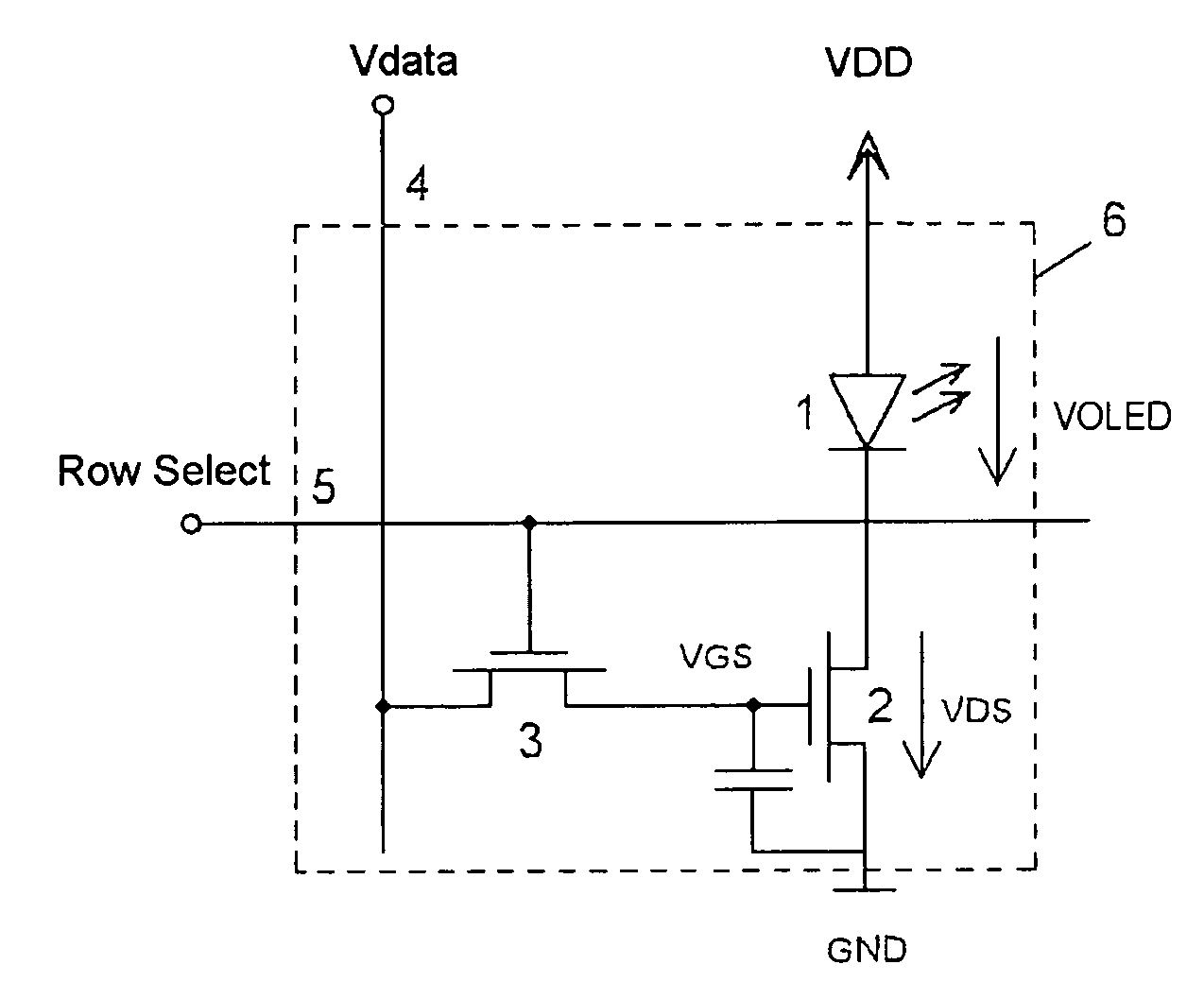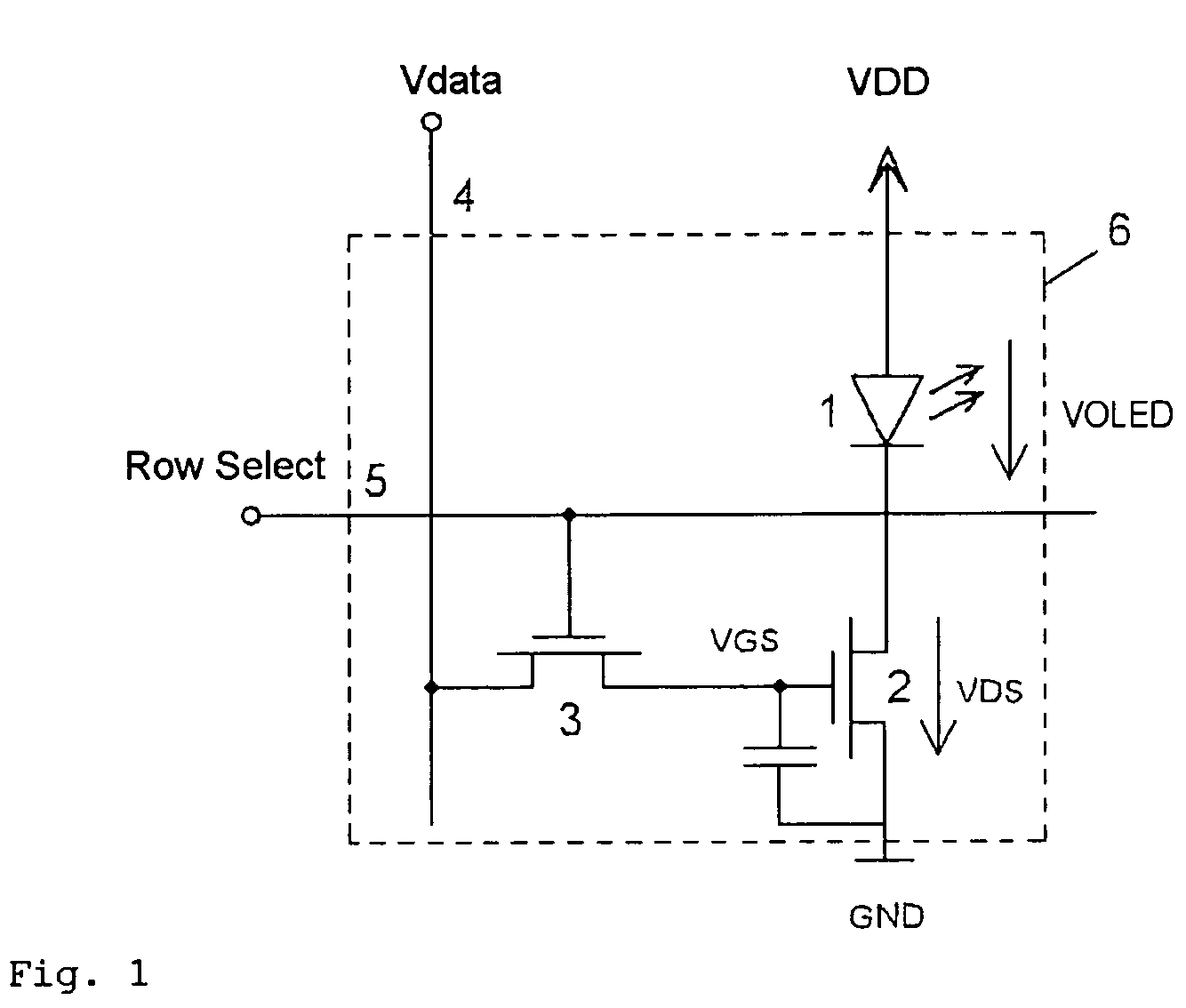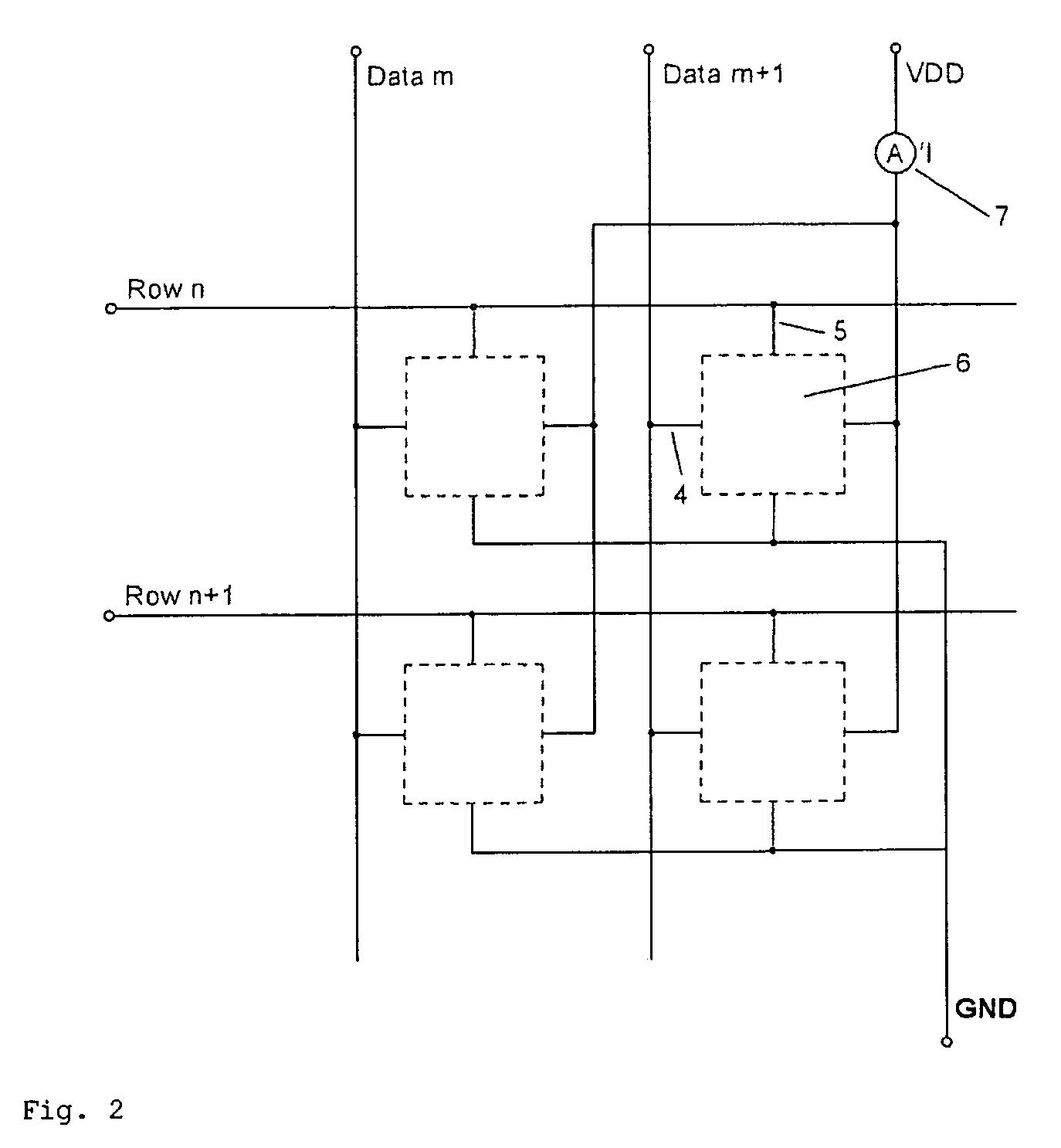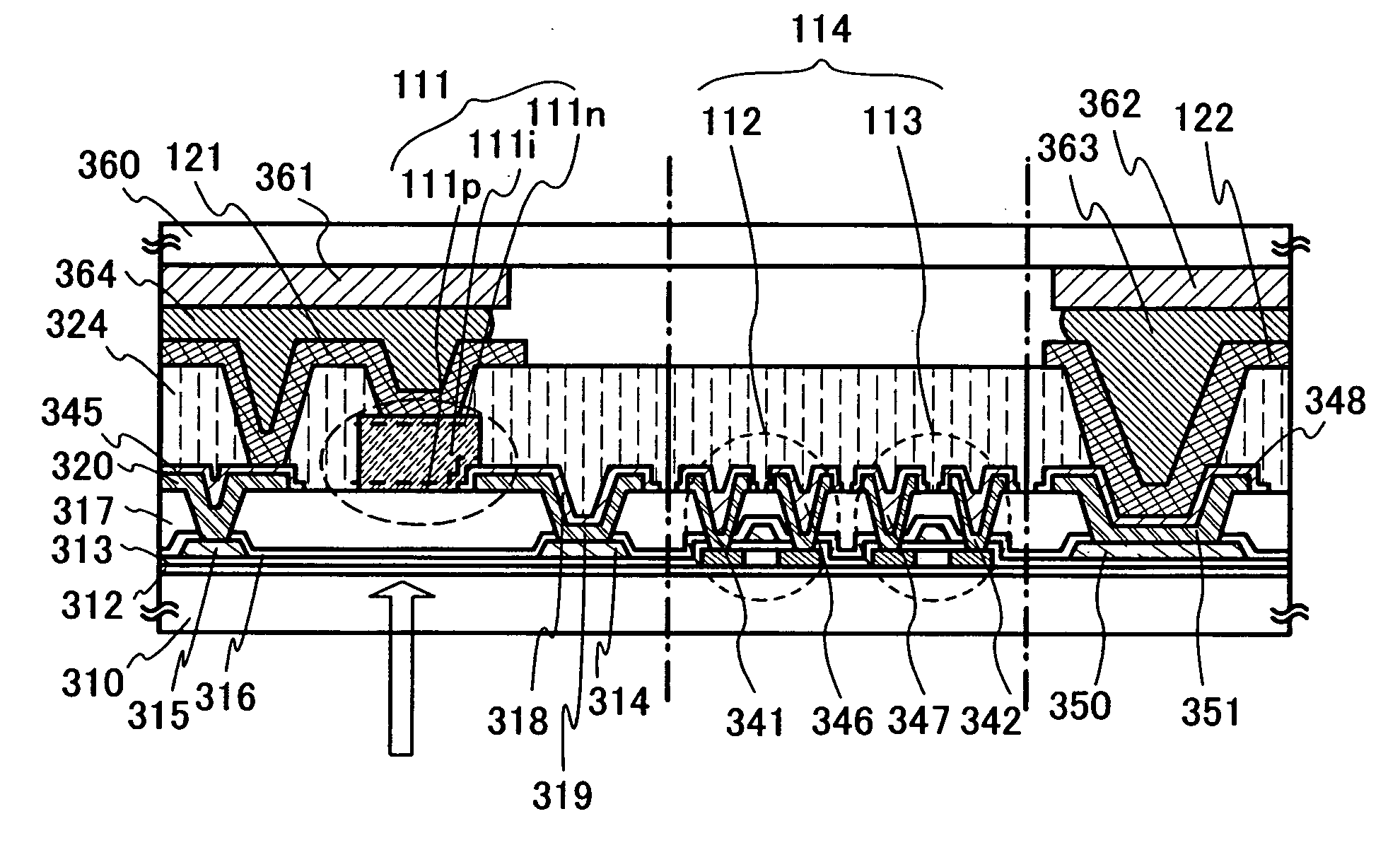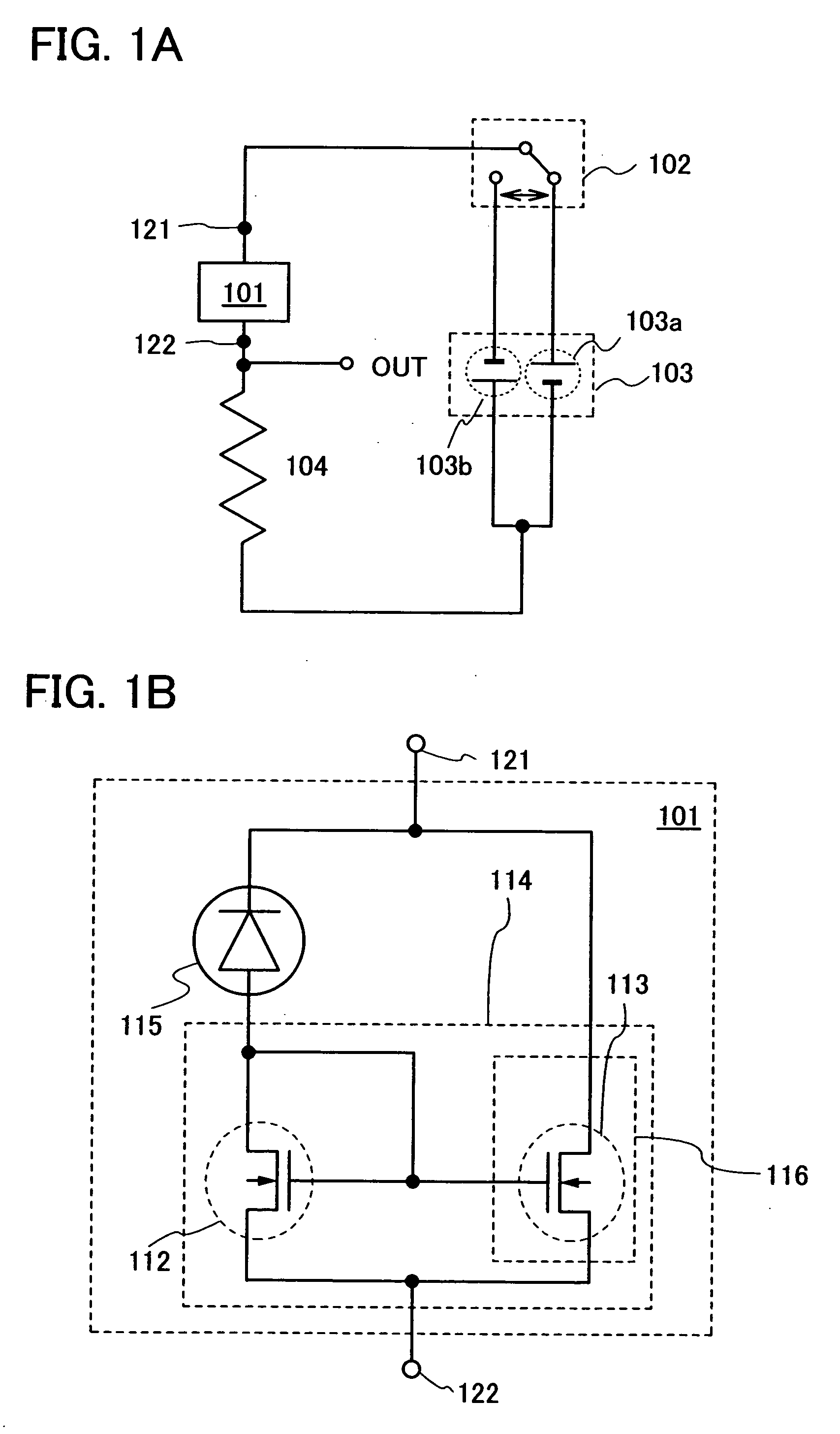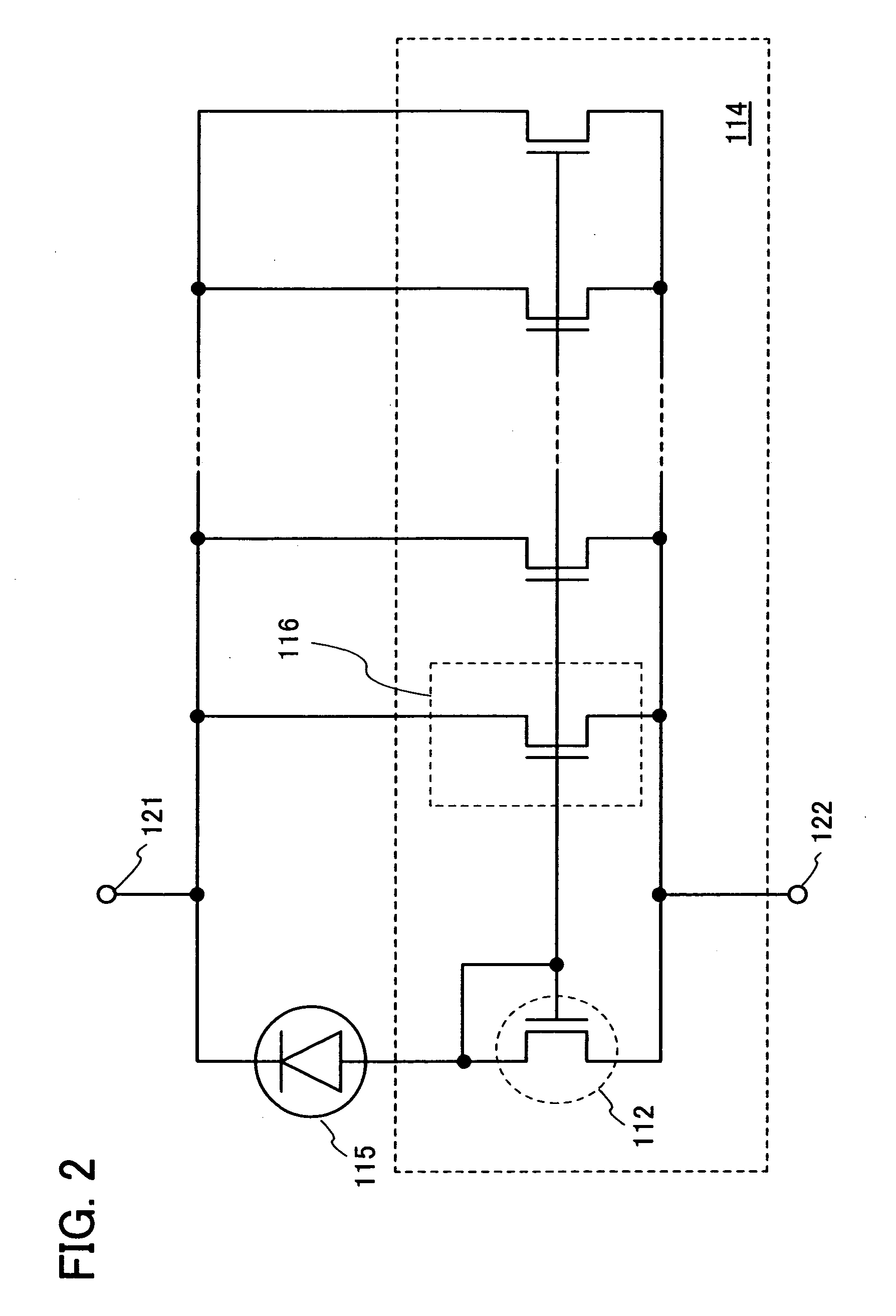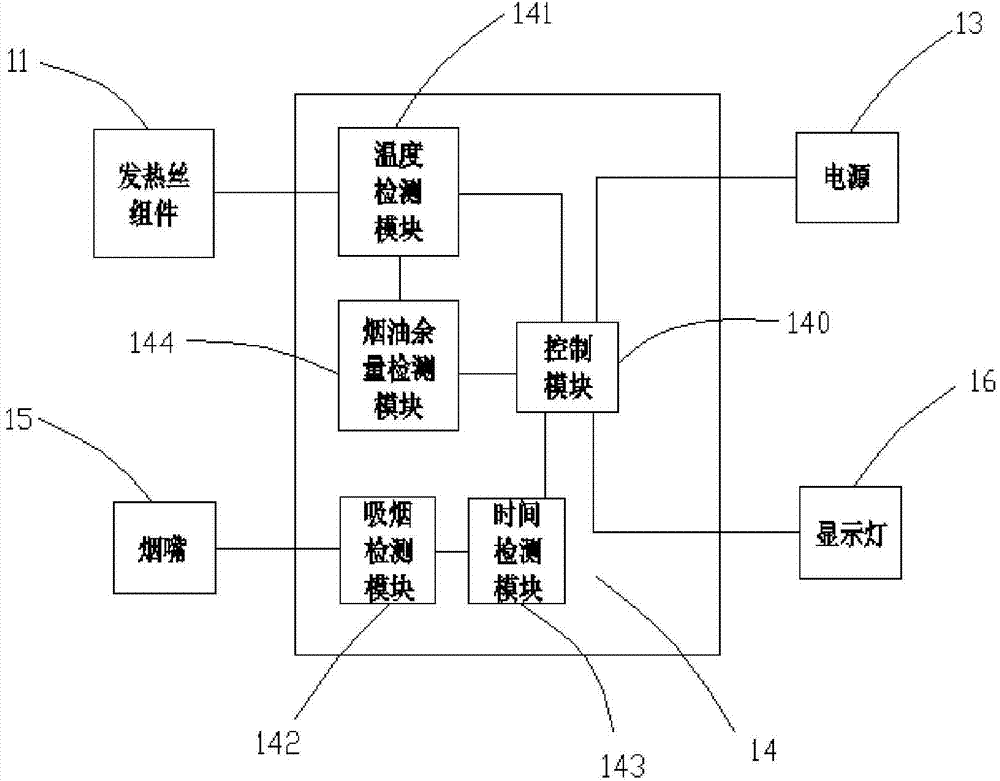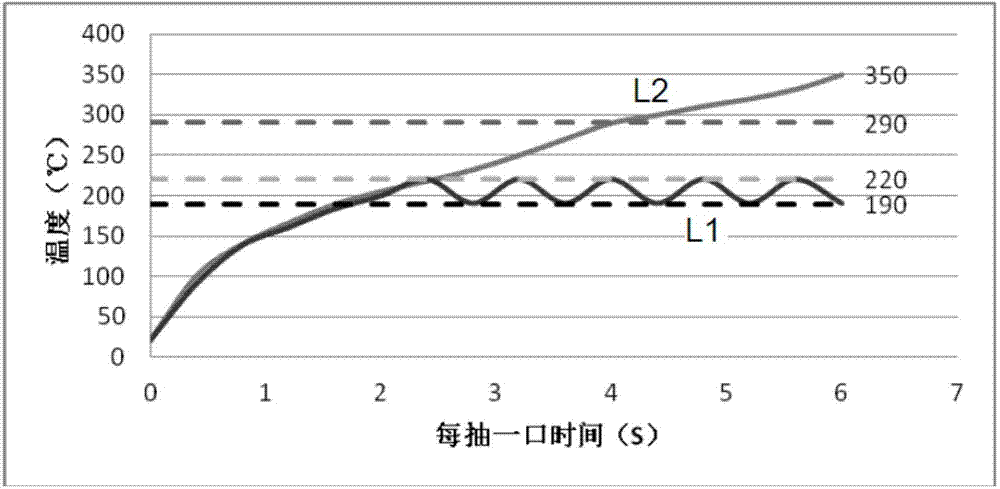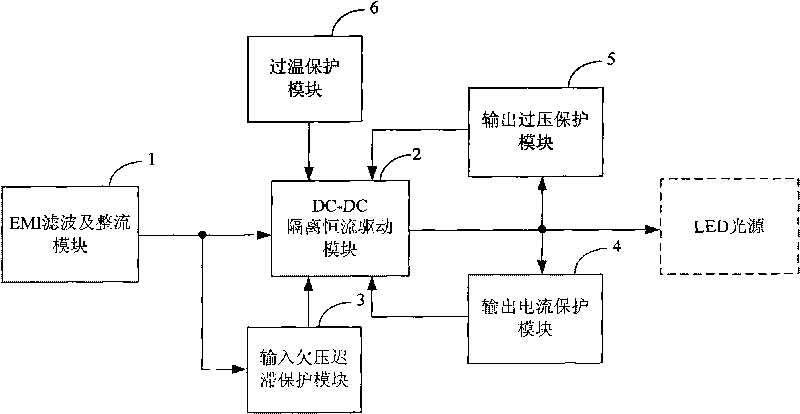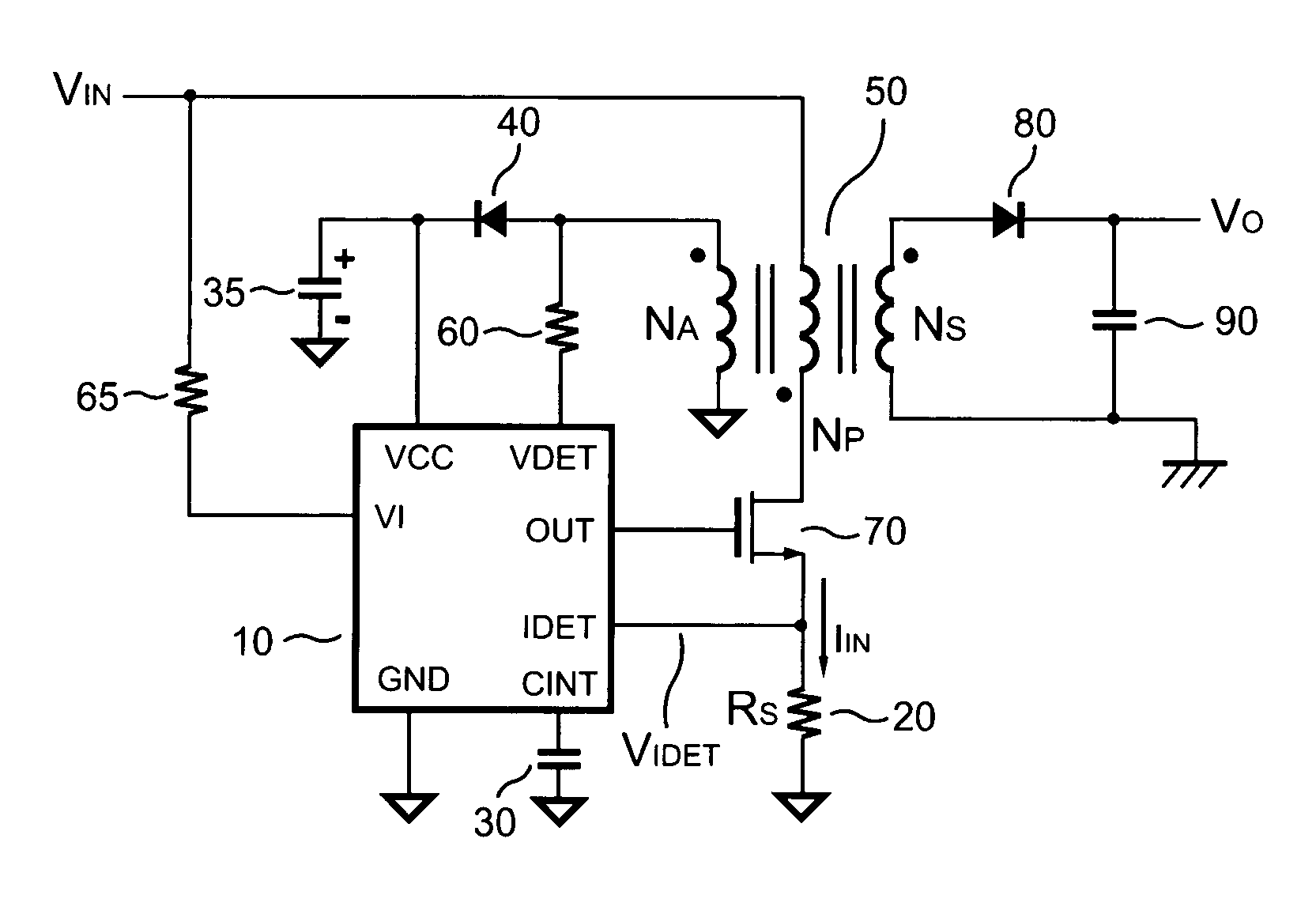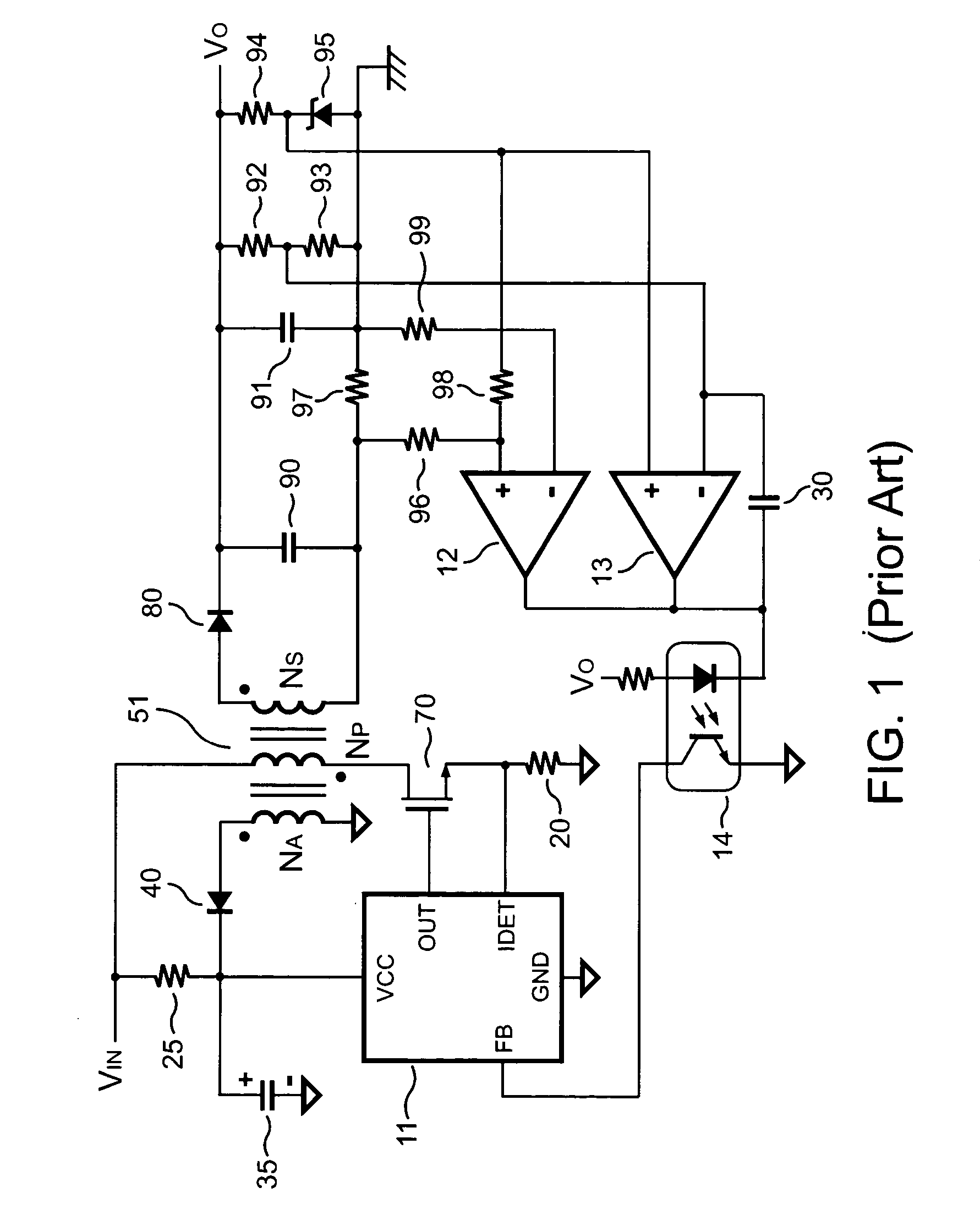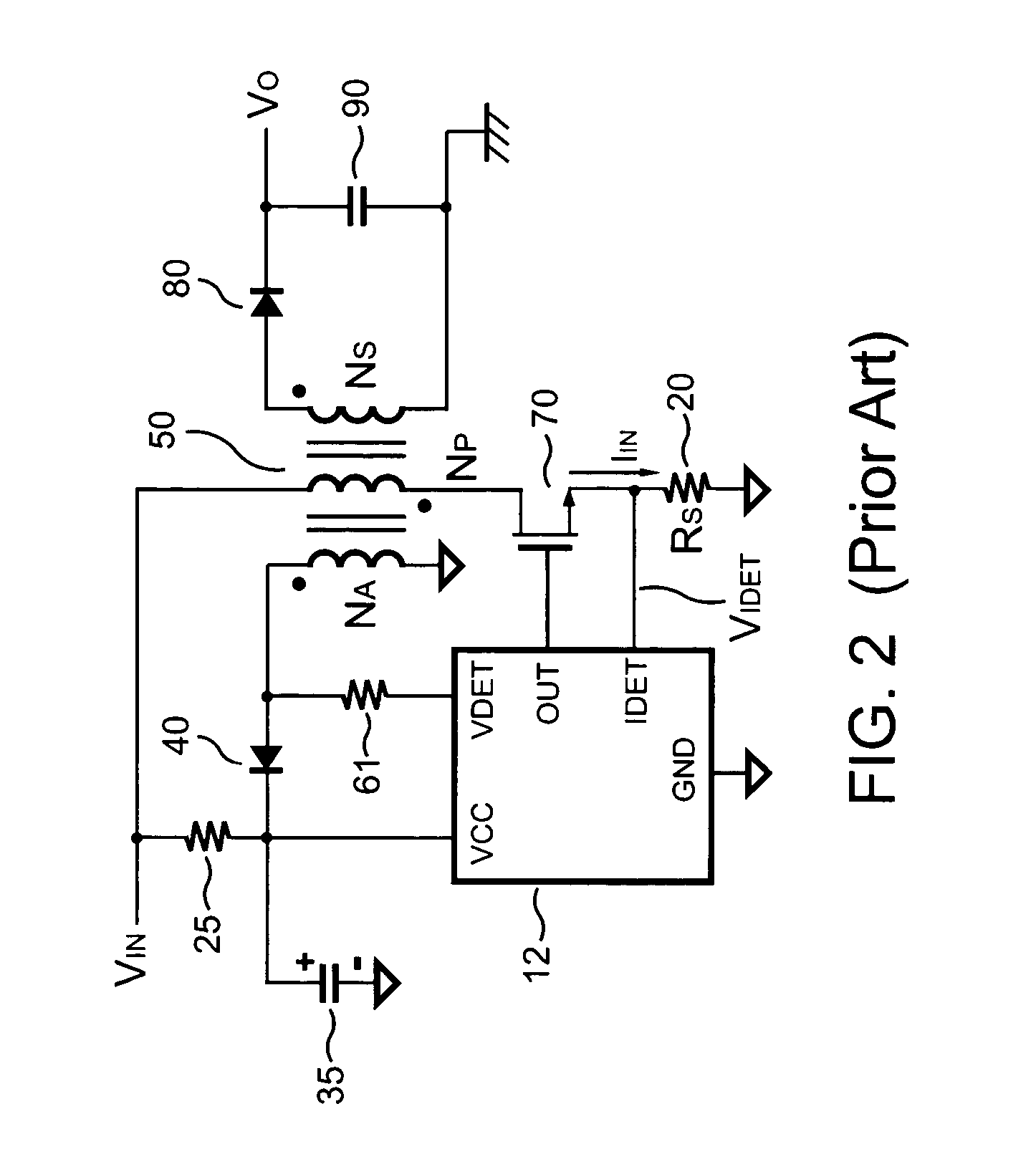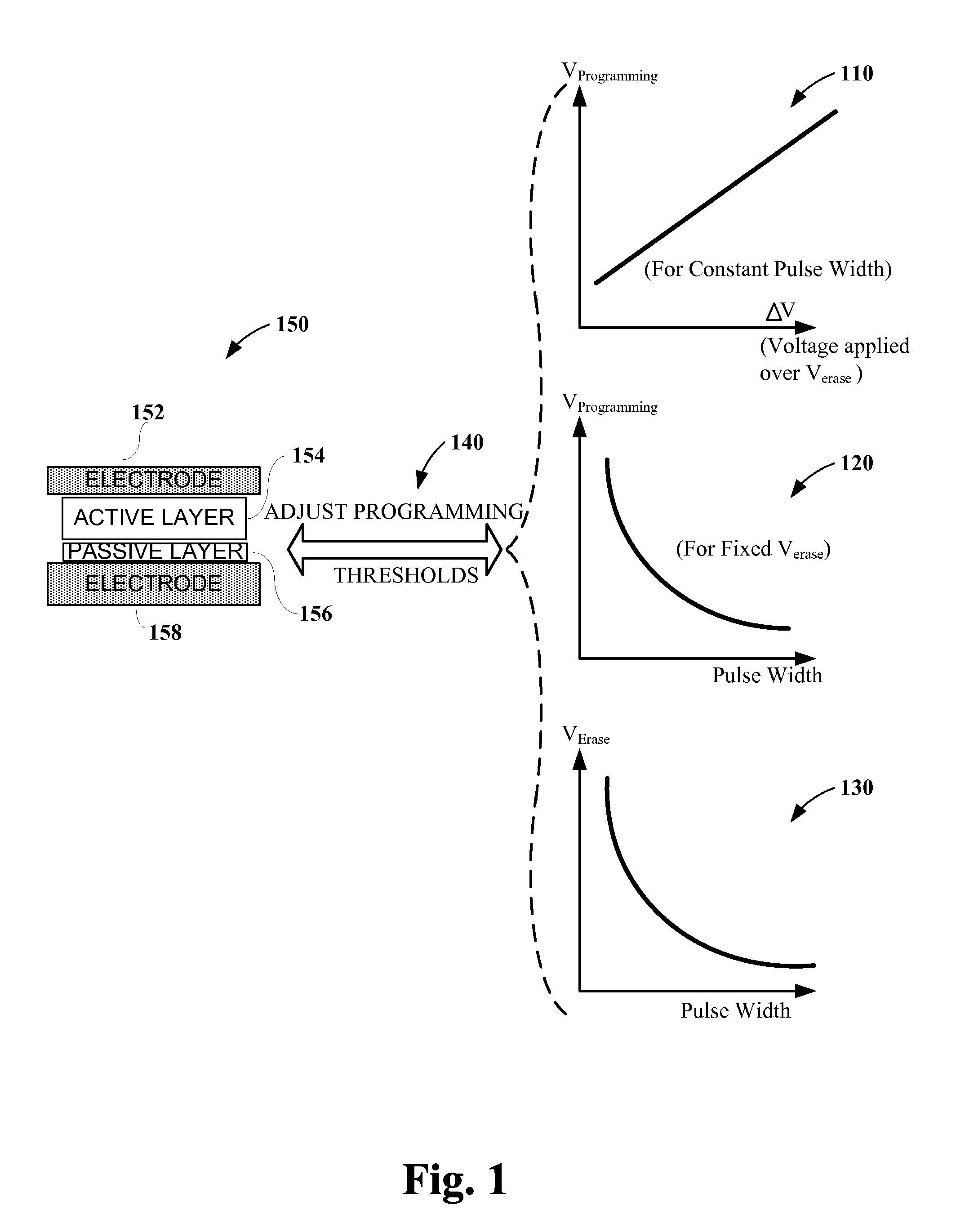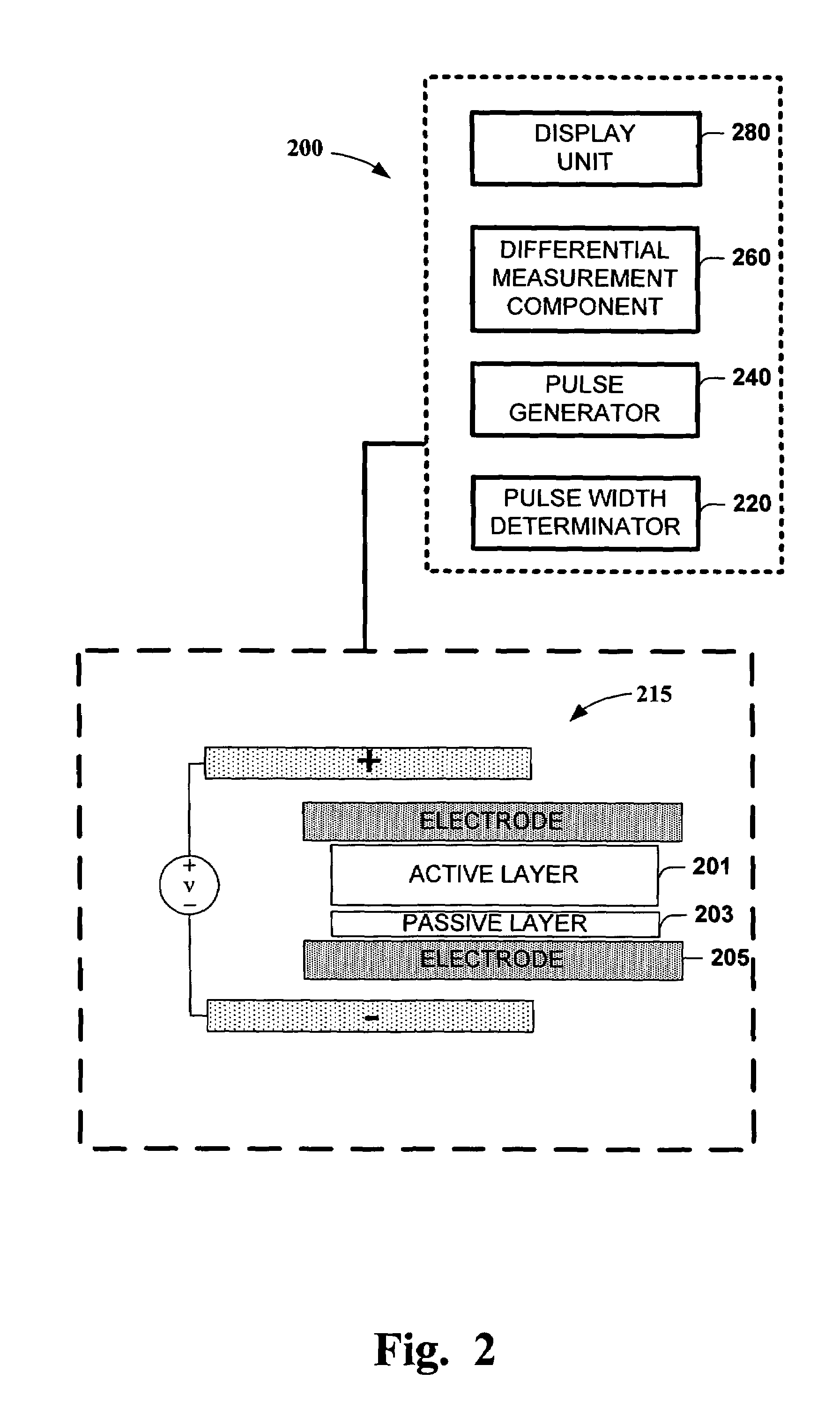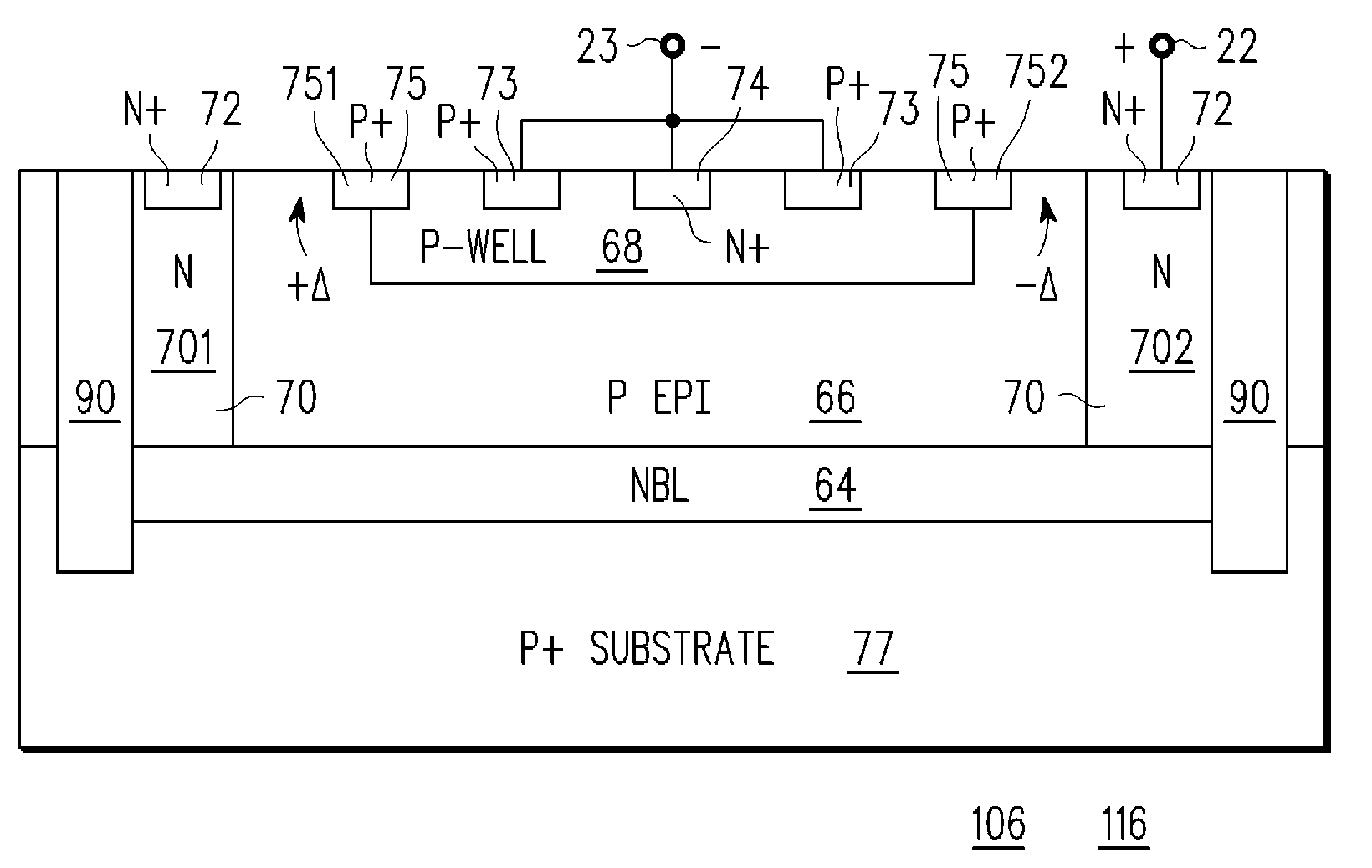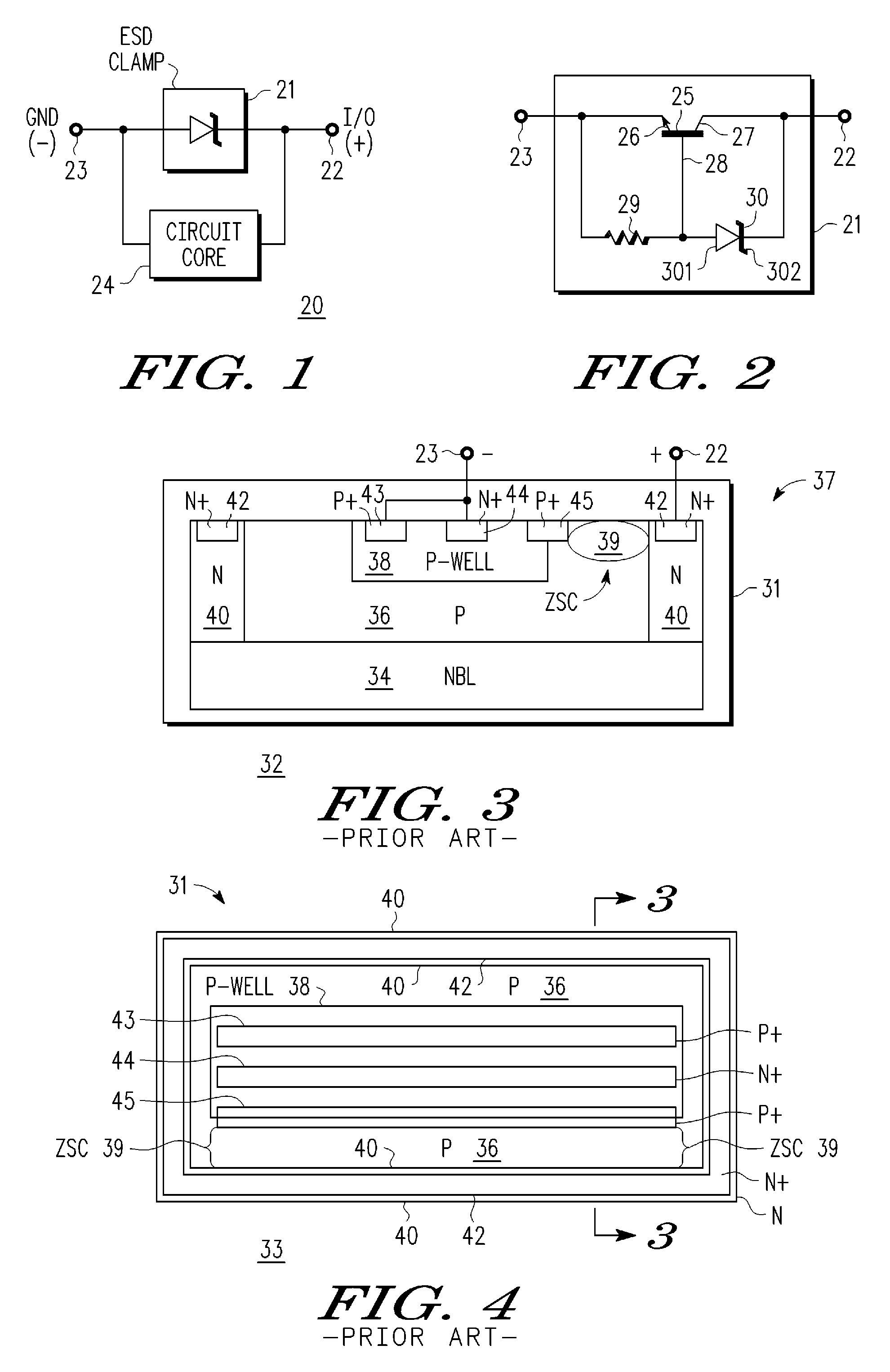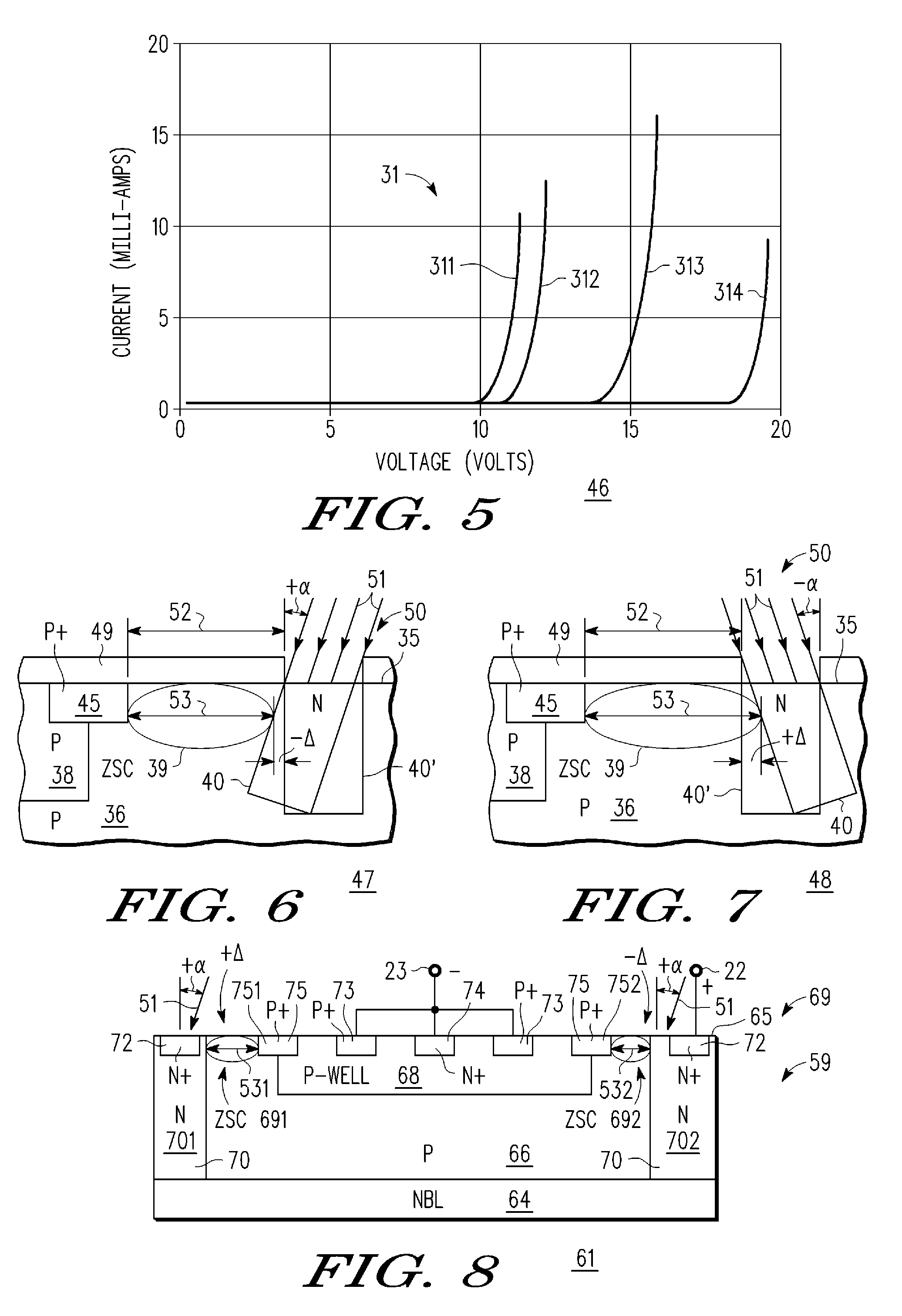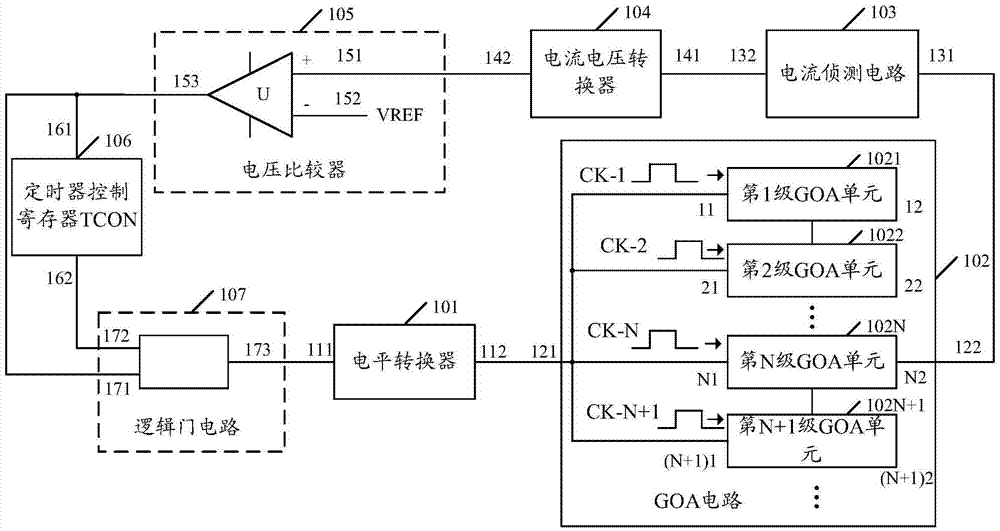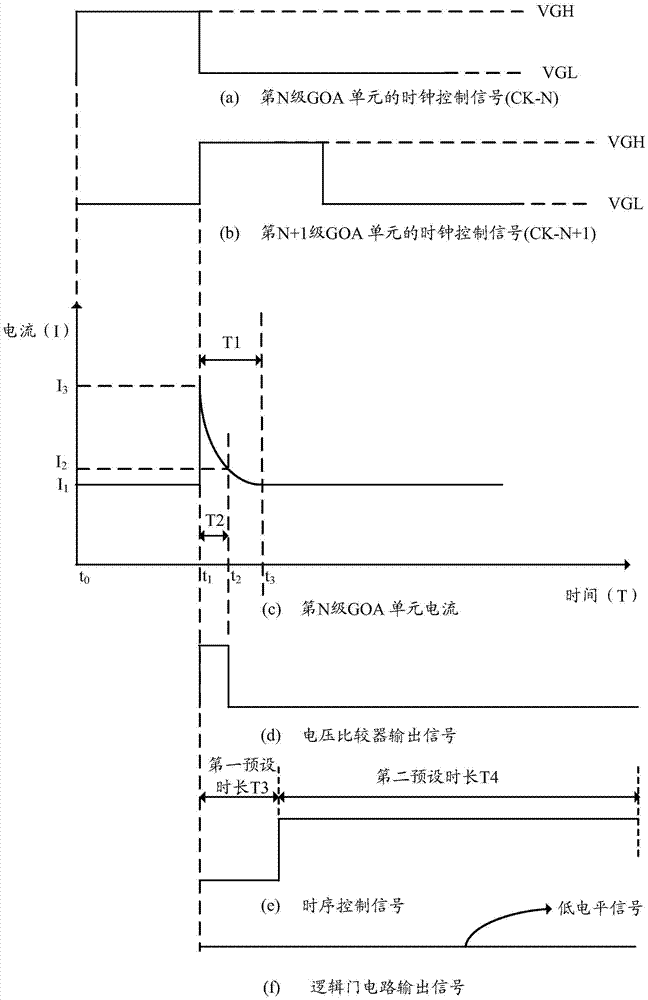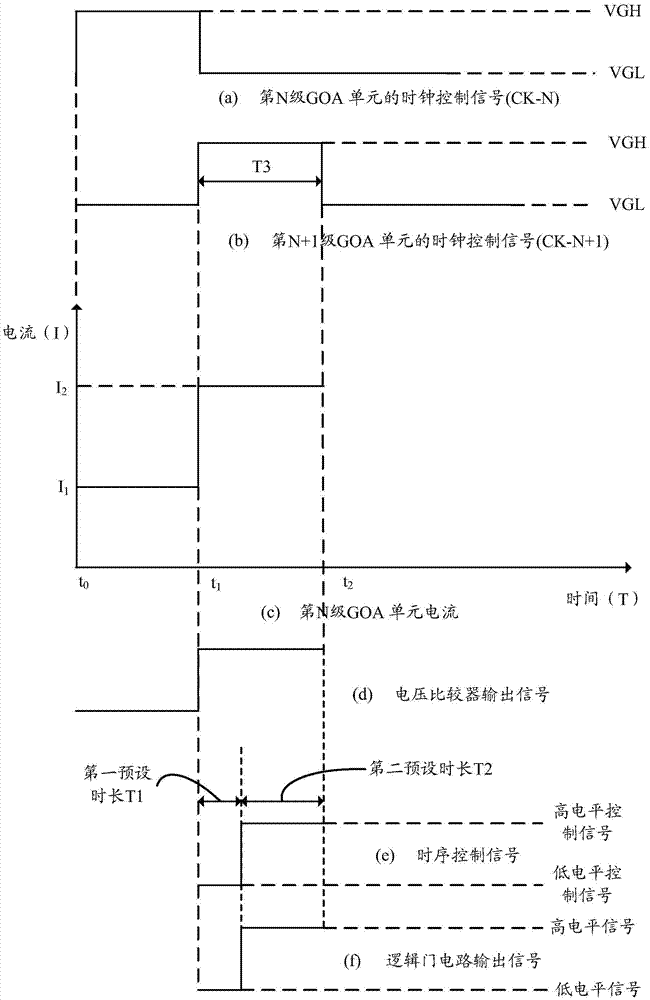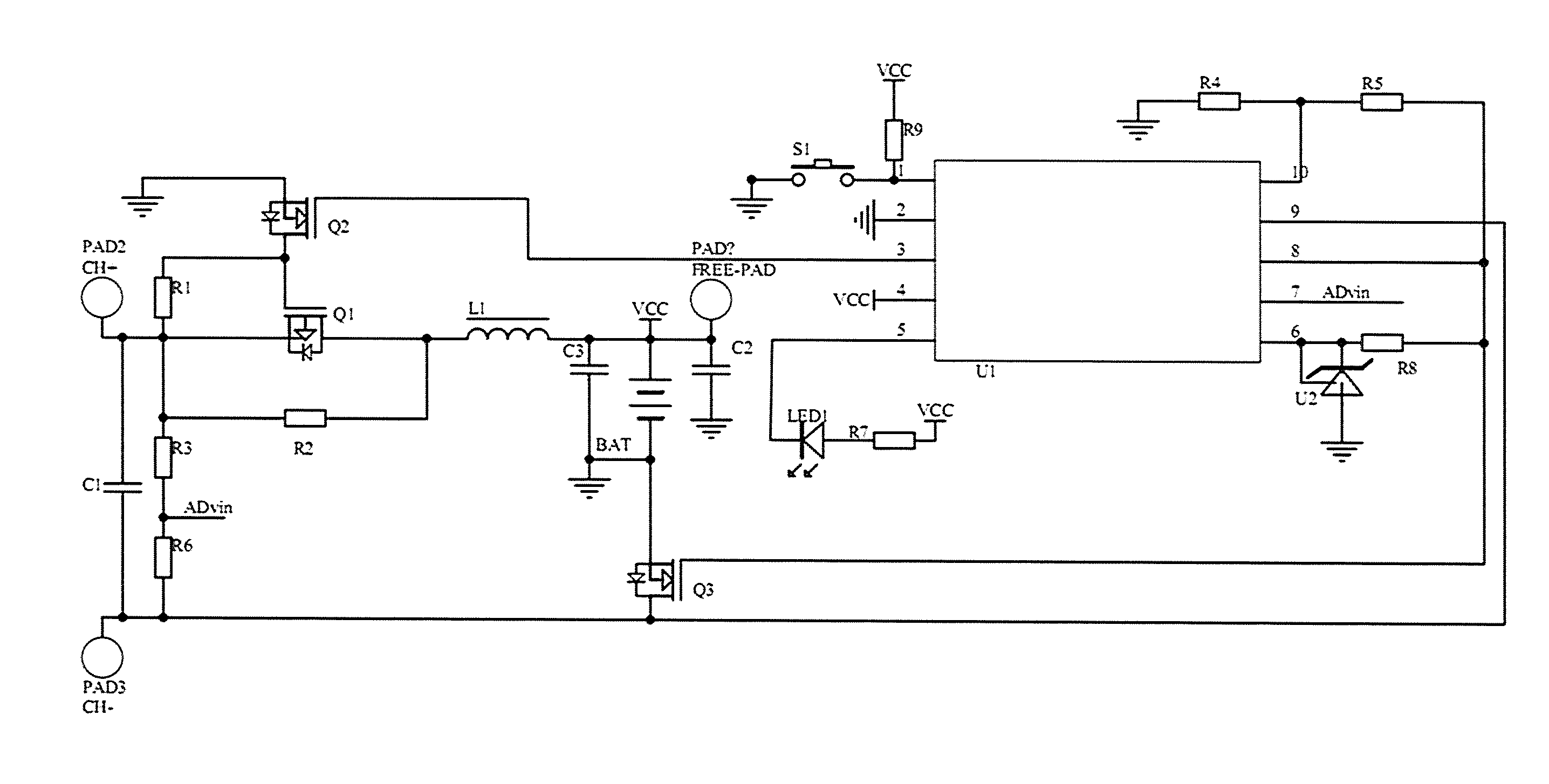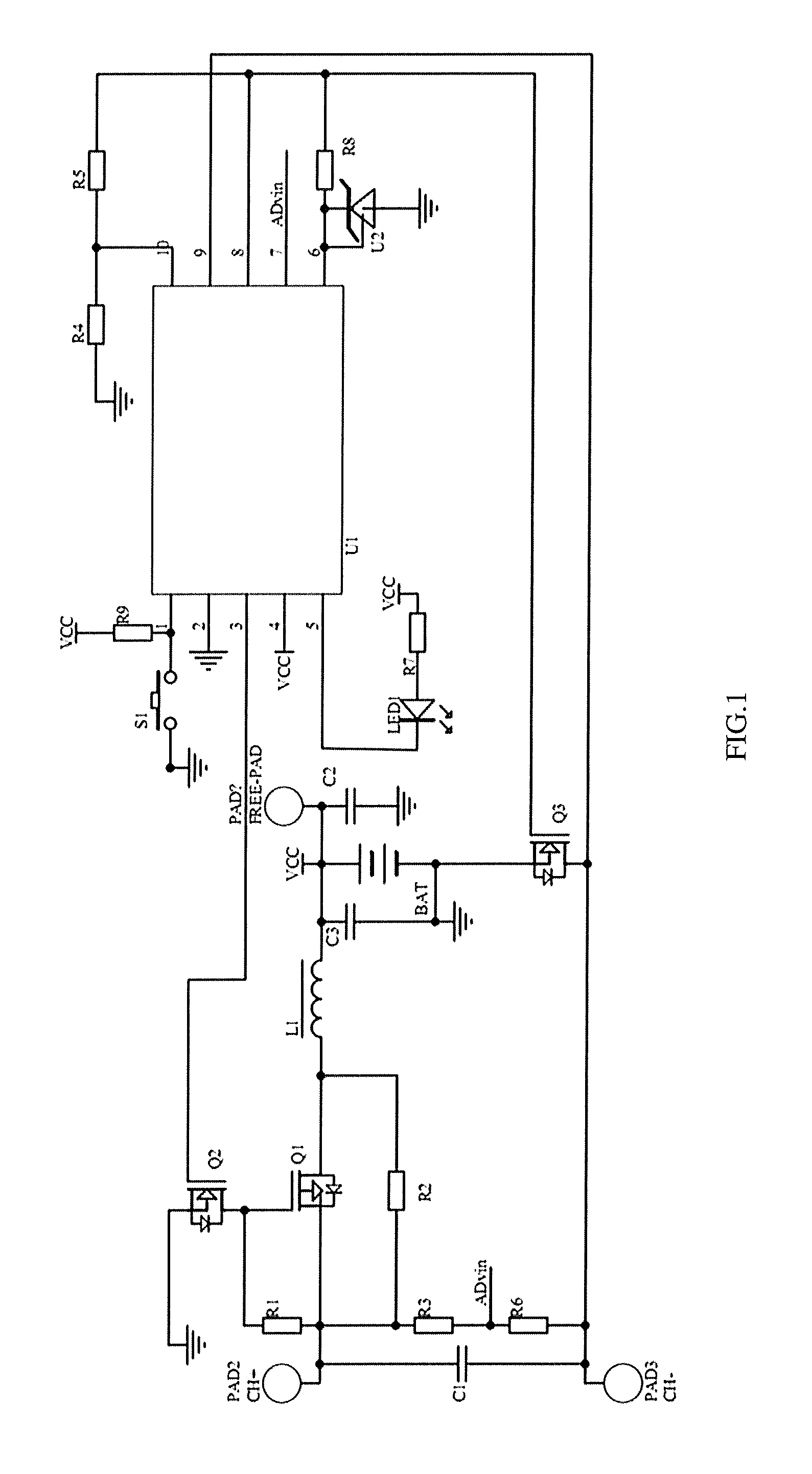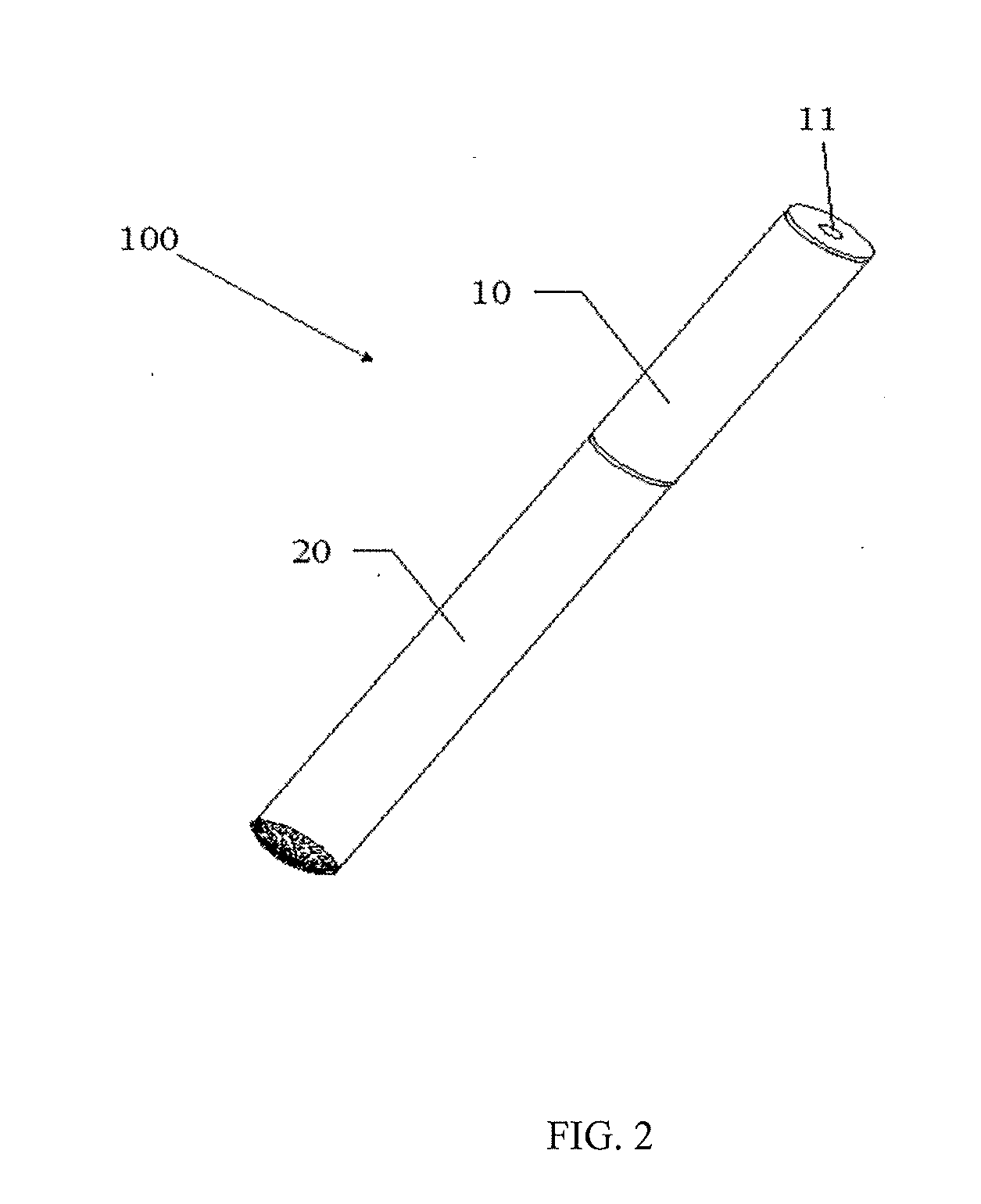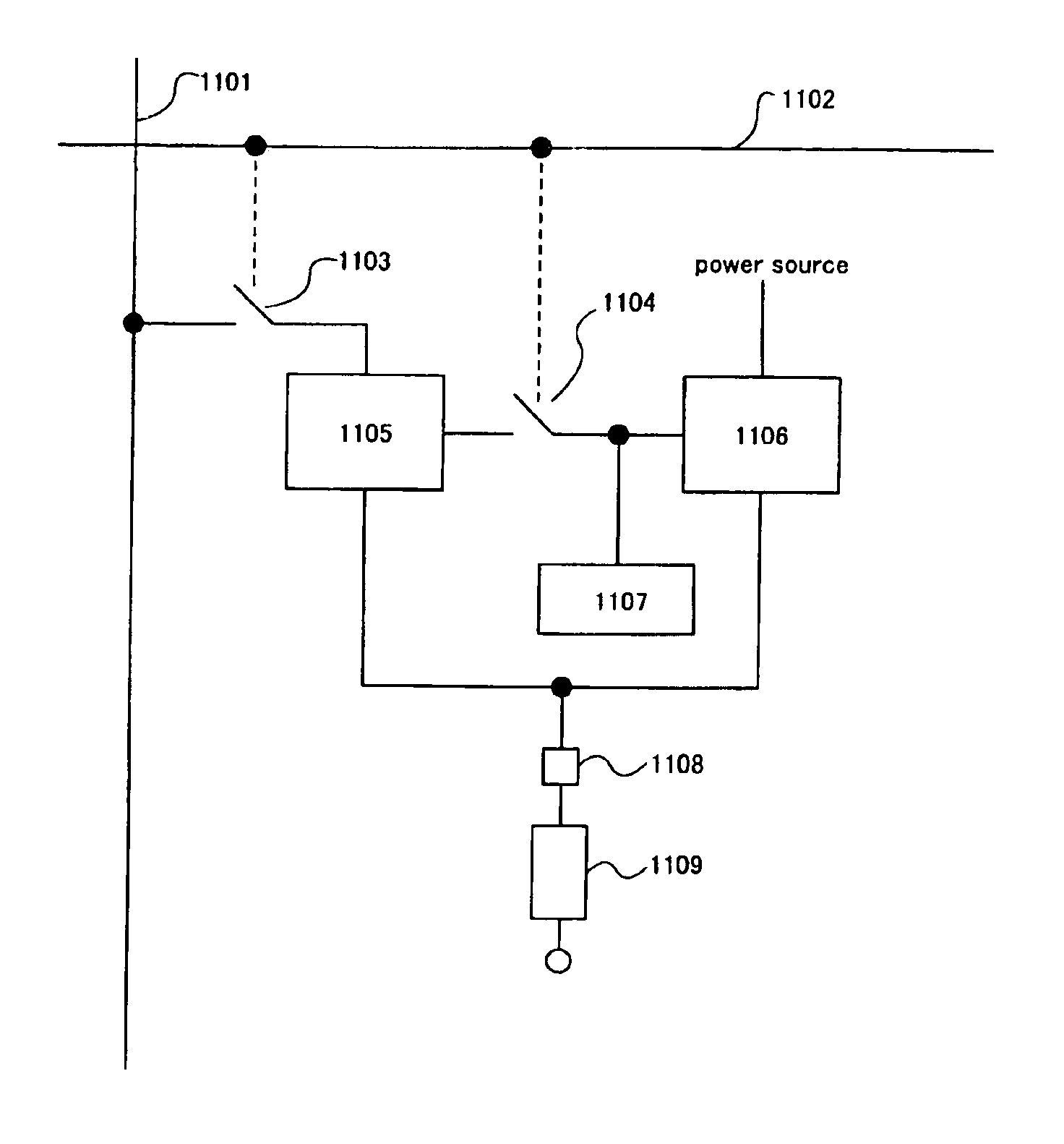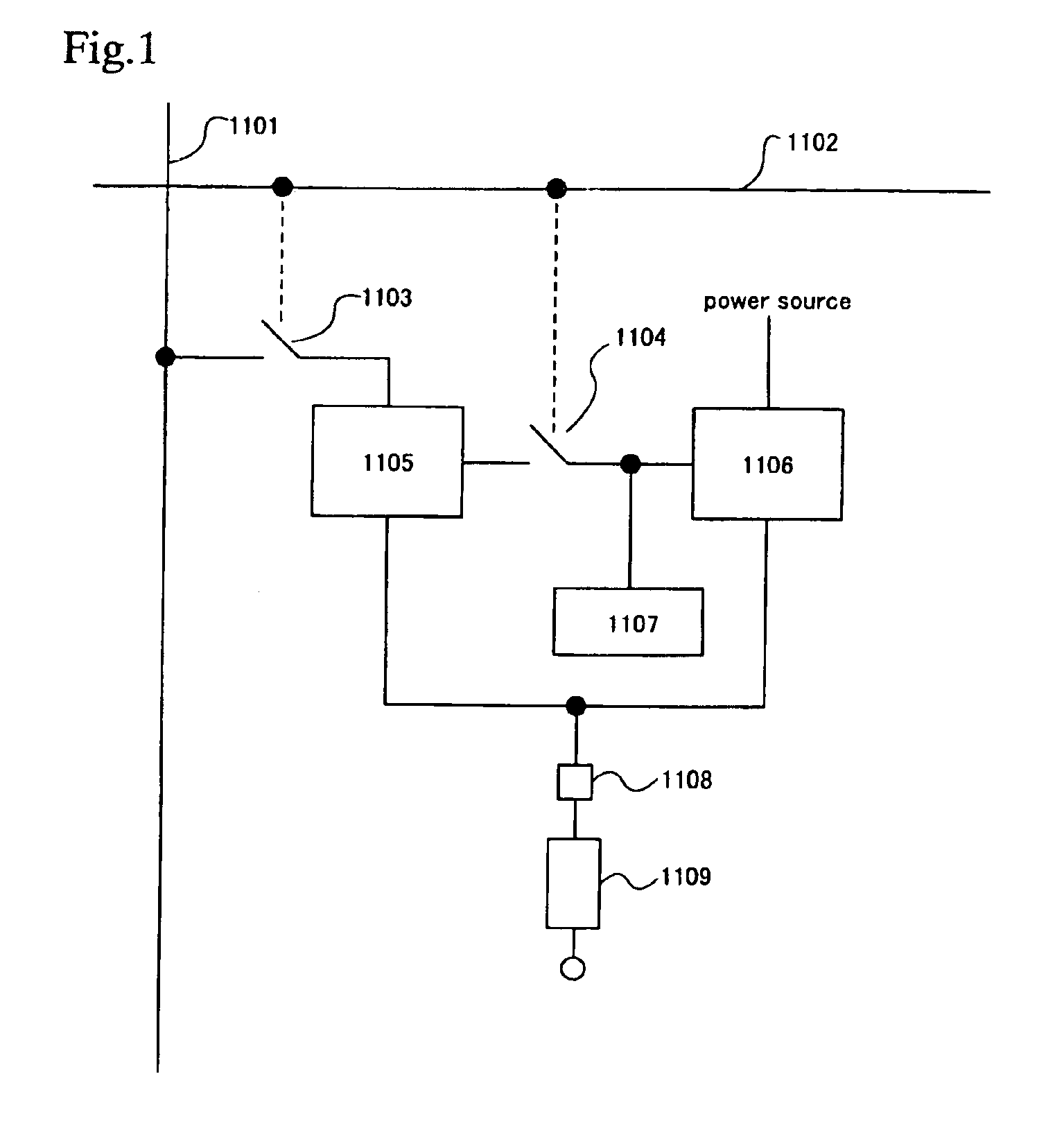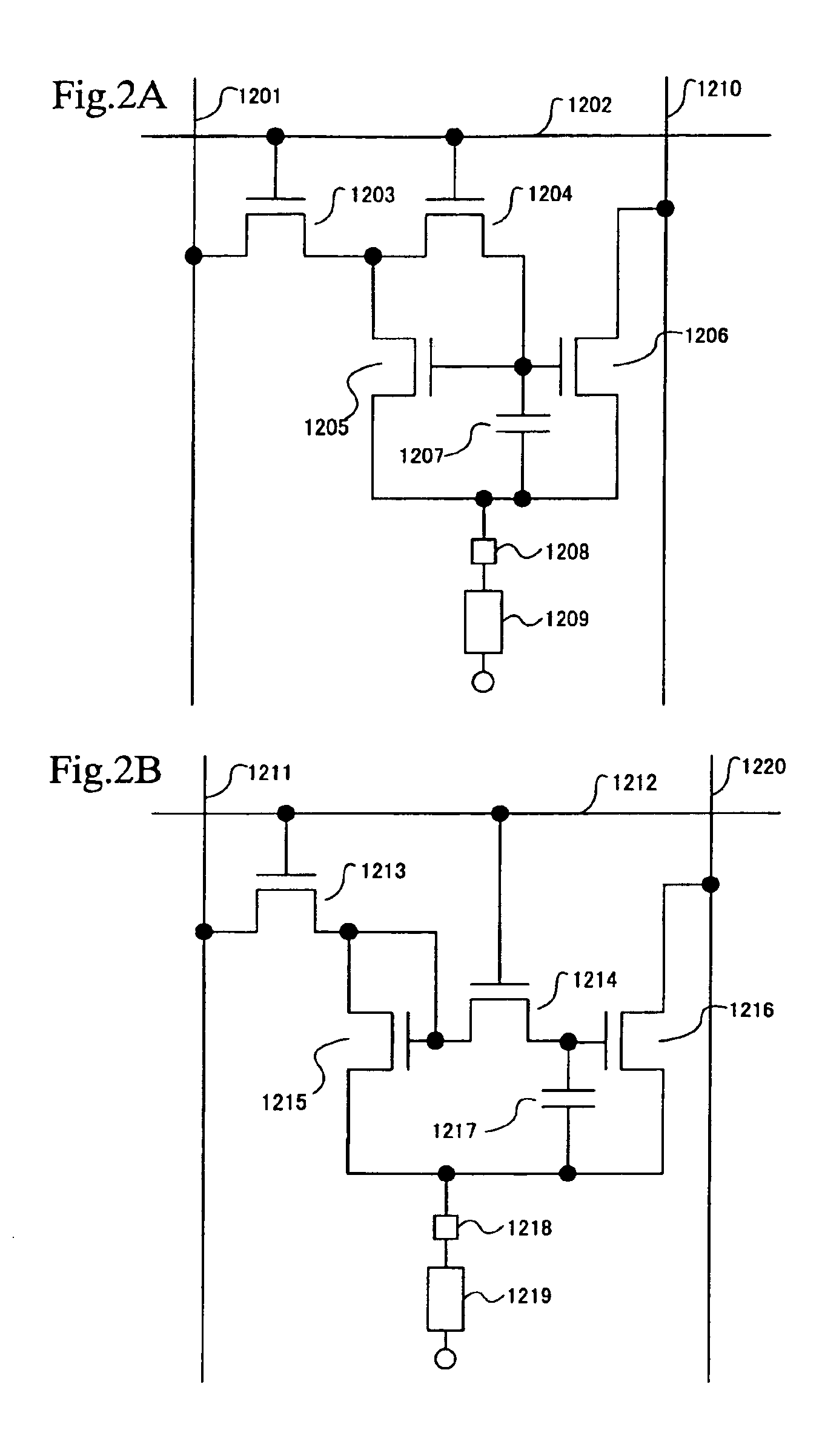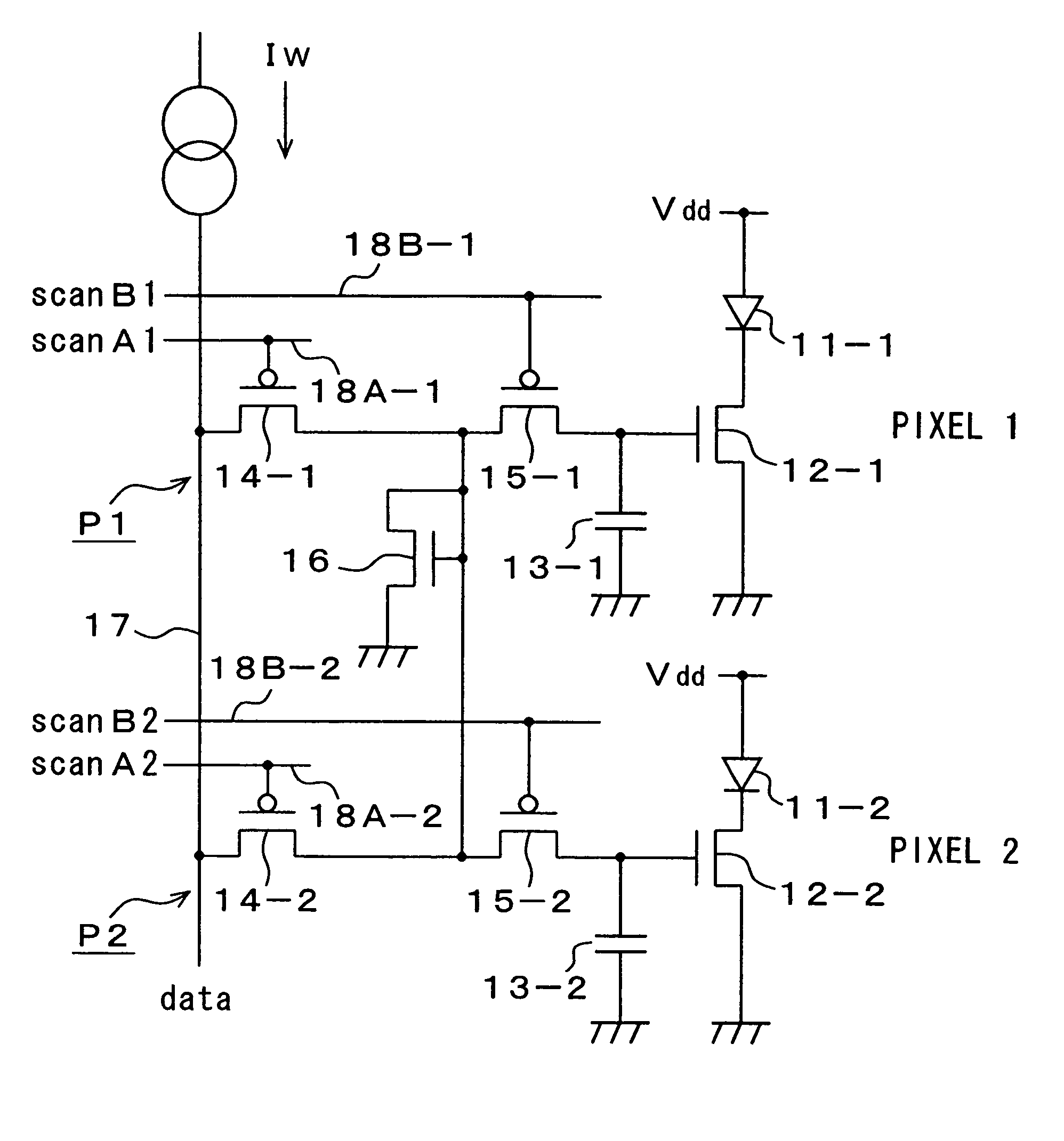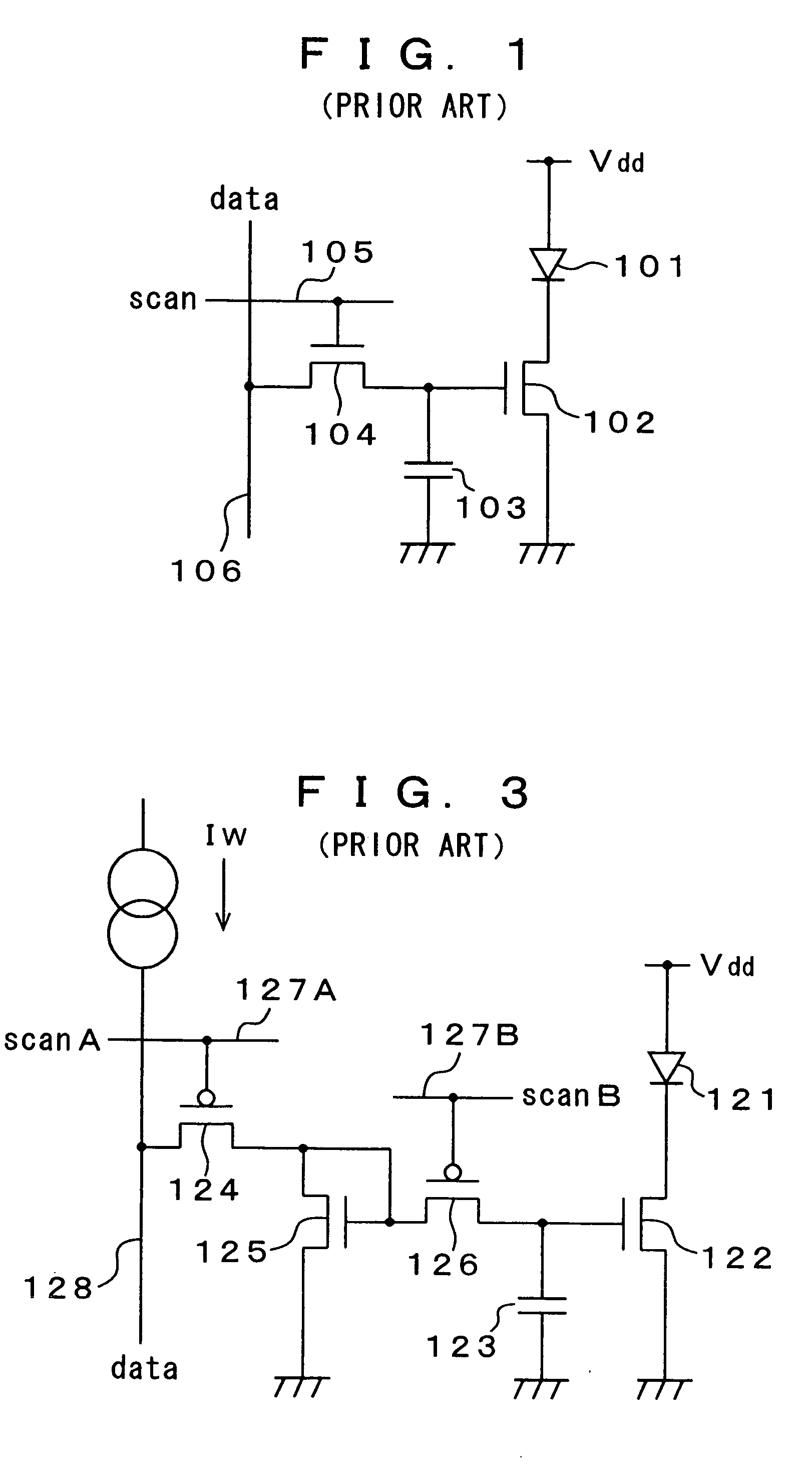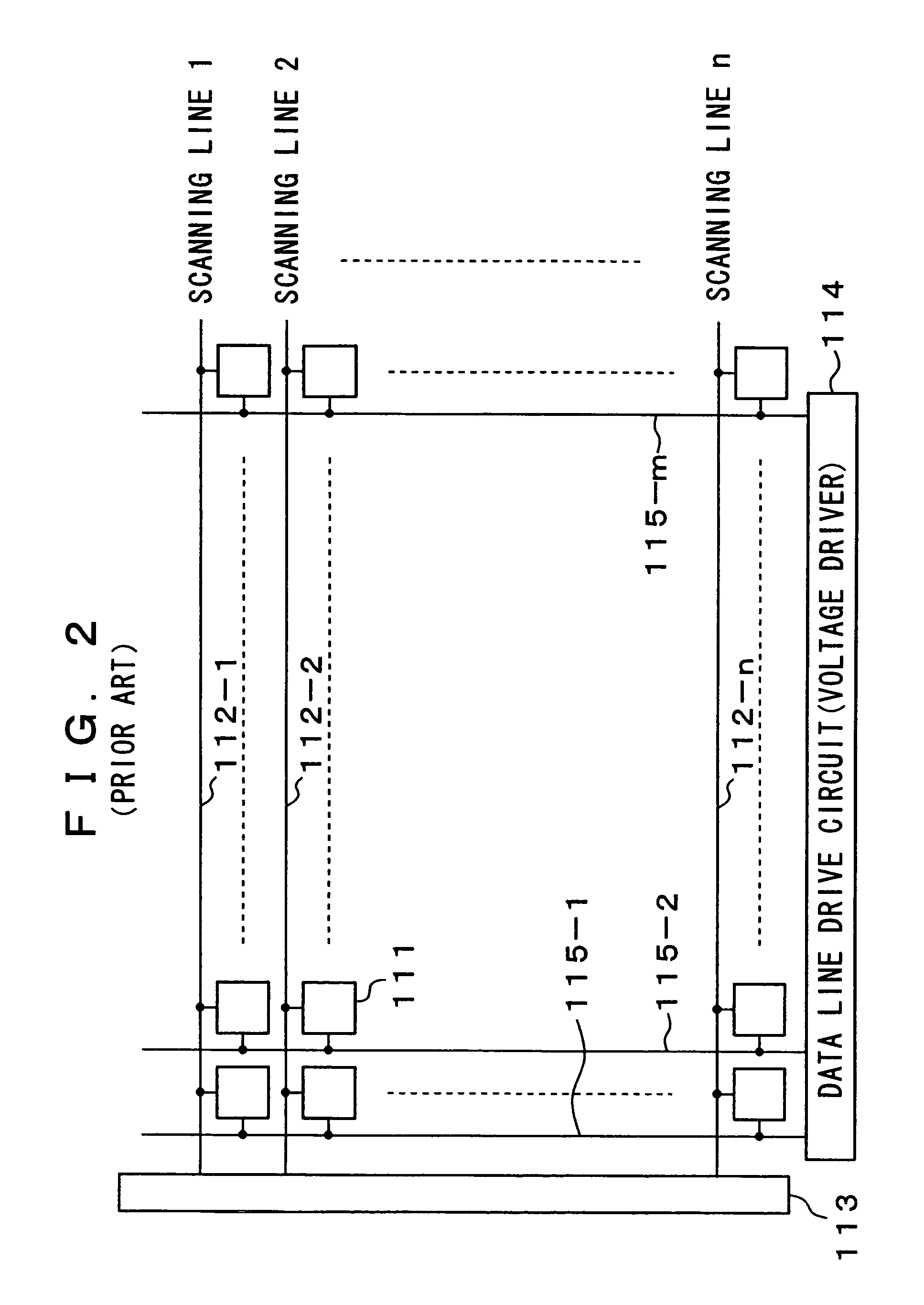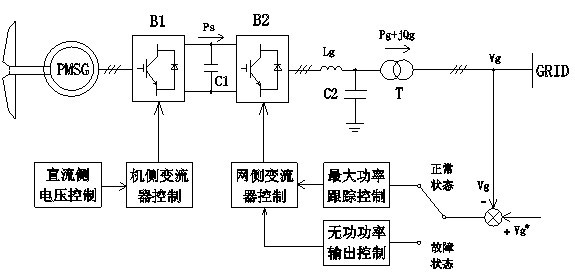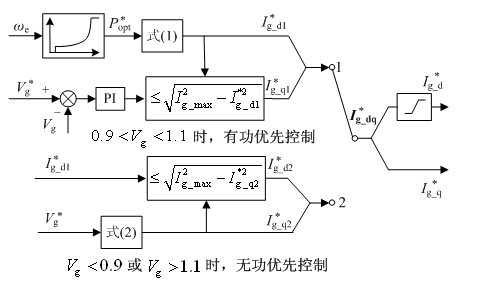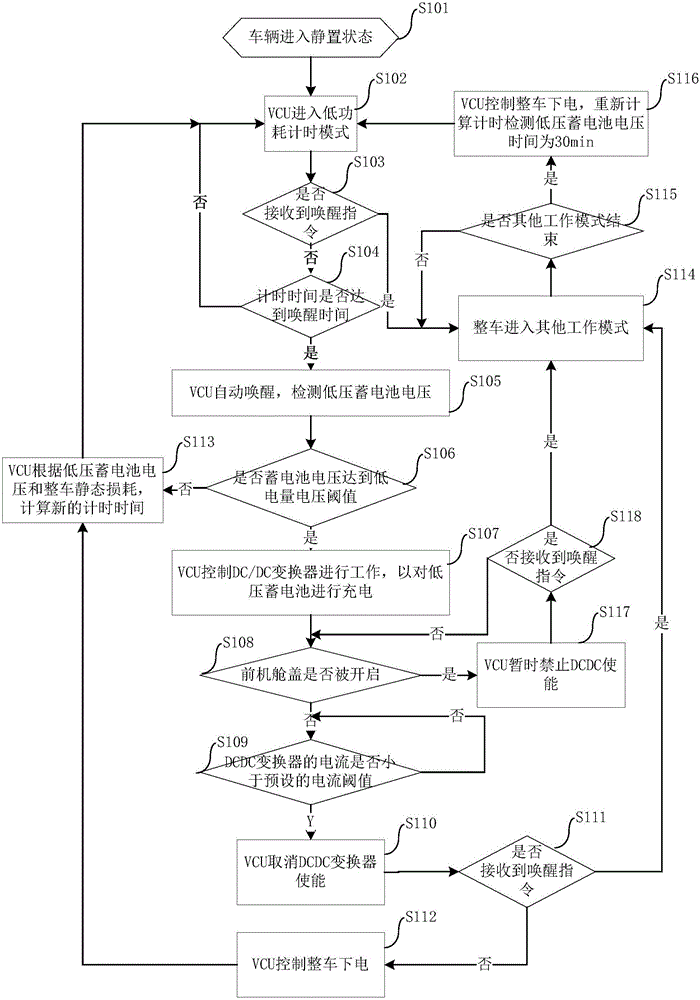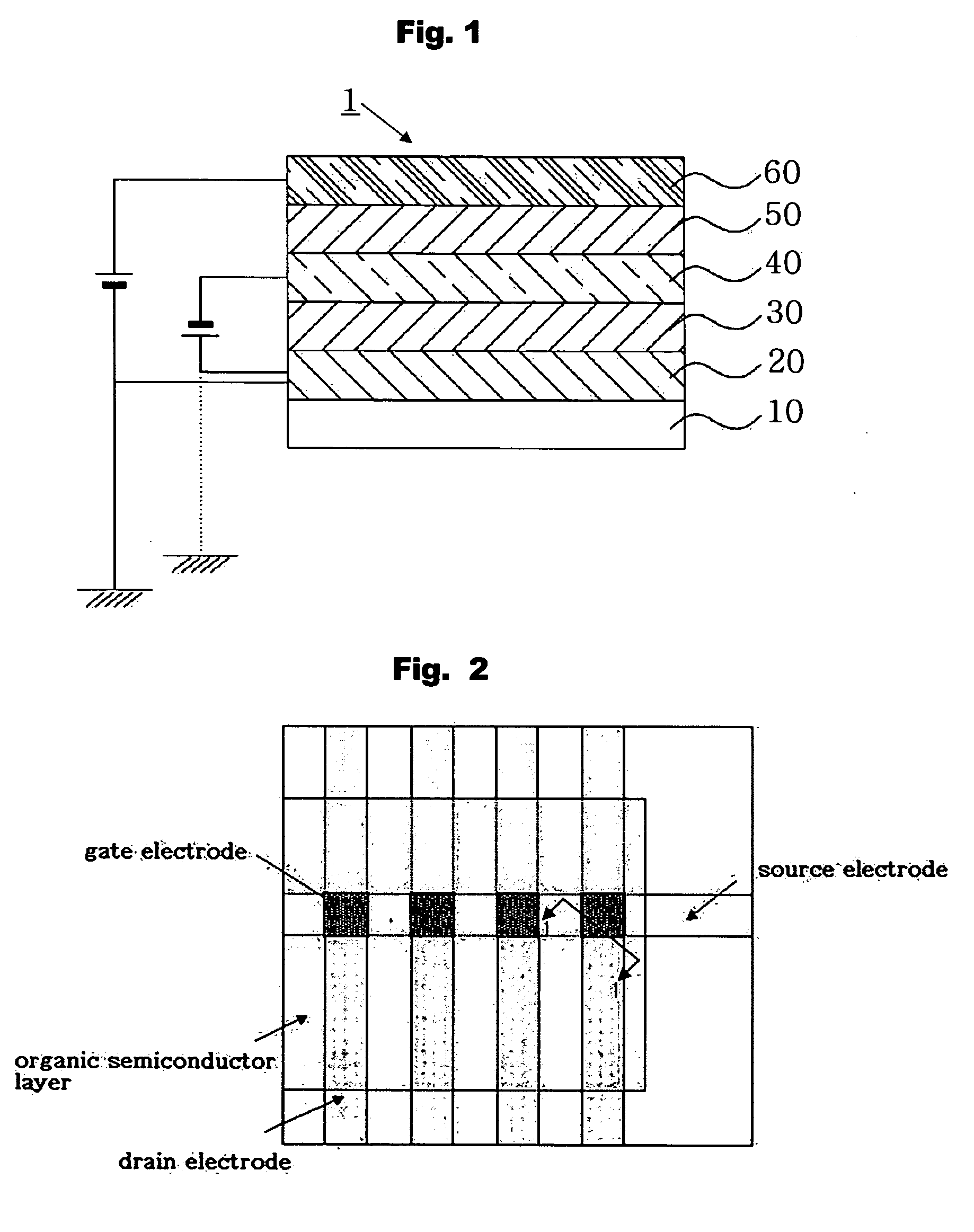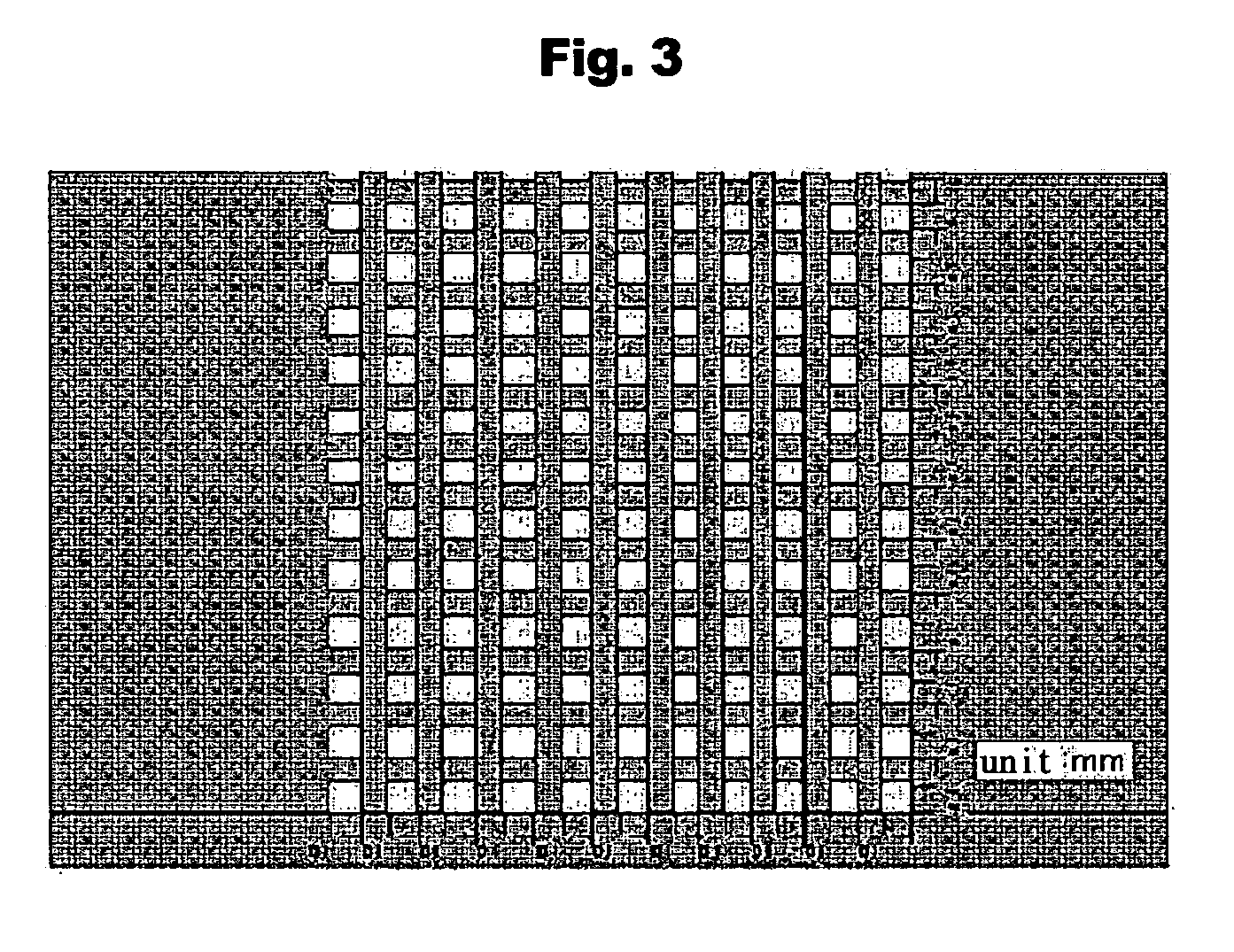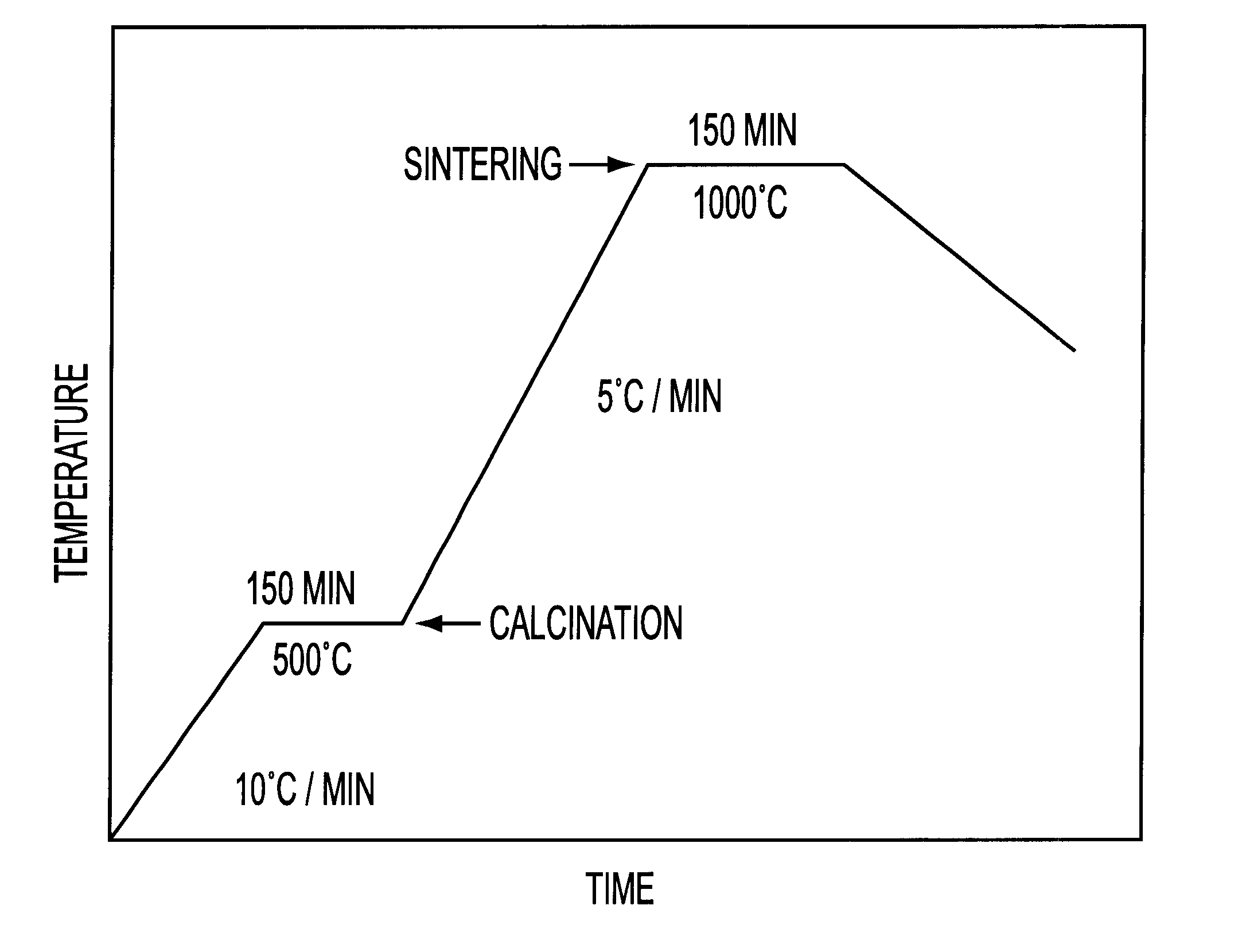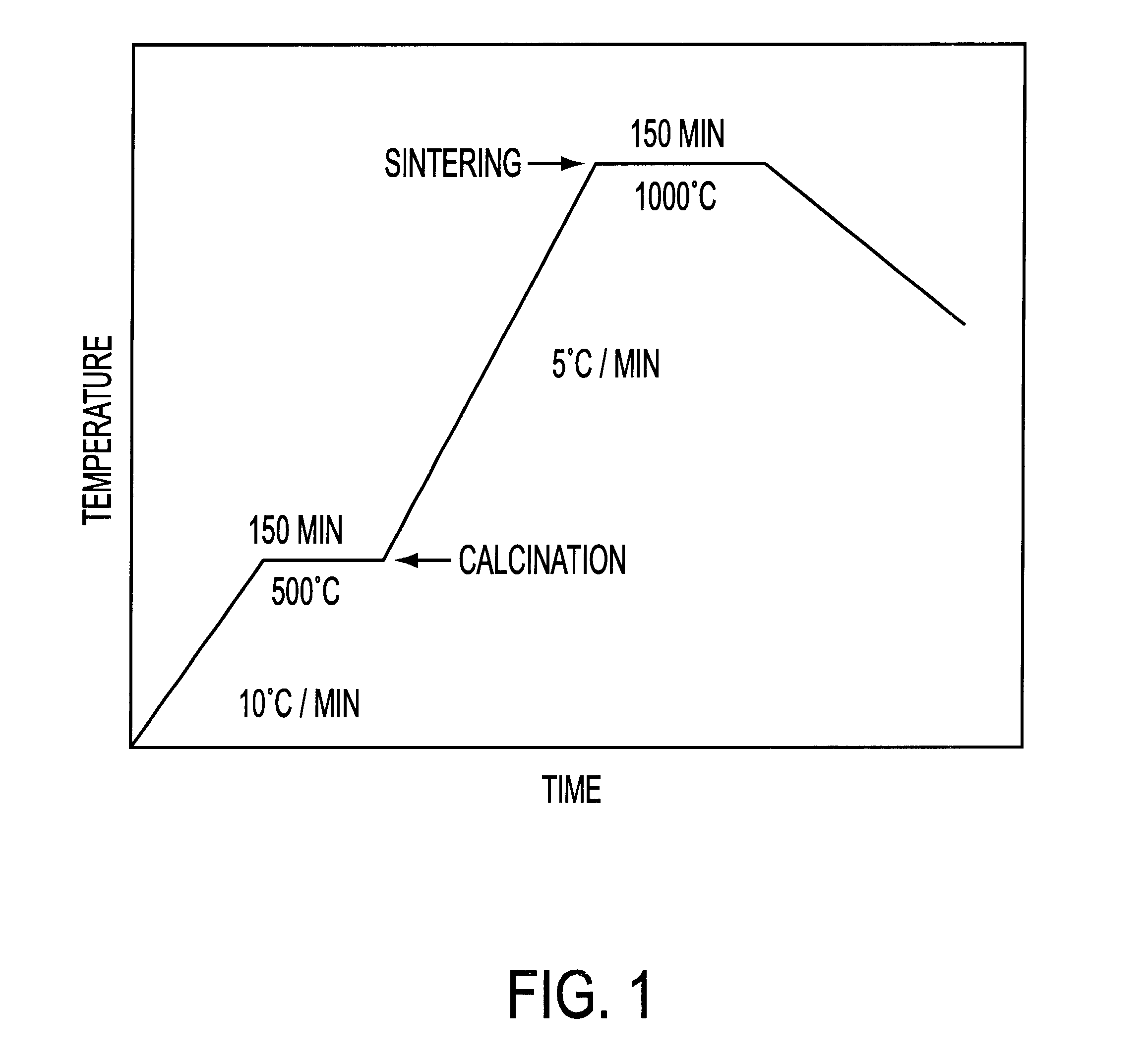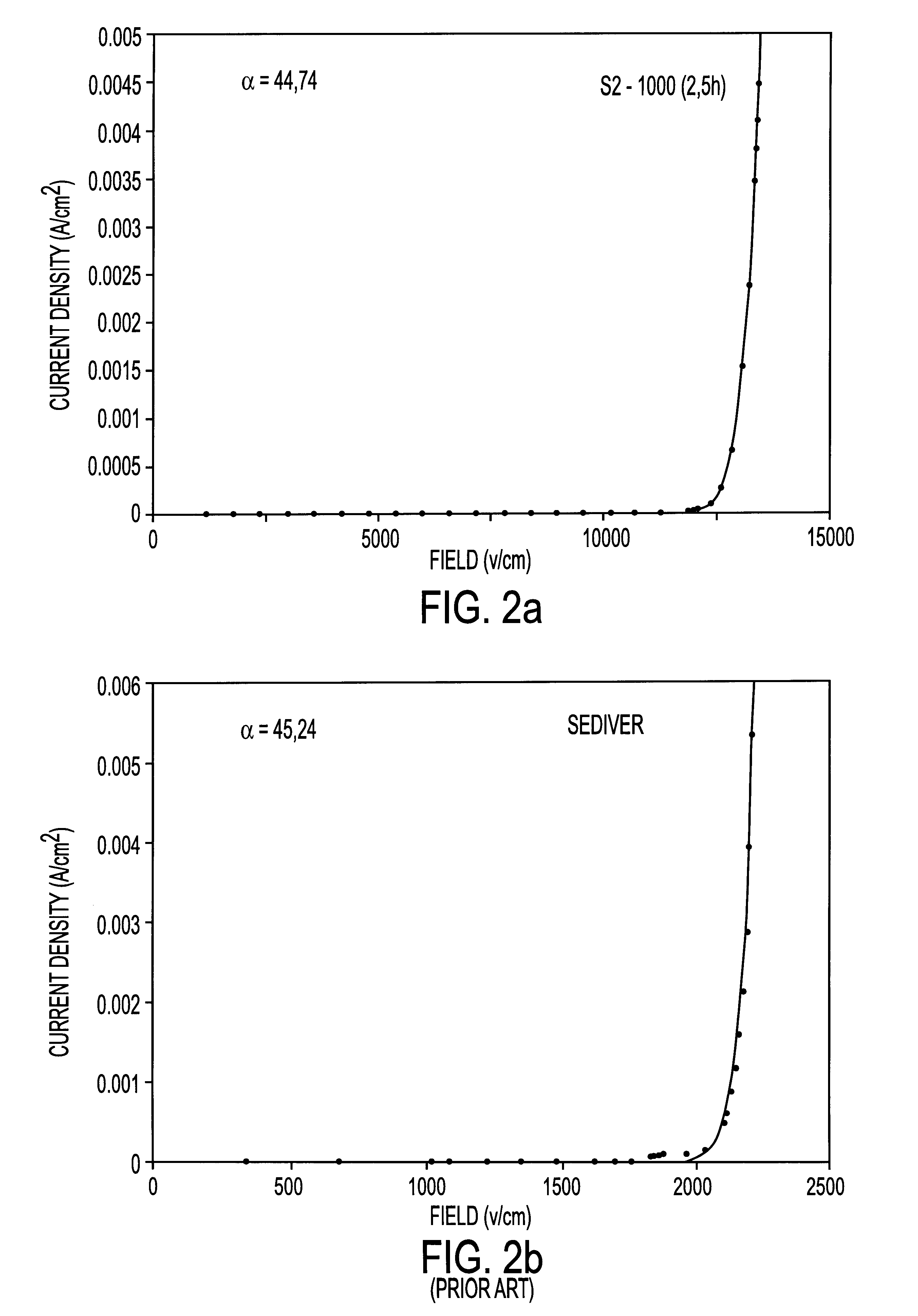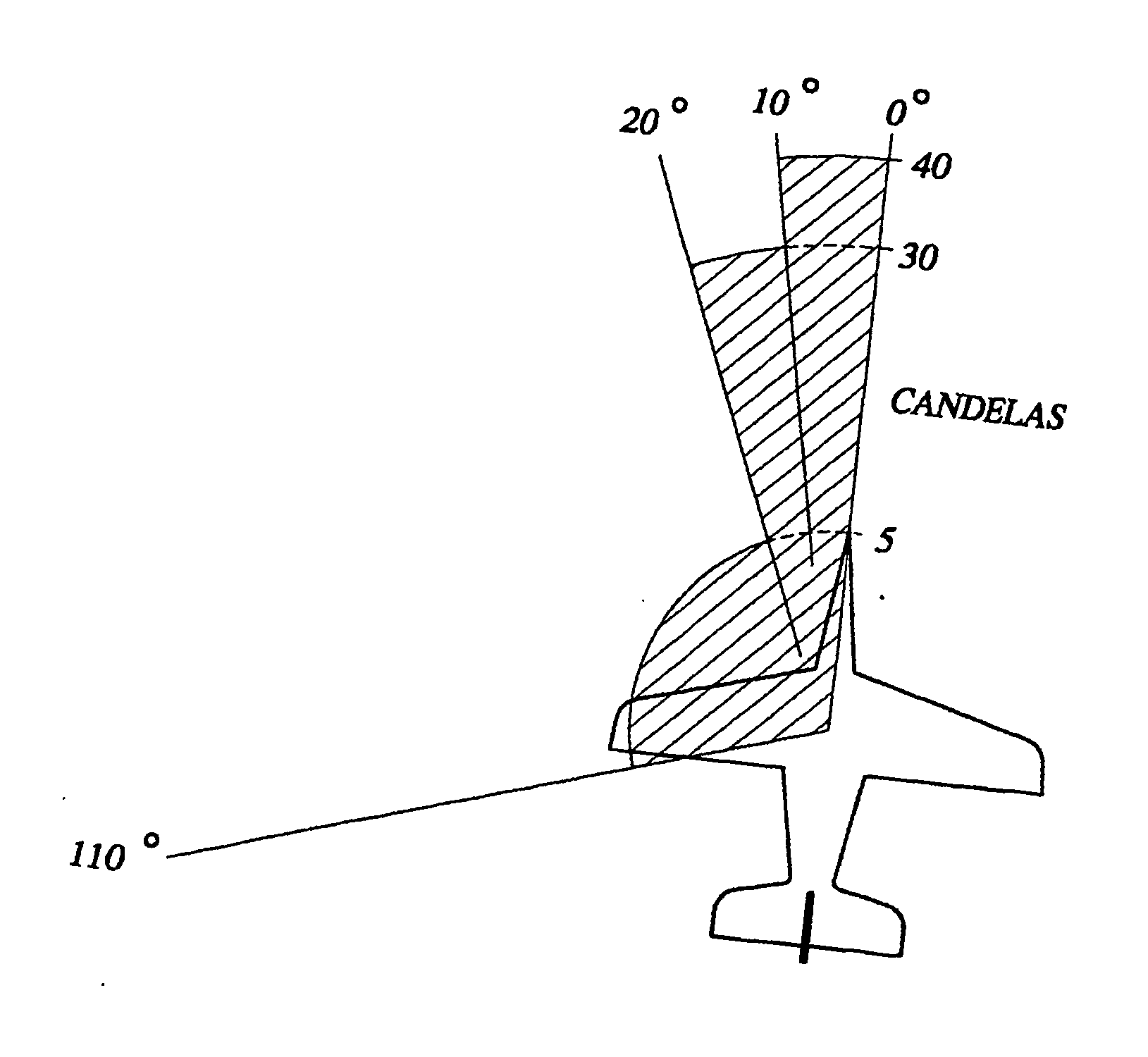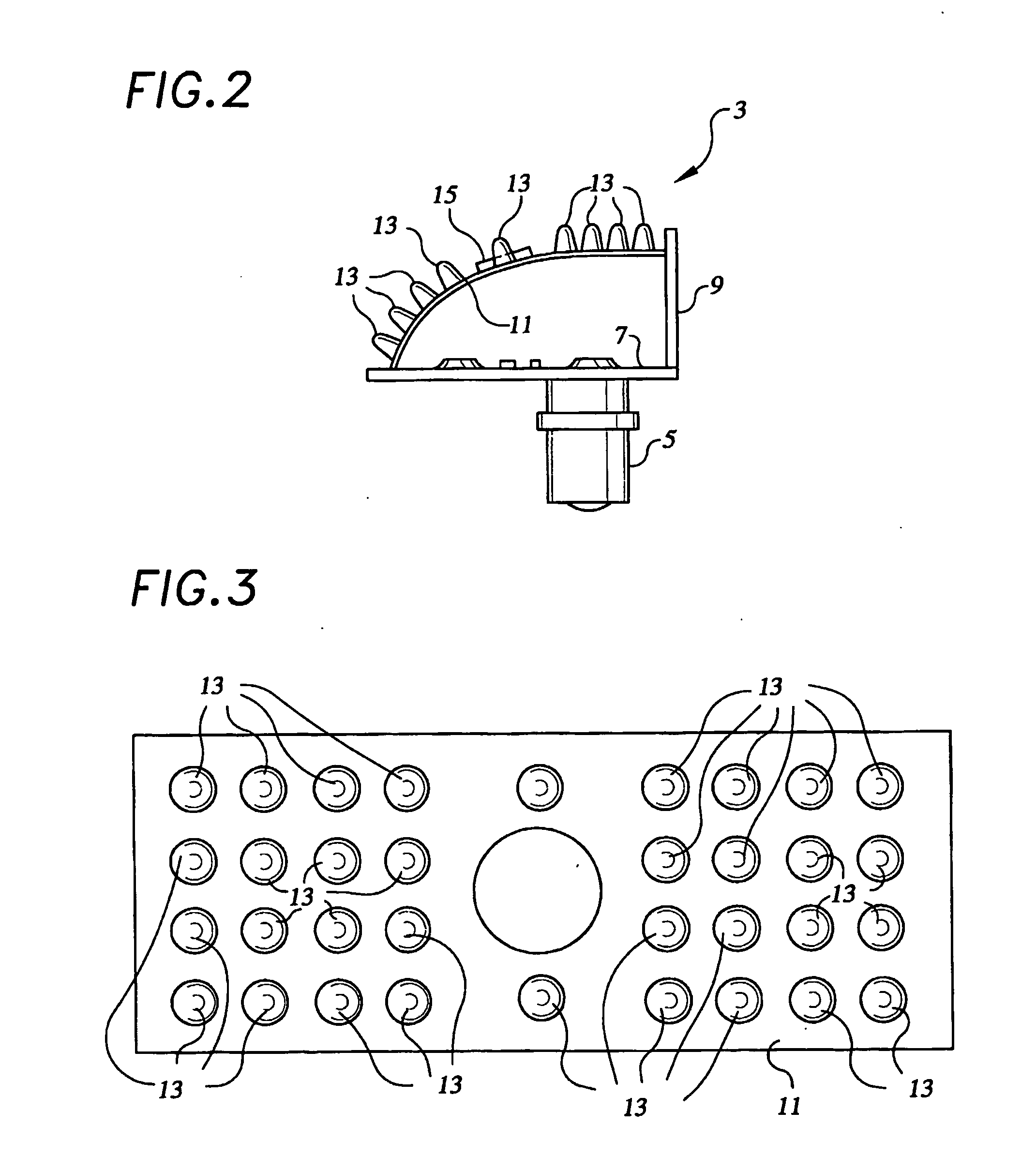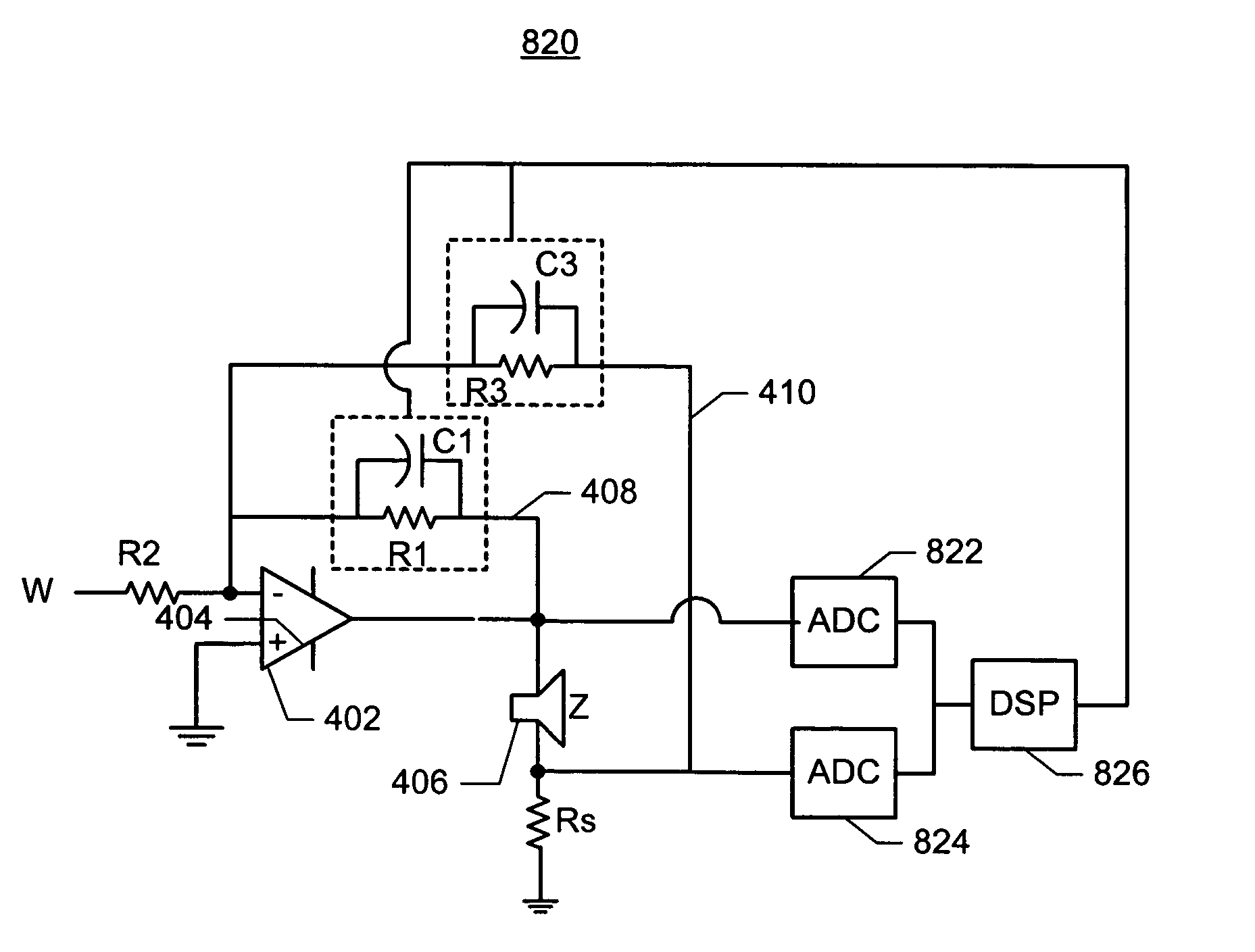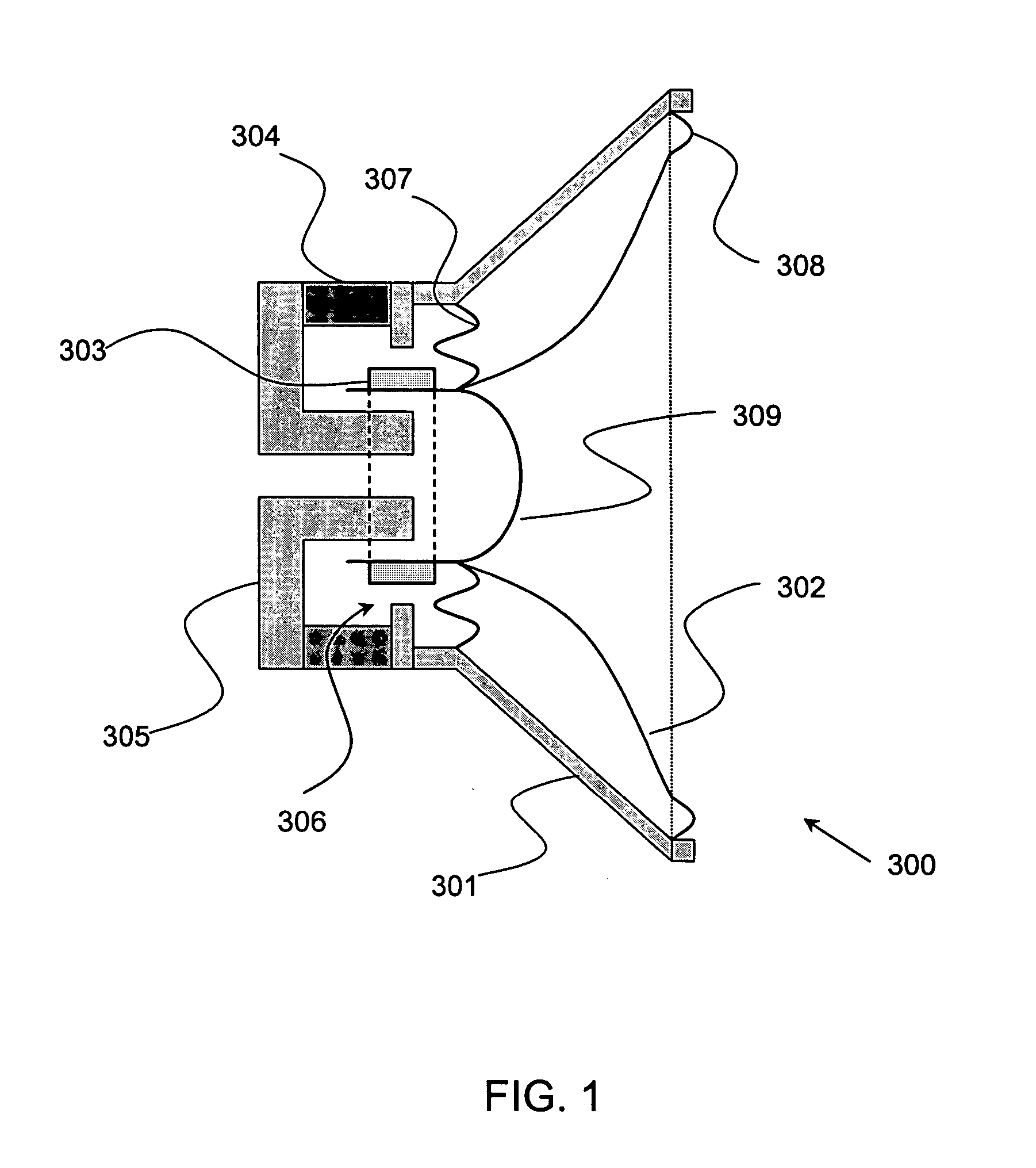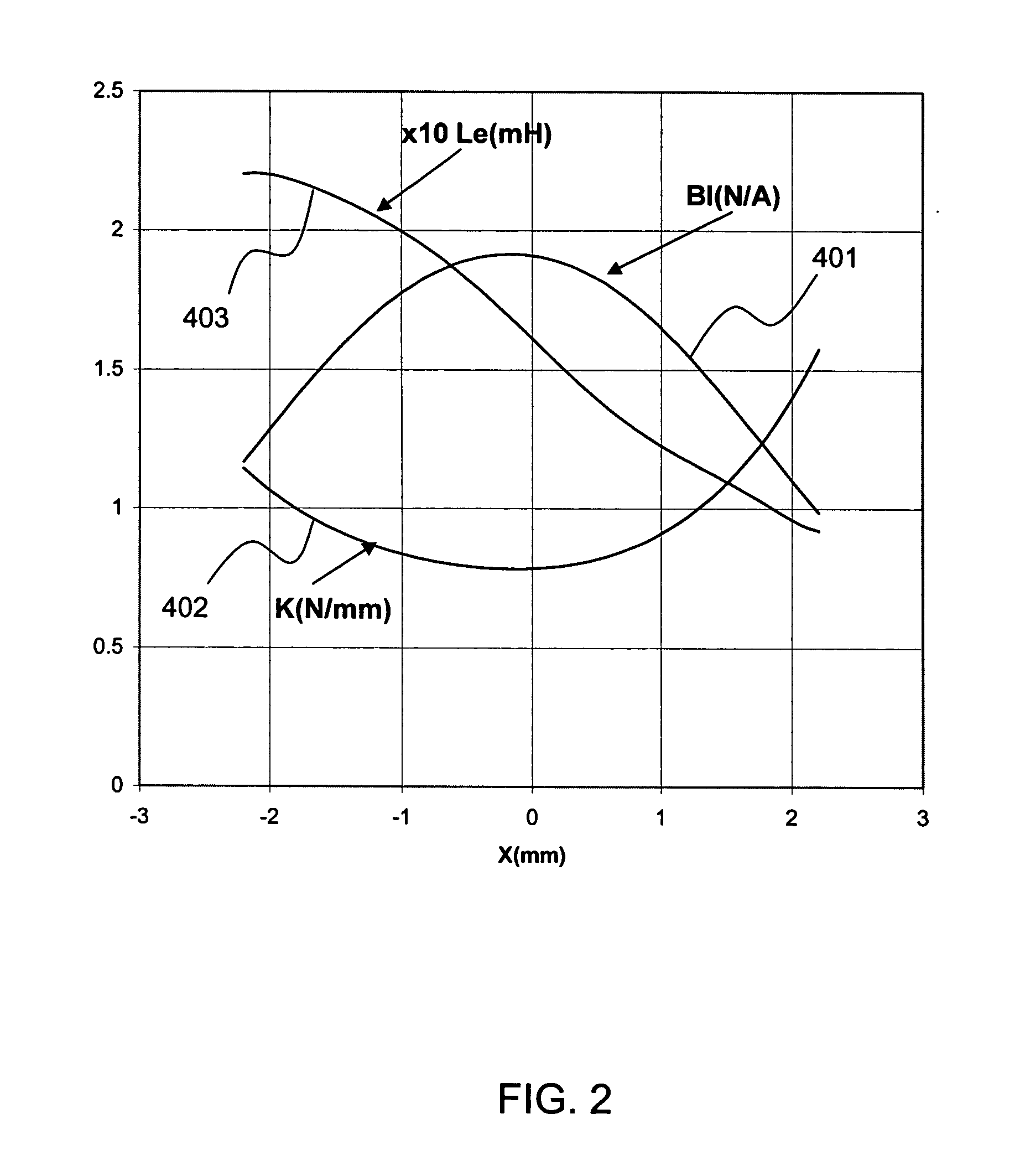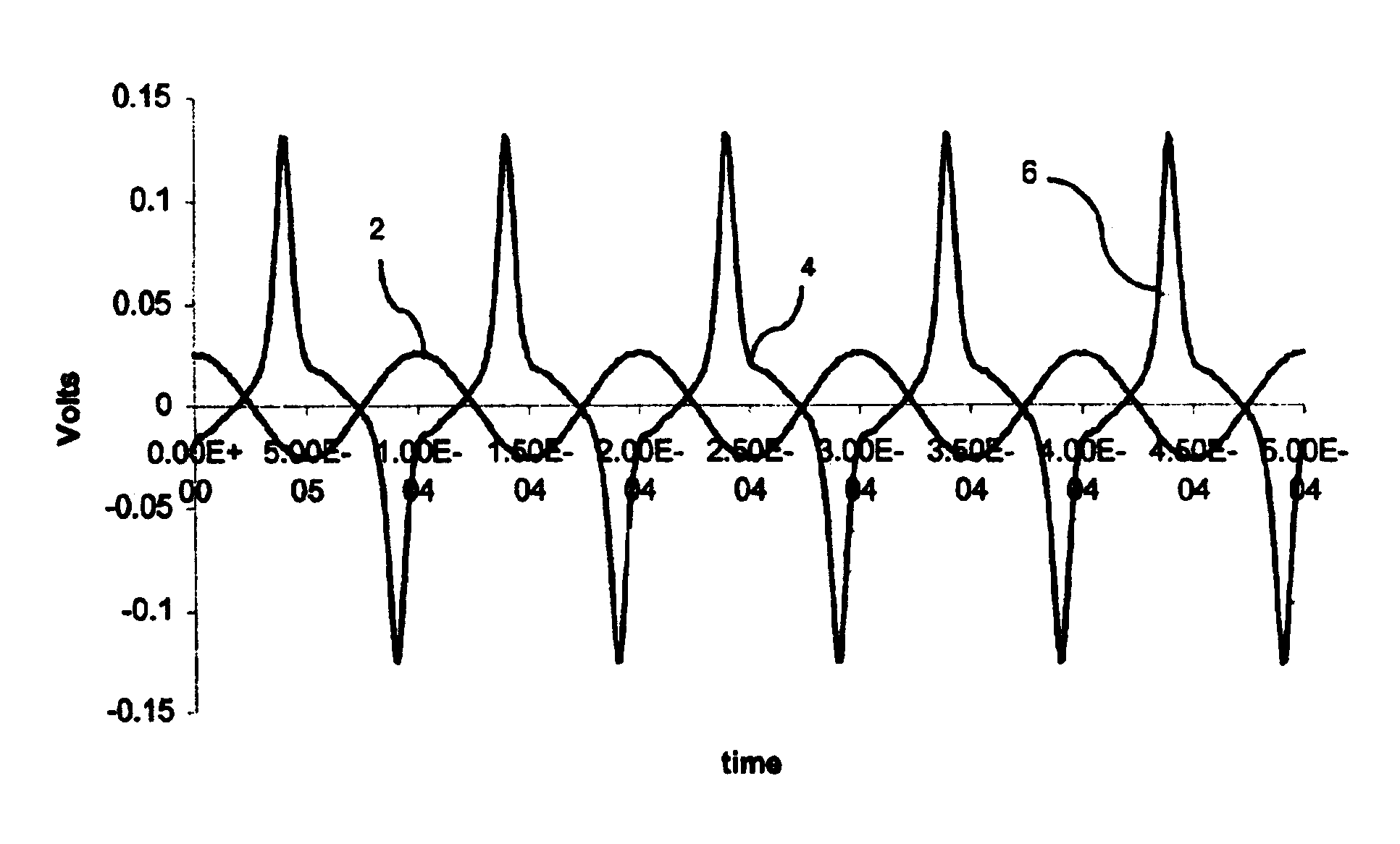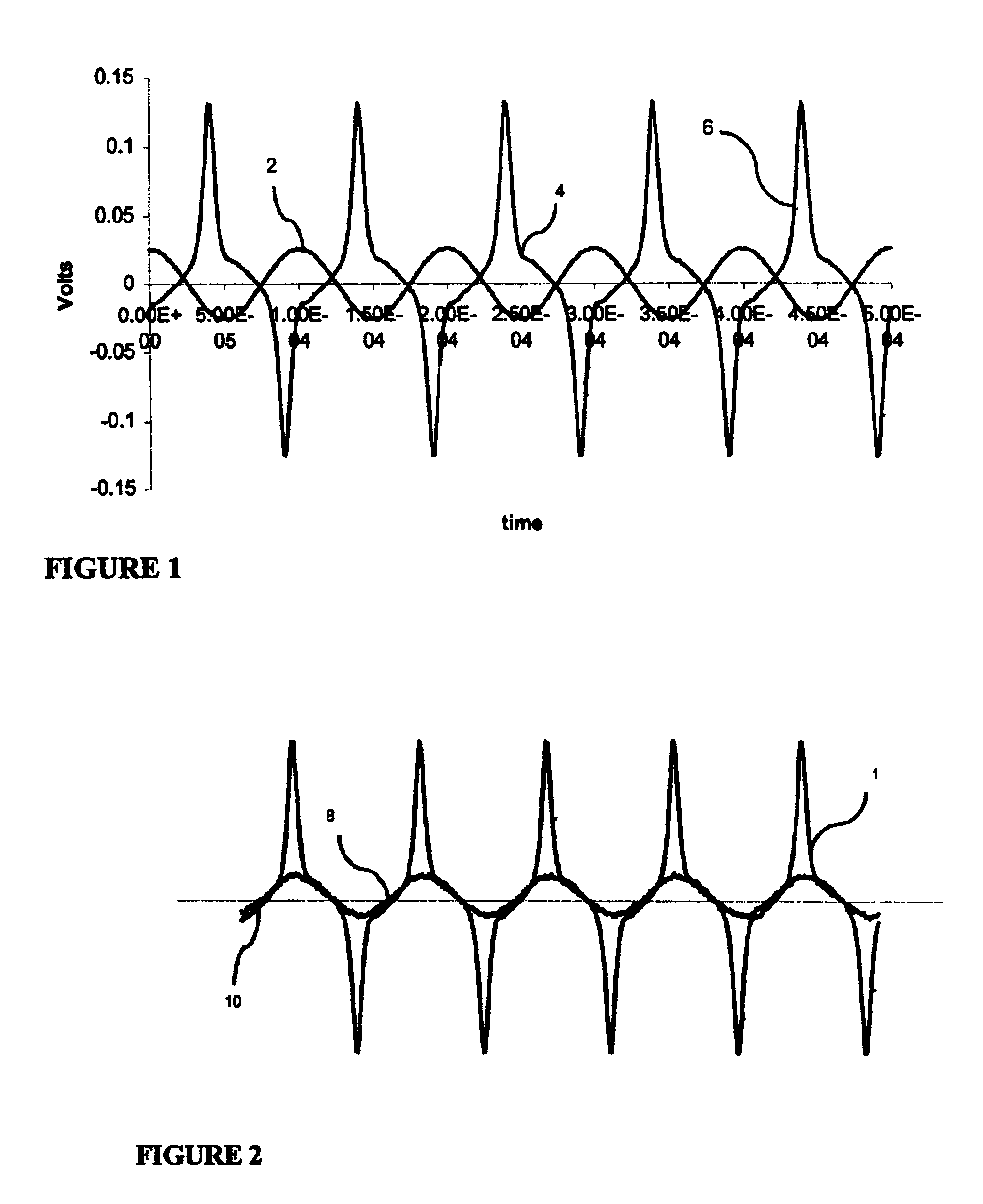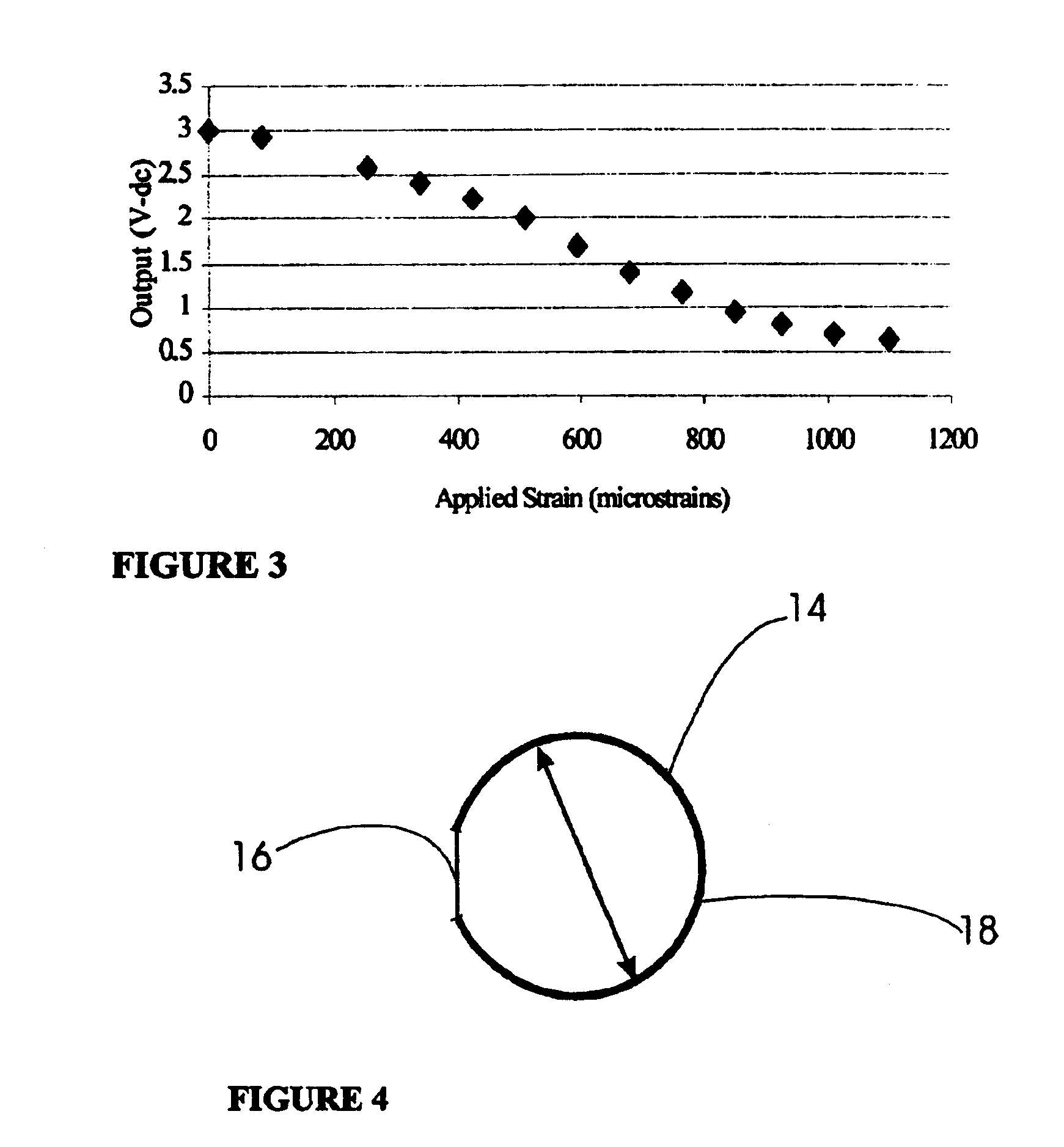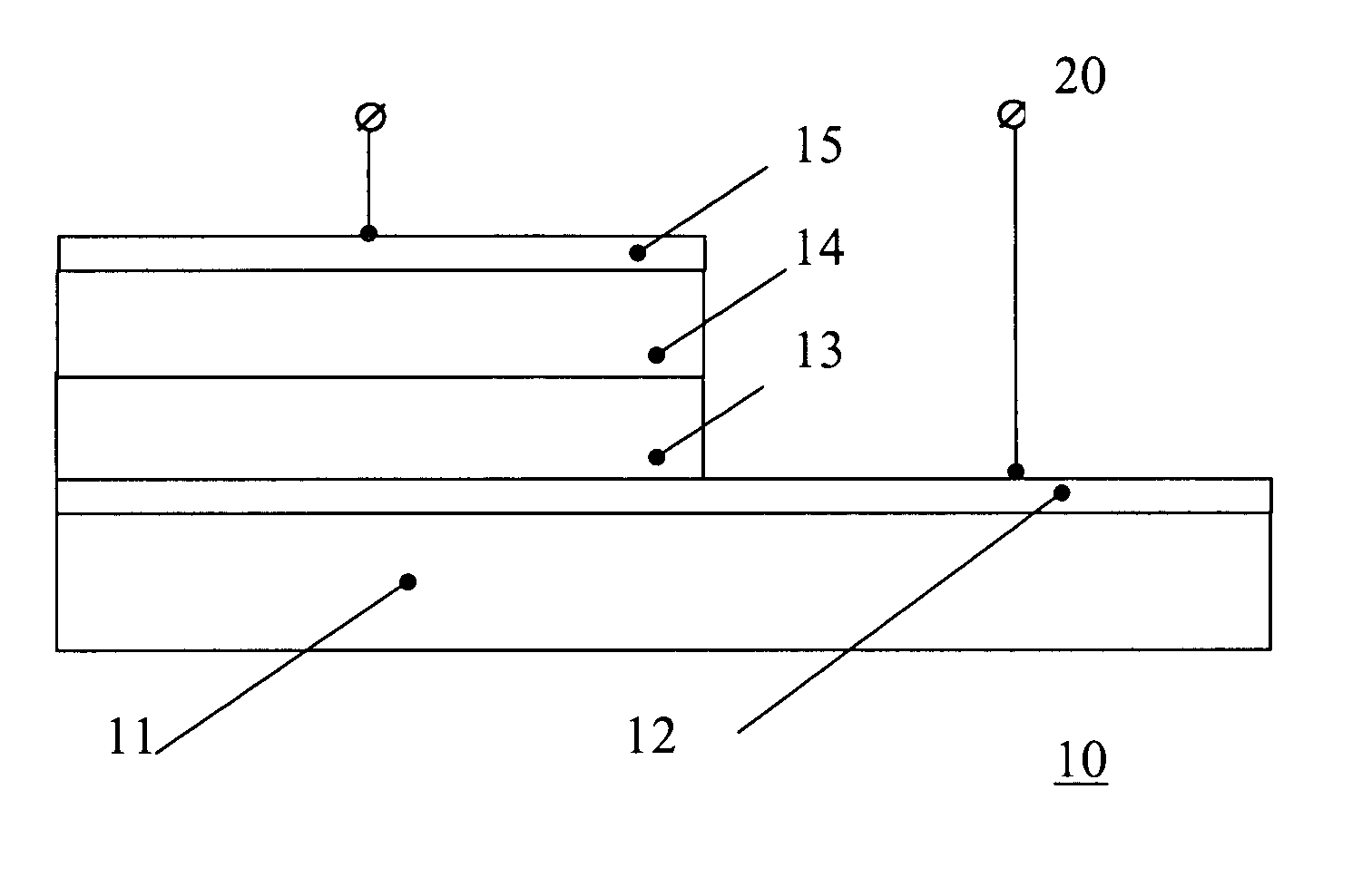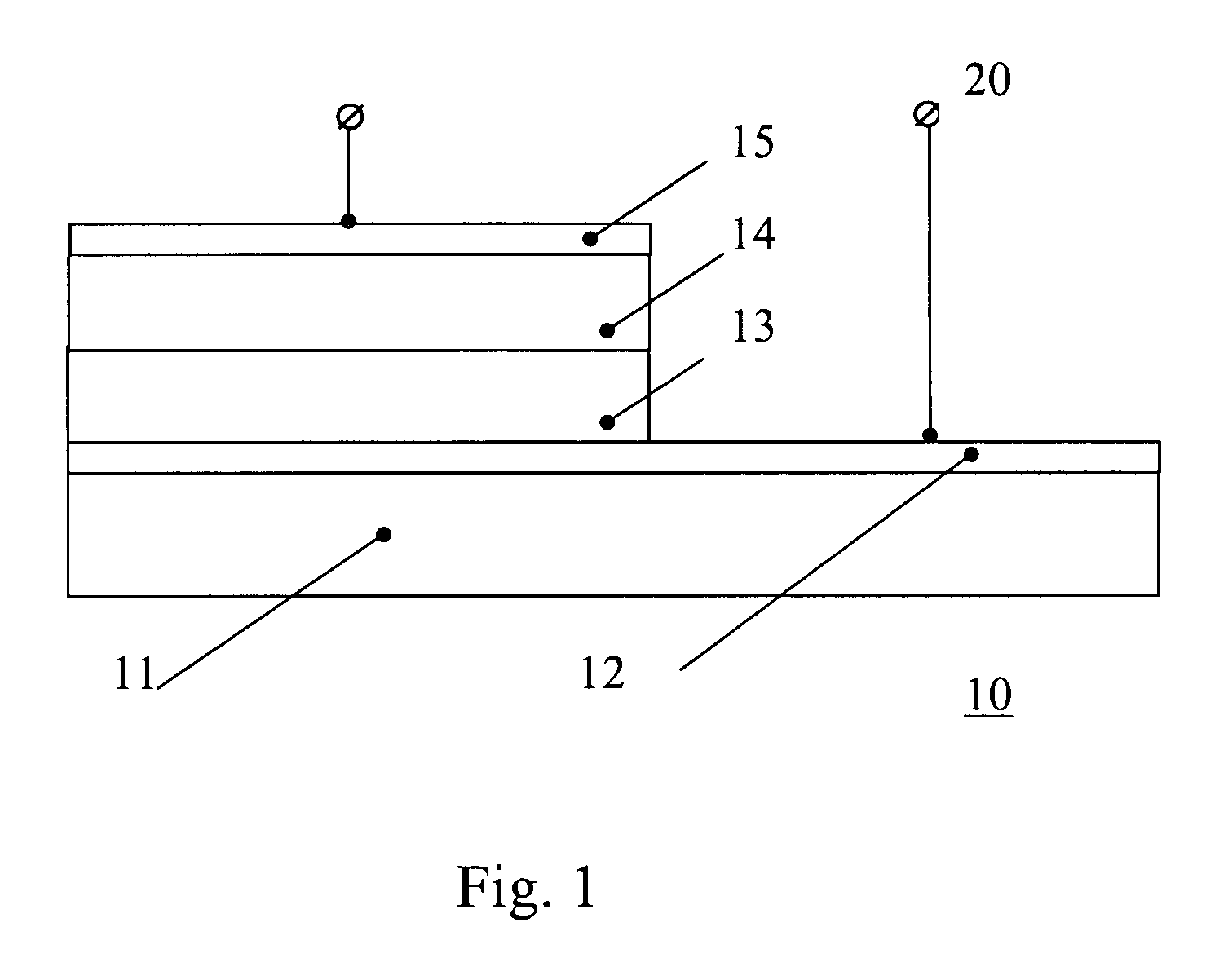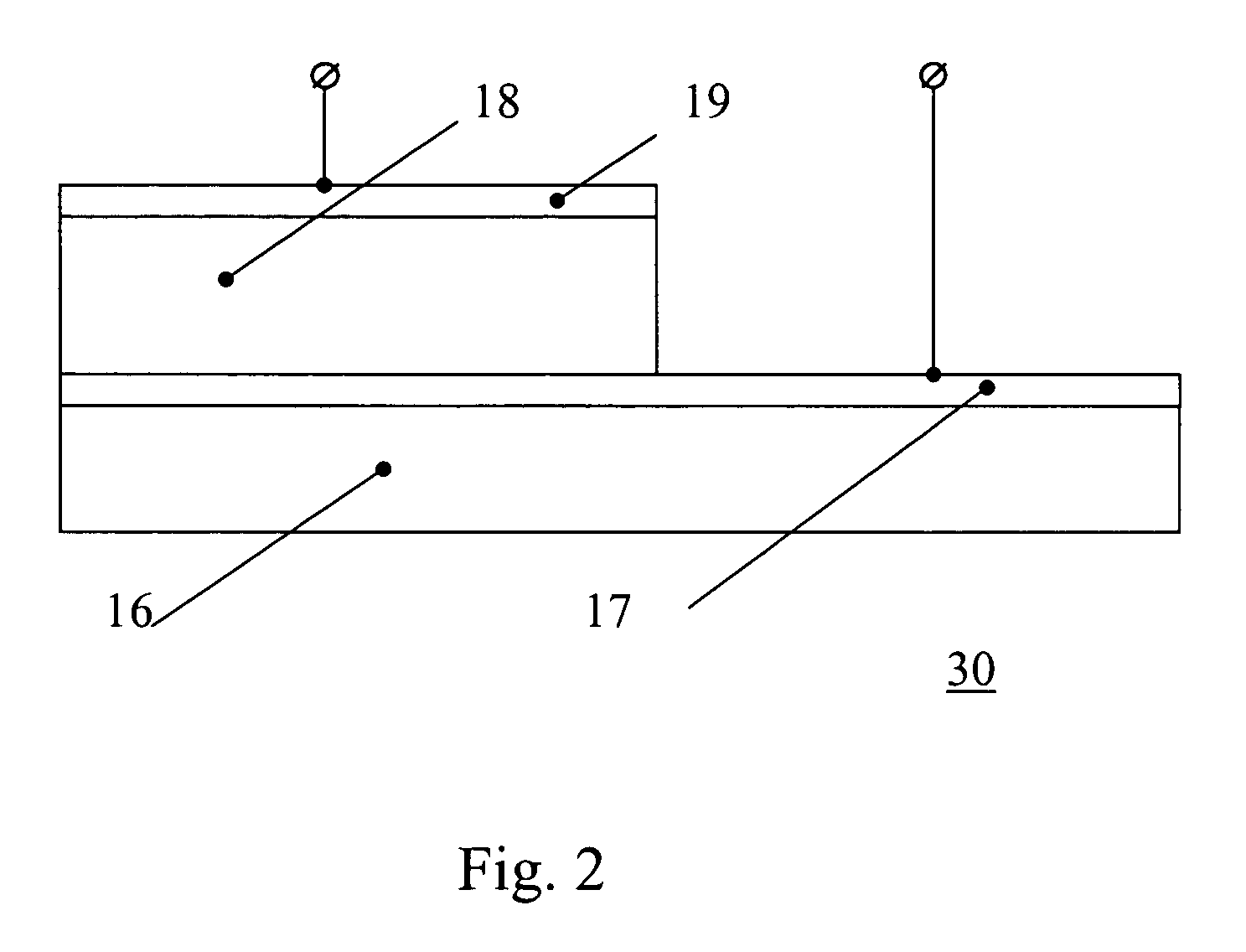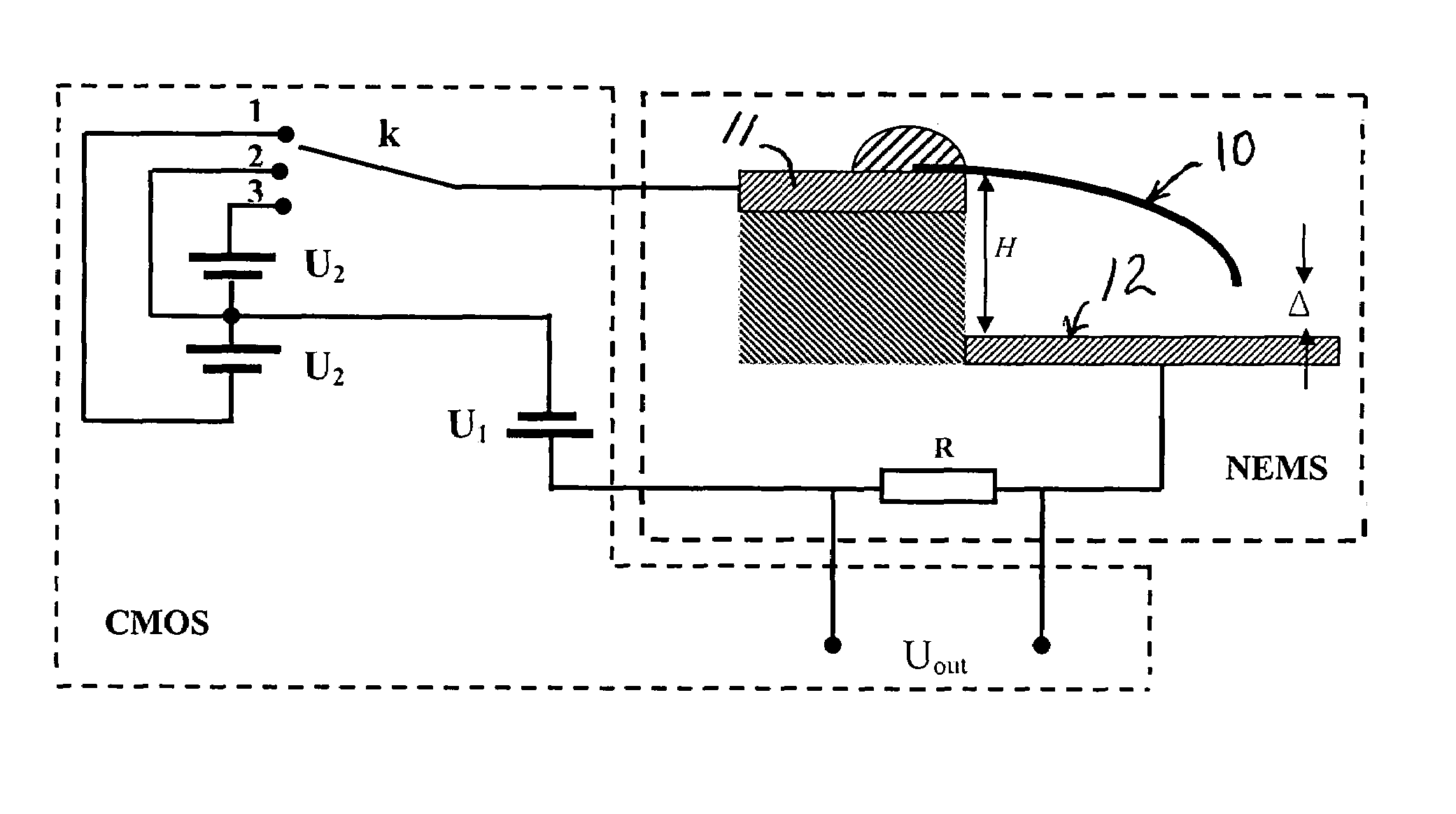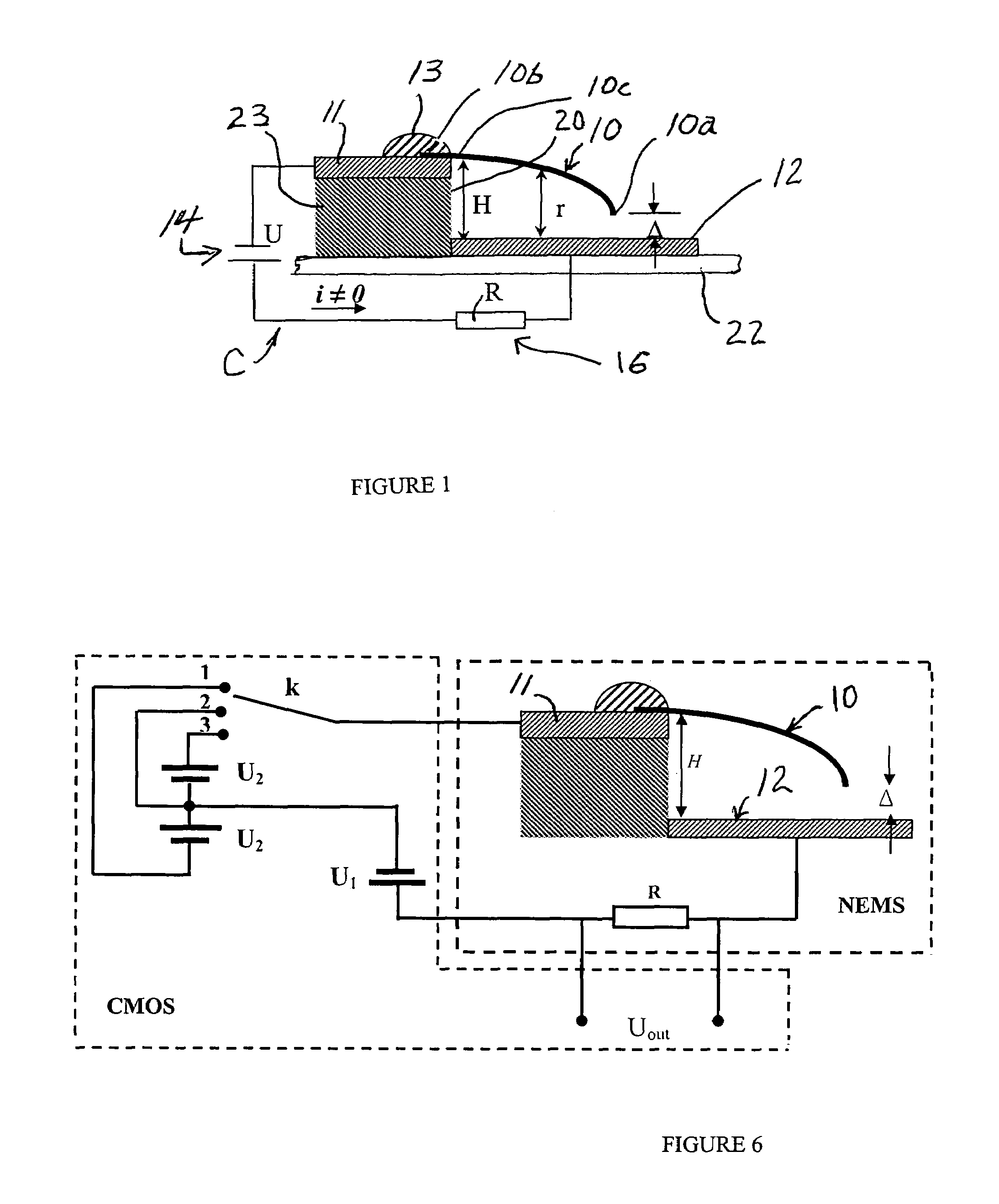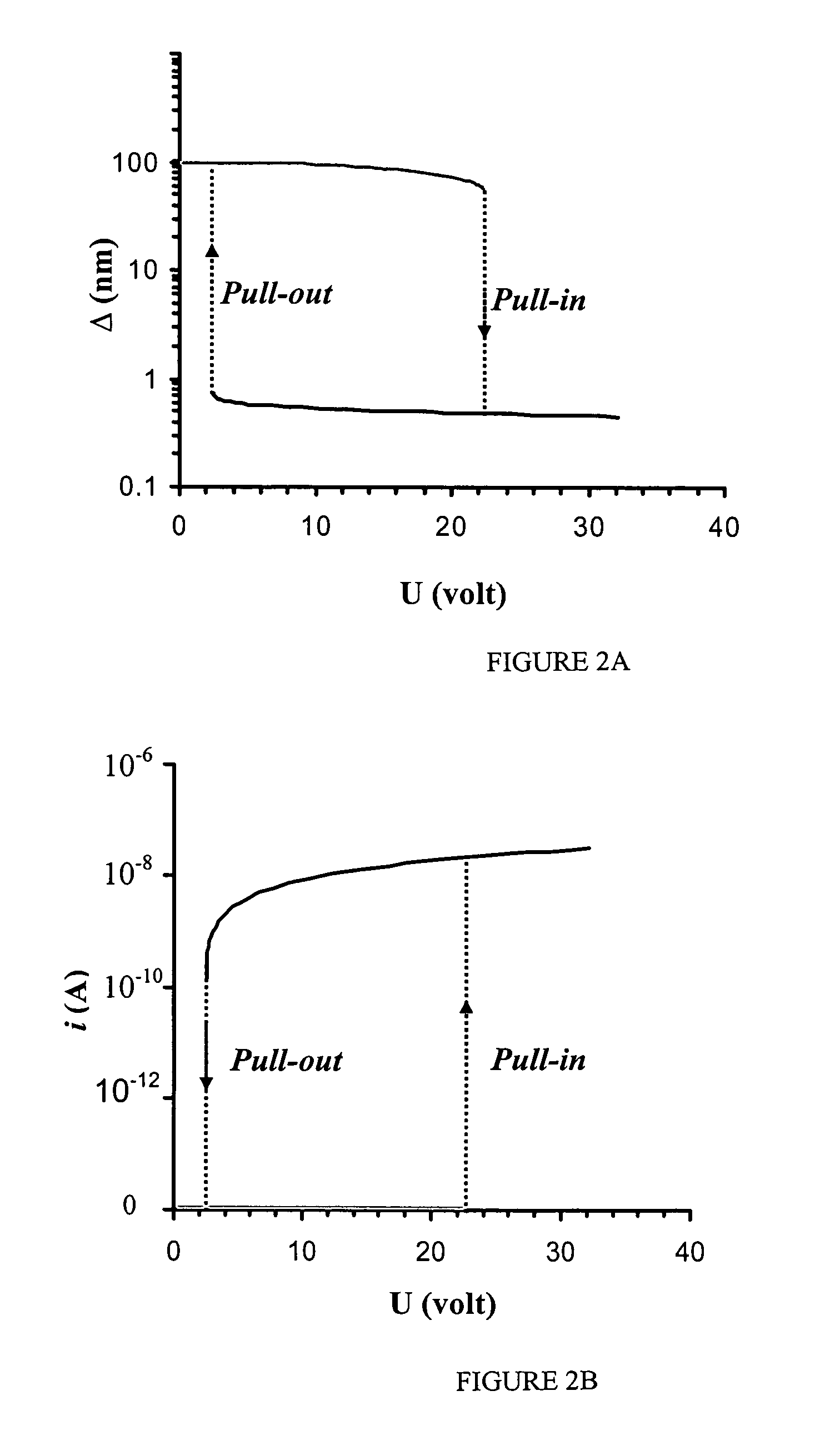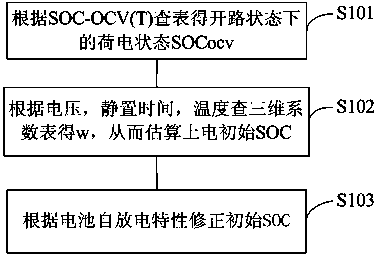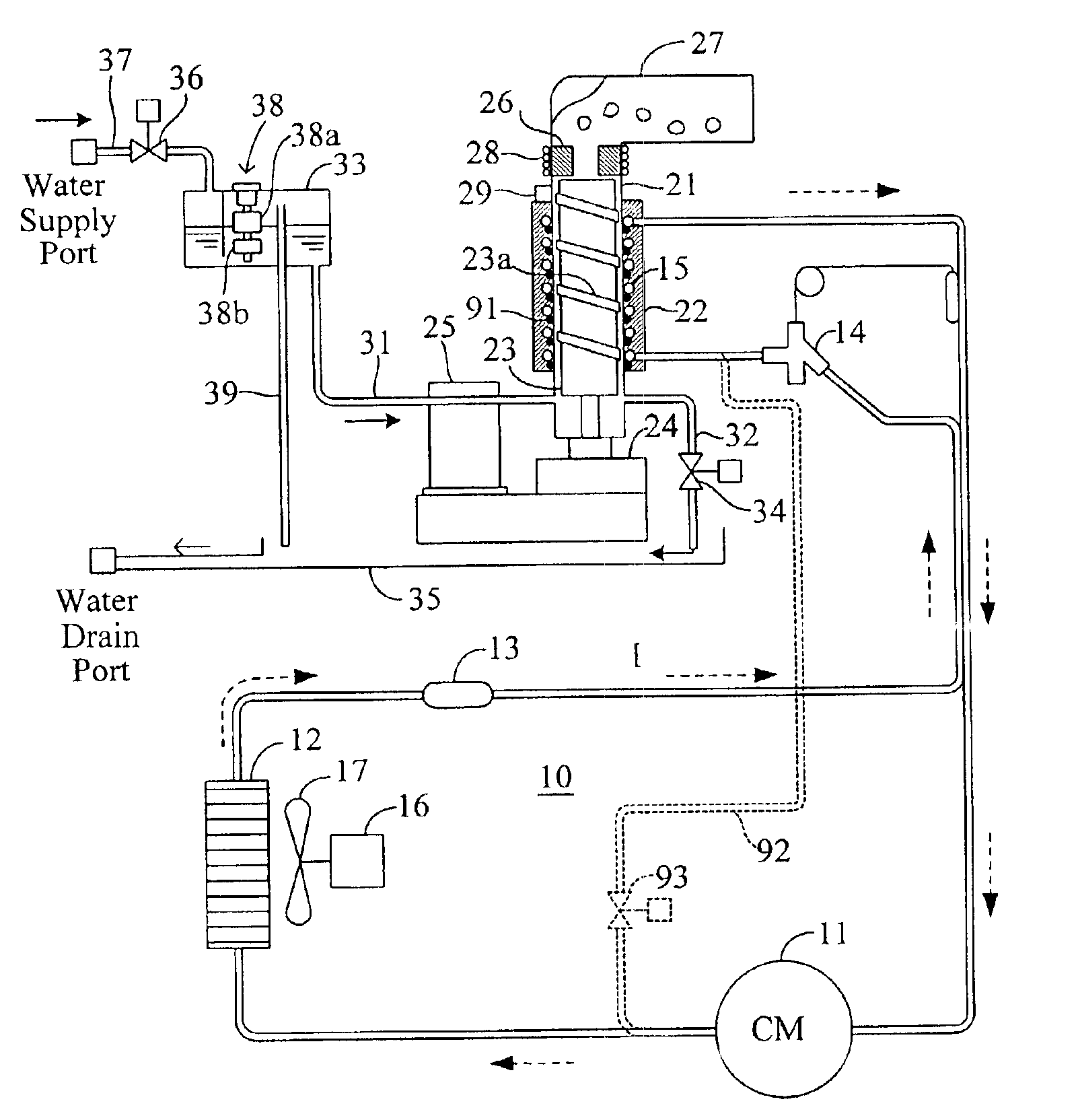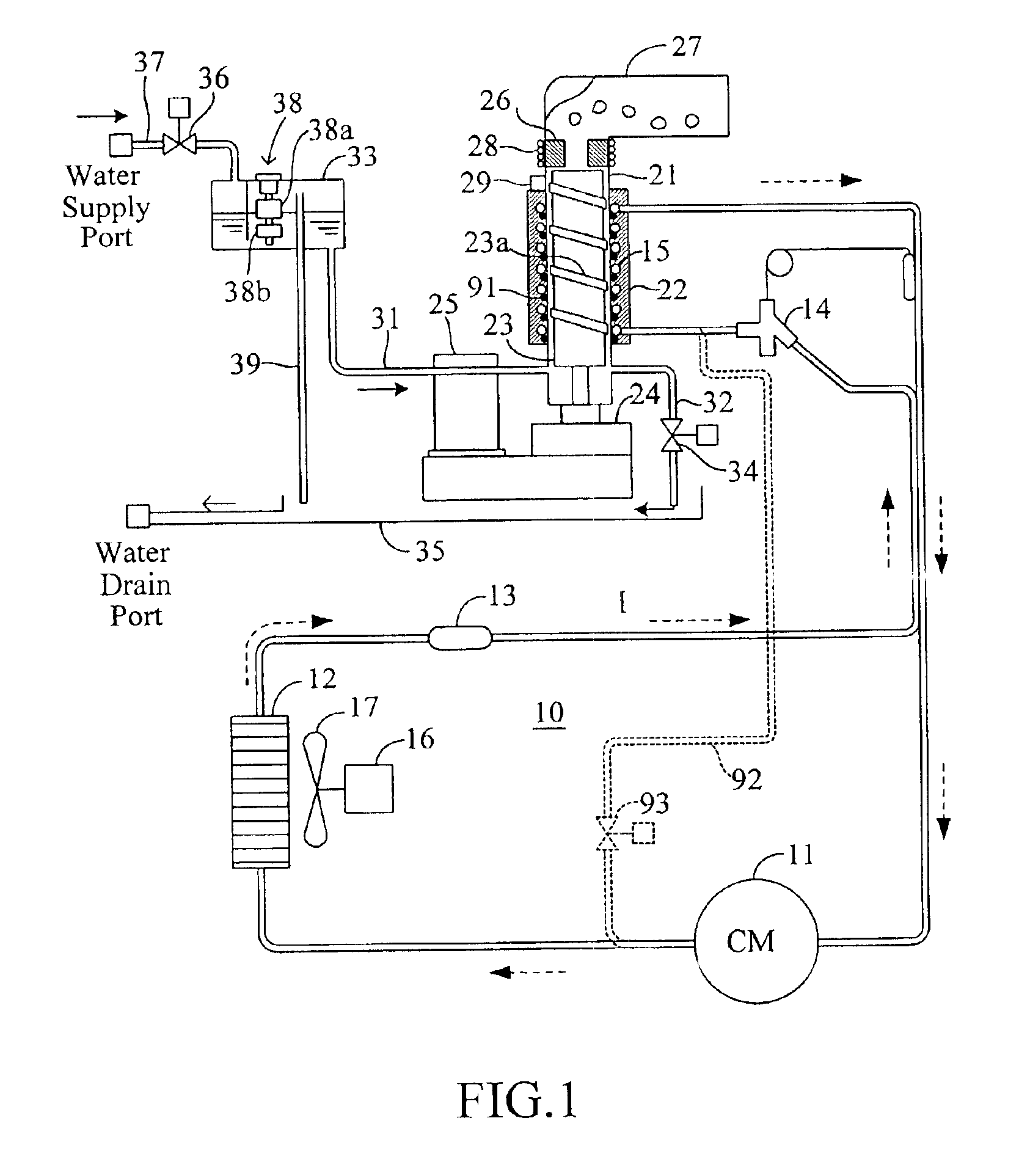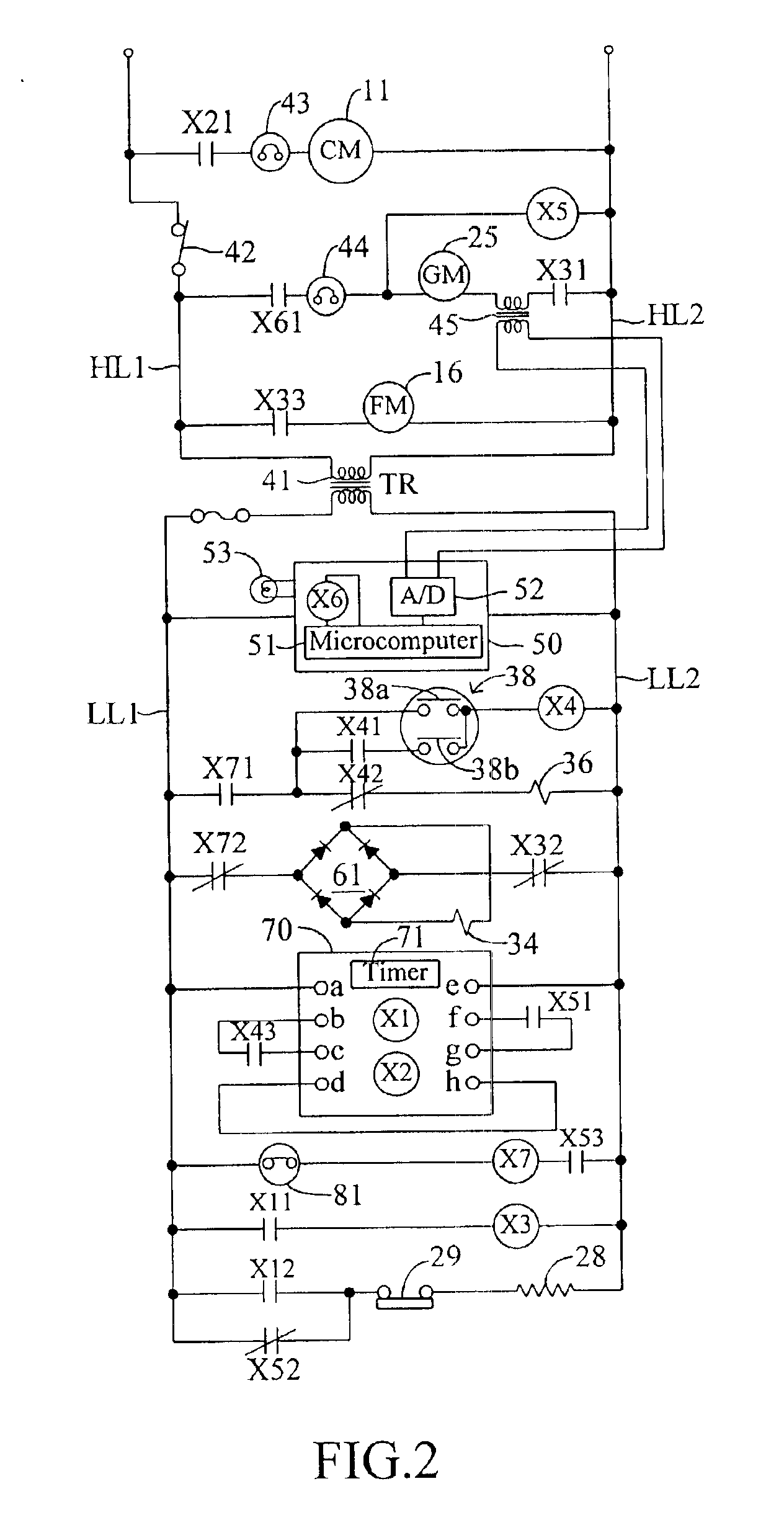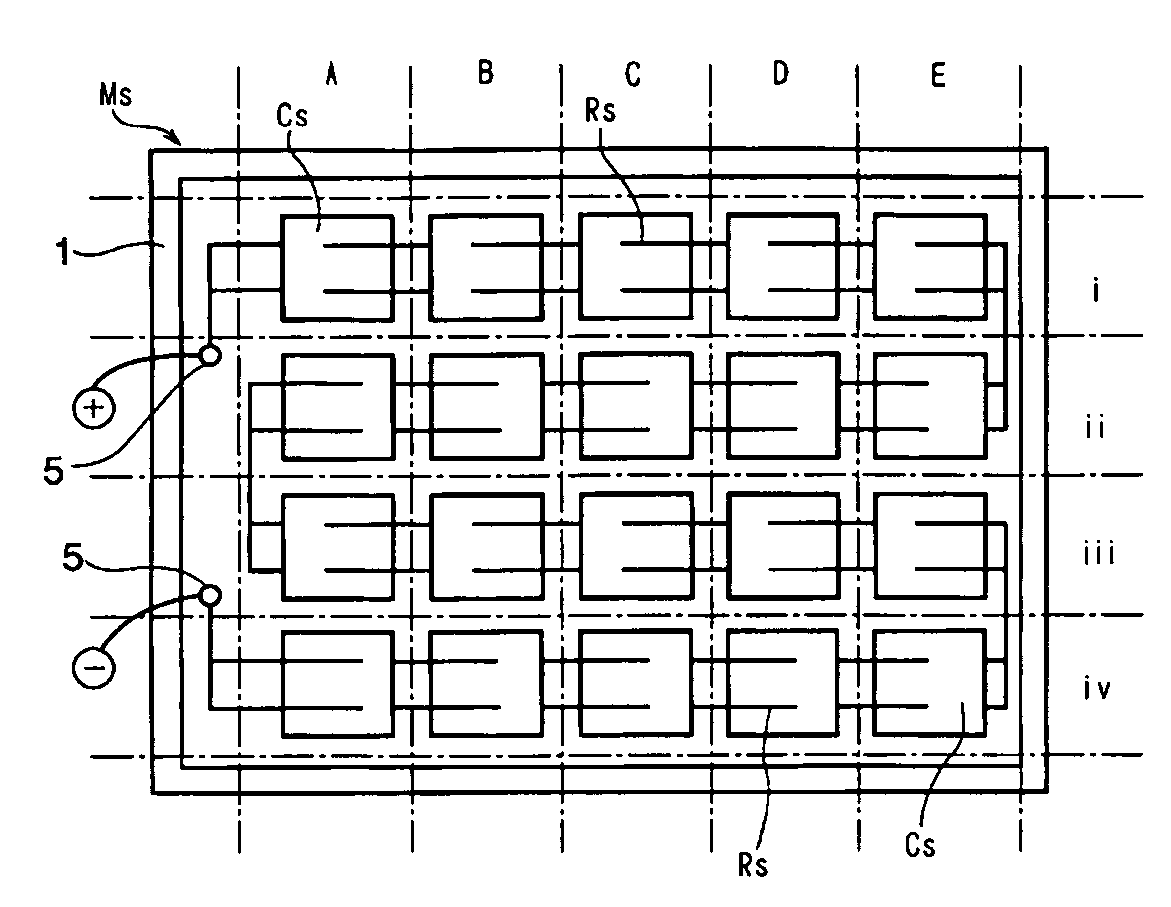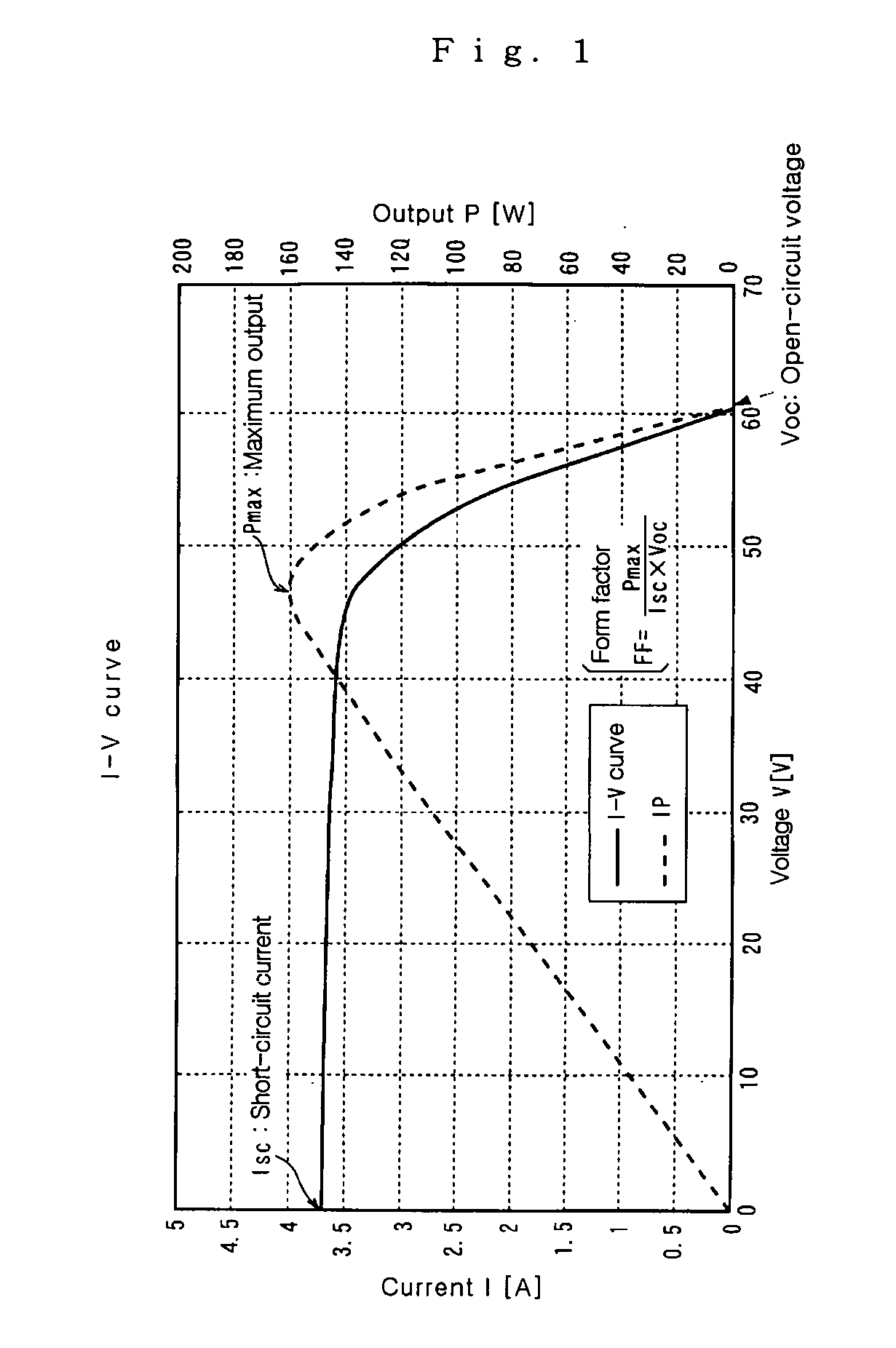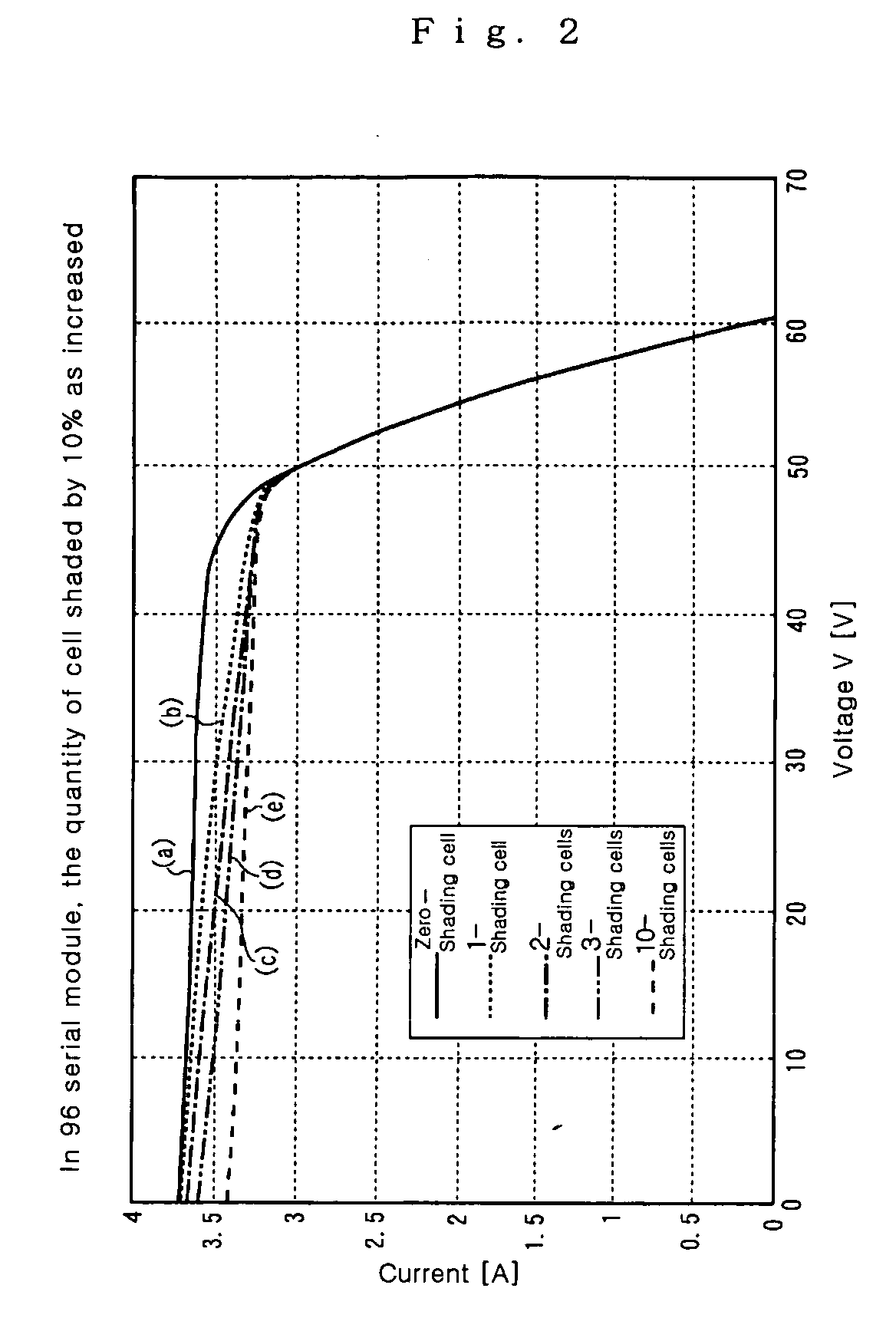Patents
Literature
Hiro is an intelligent assistant for R&D personnel, combined with Patent DNA, to facilitate innovative research.
5143 results about "Current voltage" patented technology
Efficacy Topic
Property
Owner
Technical Advancement
Application Domain
Technology Topic
Technology Field Word
Patent Country/Region
Patent Type
Patent Status
Application Year
Inventor
Current is the rate at which electric charge flows past a point in a circuit. In other words, current is the rate of flow of electric charge. Voltage, also called electromotive force, is the potential difference in charge between two points in an electrical field.
Organic el display device having an improved image quality
InactiveUS6246180B1Static indicating devicesElectroluminescent light sourcesVoltage converterImaging quality
A drive unit for driving a corresponding one of organic EL elements of an active matrix EL display device includes a blanking switch for blanking the video signal stored in a storage capacitor in each frame period before the start of the next frame period. A drive transistor drives a corresponding EL element based on the correct current supplied for this If the video signal is a current signal, a transistor operating as a current-voltage converter is provided
Owner:GOLD CHARM LTD
Reflection photodetector and biological information measuring instrument
InactiveUS6198951B1Inertial sensorsMeasuring/recording heart/pulse ratePower flowAudio power amplifier
When emitted light from LED 31 is incident on photodiodes 32 and 33 with luminance Pa and Pb, currents ia and ib are generated according to luminance Pa and Pb. When outside light is incident through the finger tissues on photodiodes 32 and 33 with luminance Pc, current ic is produced. The current i1 (=ia+ic) generated by photodiode 32, and the current i2 (=-ib-ic) generated by photodiode 33, are added at node X, and the current ic corresponding to outside light is thus cancelled. In addition, photodiodes 32 and 33 are disposed at different distances from LED 31. As a result, the current flowing to opamp 34 is current ia corresponding to luminance Pa because luminance Pb is extremely low. The opamp 34 then applies a current voltage conversion to generate pulse wave signal Vm.
Owner:SEIKO EPSON CORP
Method and apparatus for charging batteries
InactiveUS6037751AEfficient chargingLow charge acceptanceBatteries circuit arrangementsLead-acid accumulatorsCharge currentCurrent voltage
A method and apparatus for efficiently charging lead-acid batteries applies small voltage steps to probe the charging efficiency of a battery being charged. The application of a voltage step causes the current to change from a base current to a surge current immediately after the voltage step, and to decay asymptotically to a plateau current after the surge current. A current ratio, defined as the difference between the plateau current and the base current divided by the difference between the surge current and the base current, is used as an indicator of the charging efficiency. The output voltage of the power supply charging the battery is then adjusted according to the measured current ratio. A current-voltage slope, defined as the difference between the plateau current and the base current divided by the magnitude of the voltage step, may also be used as an indicator of the charging efficiency for controlling the charging process. Alternatively, in a current-controlled charging process, small current steps are used to probe the charging efficiency. For a current step, the induced voltage changes are measured, and a transient-plateau voltage ratio is calculated. The charging current is then adjusted according to the calculated voltage ratio.
Owner:MIDTRONICS
Method and apparatus for managing and uniformly maintaining pixel circuitry in a flat panel display
InactiveUS20080048951A1Accurate aging correctionStatic indicating devicesQuantum efficiencyDisplay design
The present invention describes a method and apparatus for measuring the voltage and current characteristics of the OLED pixel as it ages and correlating the measured data to the decrease in quantum efficiency and changes in OLED impedance over the life of the OLED, so that corrections can be made to the image drive system to prevent image sticking and color point drift. The method and apparatus of the present invention do not require any additional circuitry or changes in the display design. The circuitry of the present invention is implemented in the display driver integrated circuit (IC) chips. The basis of the invention is the luminance-current-voltage (LIV) curves which characterize the OLED materials over their life time. A series of these curves are stored in memory representing a OLED material at various ages. The apparatus of the present invention is used to measure driver voltages and currents for a pixel having an OLED, which measurements are then used to extract the voltage current curve for the OLED at any point in time. The extracted curve is compared to the aging curves stored in memory to determine the aging curve that best describes the measured present voltage current characteristic of the pixel. That aging curve is used to drive the pixel.
Owner:LEADIS TECH
Near field RF communicators and near field RF communications enabled devices
ActiveUS8140010B2Avoid powerAvoid timeTransformersNear-field systems using receiversPhase detectorCurrent voltage
A near field RF communicator (100) has an inductive coupler (102) and a first signal provider (109, 110, 111) to cause the inductive coupler to provide a first signal that when inductively coupled to the inductive coupler of another near field RF communicator in near field range is insufficient to cause initiation of communication with that other near field RF communicator. A sensor (116) senses a change in an impedance of the inductive coupler (102) due to inductive coupling of the first signal between the inductive couplers of the said near field RF communicator and a said other near field RF communicator in near field range. A controller (107) determines whether or not another near field RF communicator is in near field range on the basis of any change in impedance sensed by the sensor and, if another near field RF communicator is determined to be in near field range, causes a second signal to be inductively coupled to the other near field RF communicator to initiate communication between the two near field RF communicators. The sensor may use a phase detector (118) to enable a change in impedance to be sensed by detecting a change in a current-voltage phase relationship resulting from a change in impedance.
Owner:NXP USA INC
Method and circuit arrangement for the ageing compensation of an organic light-emitting diode and circuit arrangement
ActiveUS20060214888A1Simple wayCathode-ray tube indicatorsInput/output processes for data processingCurrent electricCurrent voltage
The invention relates to a method and a circuit arrangement for the ageing compensation of an organic light-emitting diode (OLED) which is fed from a supply voltage and is switched by means of a driver transistor operated in saturation operation, by means of a driving of the light-emitting diode. The method comprises the following steps of: storing at least one desired current-voltage value pair of a desired current-voltage characteristic curve of the light-emitting diode; transferring the driver transistor from saturation operation to linear operation during a measurement cycle; measuring a current value for the current through the light-emitting diode by means of a current measuring circuit in the measurement cycle; determining at least one present current-voltage value pair of a present current-voltage characteristic curve of the light-emitting diode by means of the measured current value; comparing the at least one present current-voltage value pair of the light-emitting diode with the desired current-voltage value pair of the light-emitting diode; and generating driving parameters for driving the light-emitting diode in a manner dependent on the result of the comparison.
Owner:NOVALED GMBH
Light-emitting diode driving apparatus and light-emitting diode lighting controlling method
ActiveUS20110199003A1Improving operation efficiencyImprove power factorElectrical apparatusElectroluminescent light sourcesCurrent voltageEngineering
A LED driving apparatus includes a rectifying circuit 2, first, second and third blocks 11, 12 and 13, and first and second switching portions. The rectifying circuit 2 is connected to AC power supply, and rectifies AC voltage of the AC power supply to provide pulsating current voltage. Each block includes a plurality of LEDs. The first, second and third blocks 11, 12 and 13 are serially connected to the output side of the rectifying circuit 2. The first switching portion switches ON / OFF of a first bypass path BP1 based on flowing current amount in the first block 11. The first bypass path BP1 bypasses the second block 12. The second switching portion switches ON / OFF of a second bypass path BP2 based on flowing current amount in the first and second blocks 11 and 12. The second bypass path BP2 bypasses the third block 13.
Owner:NICHIA CORP
Method and circuit arrangement for the ageing compensation of an organic light-emitting diode and circuit arrangement
ActiveUS7656370B2Cathode-ray tube indicatorsInput/output processes for data processingCurrent electricCurrent voltage
The invention relates to a method and a circuit arrangement for the ageing compensation of an organic light-emitting diode (OLED) which is fed from a supply voltage and is switched by means of a driver transistor operated in saturation operation, by means of a driving of the light-emitting diode. The method comprises the following steps of: storing at least one desired current-voltage value pair of a desired current-voltage characteristic curve of the light-emitting diode; transferring the driver transistor from saturation operation to linear operation during a measurement cycle; measuring a current value for the current through the light-emitting diode by means of a current measuring circuit in the measurement cycle; determining at least one present current-voltage value pair of a present current-voltage characteristic curve of the light-emitting diode by means of the measured current value; comparing the at least one present current-voltage value pair of the light-emitting diode with the desired current-voltage value pair of the light-emitting diode; and generating driving parameters for driving the light-emitting diode in a manner dependent on the result of the comparison.
Owner:NOVALED GMBH
Semiconductor device
ActiveUS20080158137A1Reduce power consumptionHighly convenientStatic indicating devicesMaterial analysis by optical meansIlluminanceAudio power amplifier
A photoelectric conversion device includes a light detection circuit which includes an optical sensor to output a current signal corresponding to illuminance and a current-voltage conversion circuit to convert the current signal output from the optical sensor into a voltage signal; an amplifier to amplify the voltage signal output from the light detection circuit; a comparison circuit to compare voltage output from the amplifier and reference voltage and output the result to a control circuit; and the control circuit to determine an illuminance range to be detected depending on the output from the comparison circuit and output a control signal to the light detection circuit. The current-voltage conversion circuit has a function of changing a resistance value in accordance with the control signal.
Owner:SEMICON ENERGY LAB CO LTD
Electronic cigarette and control method thereof
ActiveCN104116138AAvoid burnt smellSave powerTobacco devicesOhmic-resistance heating detailsLower limitCurrent voltage
The invention provides an electronic cigarette and a control method thereof. The electronic cigarette comprises a heating wire assembly, a power source and a controller. The heating wire assembly is used for generating heat and comprises heating wires, wherein the resistance value of the heating wires changes along with the changes of temperatures. The power source is used for providing voltages for the heating wire assembly. The controller is electrically connected with the heating wire assembly and the power source and used for controlling the power source to output the voltages. The controller comprises a temperature detecting module which is used for detecting the resistance value of the heating wires to obtain the real-time temperature of the heating wire assembly, an upper limit heating temperature and a lower limit heating temperature are set in the temperature detecting module, the controller controls the power source to output a first voltage when the real-time temperature is smaller than or equal to the lower limit heating temperature and controls the power source to output a second voltage when the real-time temperature is larger than or equal to the upper limit heating temperature, the second voltage is smaller than the first voltage, and the controller controls the power source to keep outputting the current voltage when the real-time temperature is larger than the lower limit heating temperature and smaller than the upper limit heating temperature. The electronic cigarette and the control method thereof can ensure the taste consistency of the smoke of all times and save electric quantity.
Owner:SHENZHEN SMOORE TECH LTD
LED driving power supply control circuit and LED lamp by using same
InactiveCN101715265ALuminous stabilityStable jobAc-dc conversion without reversalElectric light circuit arrangementOvervoltageFull wave
The invention relates to an LED driving power supply control circuit. The LED driving power supply control circuit comprises an EMI filter and rectifier module, a DC-DC isolation constant current driver module, an input under-voltage lag protection module, and an output current protection module, wherein the EMI filter and rectifier module is used for performing EMI filter and full-wave rectification on an alternating-current voltage input by a power supply to generate a direct-current voltage; the DC-DC isolation constant current driver module is used for processing the direct-current voltage so as to generate a constant output current for the work of the LED power supply; the input under-voltage lag protection module is used for clamping and splitting the direct-current voltage so as togenerate an enable signal and controlling the DC-DC isolation constant current driver module to start or not to start according to the enable signal; and the output current protection module is used for detecting the constant output current and controlling the DC-DC isolation constant current driver module to stop generating the output current while the constant output current exceeds a current threshold. The invention also relates to an LED lamp. The LED driving power supply control circuit and the LED lamp realize the alternating-current inputting and constant-current outputting in a wide range and have the input clamping lag protection and the output overvoltage protection functions.
Owner:OCEANS KING LIGHTING SCI&TECH CO LTD +1
Power-mode controlled power converter
A power-mode controlled power converter is capable of supplying a constant output voltage and output current. A PWM controller generates a PWM signal in response to a voltage sampled from a transformer auxiliary winding. A programmable current-sink and a detection resistor compensate for a voltage drop of an output rectifier. A low-pass filter integrates a switching-current voltage to an average-current signal. An attenuator produces an input-voltage signal from a line-voltage input signal. The PWM controller multiplies the average-current signal with the input-voltage signal to generate a power-control signal. An error-amplifier compares the power-control signal with a power-reference voltage to generate a limit voltage. The limit voltage controls the power delivered from a primary-side circuit to a secondary-side circuit of the power-mode controlled power converter. Since the power-reference voltage varies in proportional to output voltage variations, a constant output current is therefore achieved.
Owner:SEMICON COMPONENTS IND LLC
Systems and methods for adjusting programming thresholds of polymer memory cells
InactiveUS7289353B2Increase flexibilityImprove performanceNanoinformaticsNavigation by terrestrial meansTime domainVoltage pulse
Systems and methodologies are provided for adjusting threshold associated with a polymer memory cell's operation by applying thereupon a regulated electric field and / or voltage pulse width, during a post fabrication stage. Such customization of programming thresholds can typically be obtained at any cycle of programming the memory cell, to increase flexibility in circuit design. Accordingly, the present invention supplies both a current-voltage domain, and / or a frequency-time domain, to facilitate adjusting the program thresholds of the polymer memory cell.
Owner:MONTEREY RES LLC
Complementary zener triggered bipolar ESD protection
An electrostatic discharge (ESD) protection clamp (61) for I / O terminals (22, 23) of integrated circuits (ICs) (24) comprises an NPN bipolar transistor (25) coupled to an integrated Zener diode (30). Variations in the break-down current-voltage characteristics (311, 312, 313, 314) of multiple prior art ESD clamps (31) in different parts of the same IC chip is avoided by forming the anode (301) of the Zener (30) in the shape of a base-coupled P+ annular ring (75) surrounded by a spaced-apart N+ annular collector ring (70) for the cathode (302) of the Zener (30). Even though an angled implant (51, 86, 98) used to form the N+ annular collector ring (70) causes location dependent variations in the width (53) of the Zener space charge (ZSC) region (69), the improved annular shaped clamp (61) always has a portion that initiates break-down at the design voltage so that variations in the width (53) of the ZSC region (69) do not cause significant variations in the clamp's current-voltage characteristics (611, 612, 613, 614).
Owner:NXP USA INC
Overcurrent protection circuit and liquid crystal display
The embodiment of the invention discloses an overcurrent protection circuit, and the circuit comprises a level converter and a substrate array line drive (GOA) circuit in electrical connection with the level converter. The circuit also comprises a current detection circuit, a current-voltage converter, a voltage comparator, a timer control register, and a logic gate circuit. The GOA circuit is connected with the current detection circuit, and the current detection circuit is connected with the current-voltage converter. The current-voltage converter is connected with the in-phase input end of the voltage comparator, and the inverted-phase input end of the voltage comparator is connected with a reference voltage. The output end of the voltage comparator is connected with the input end of the timer control register and the first input end of the logic gate circuit. The output end of the timer control register is connected with the second input end of the logic gate circuit. The output end of the logic gate circuit is connected with the level converter. According to the embodiment of the invention, the circuit can prevent the wrong triggering of an overcurrent protection operation. The invention also provides a liquid crystal display comprising the circuit.
Owner:TCL CHINA STAR OPTOELECTRONICS TECH CO LTD
Intelligent charge-discharge controller for battery and electronic device having same
An intelligent charge-discharge controller for a battery includes a charging voltage test circuit configured for testing an input voltage of the battery when in charge; a charging current control circuit configured for controlling an input current of the battery based on the tested input voltage; a battery voltage test circuit configured for testing a current voltage of the battery; and a discharging current control circuit configured for controlling a discharging current of the battery. The charging voltage test circuit and the battery voltage test circuit each are electrically connected to the charging current control circuit, and the charging voltage test circuit and the discharging current control circuit have a common circuit section. An electronic device having the intelligent charge-discharge controller is also provided.
Owner:SHENZHEN FIRST UNION TECH CO LTD
Display device and electronic equipment using the same
InactiveUS6876350B2Reduce conversionHigh current accuracyCathode-ray tube indicatorsInput/output processes for data processingActive matrixDisplay device
In an active matrix EL display device, pixels which are suitable for a constant current drive are structured. The pixel includes a first switch which has one end connected to a source signal line and the other end connected to a current-voltage conversion element, a second switch which has one end connected to the current-voltage conversion element and the other end connected to a voltage holding capacitor and to a voltage-current conversion element, and a pixel electrode connected to the current-voltage conversion element and to the voltage-current conversion element.
Owner:SEMICON ENERGY LAB CO LTD
Active matrix type display device, active matrix type organic electroluminescent display device, and methods of driving such display devices
InactiveUS7612745B2Increase the areaReduce areaStatic indicating devicesElectroluminescent light sourcesActive matrixCurrent voltage
When a current-writing type pixel circuit is made, it involves a greater number of transistors and TFTs occupy much of the area of the pixel circuit. To alleviate this problem, two pixel circuits (P1, P2) have a first scanning TFT (14), a current-voltage conversion TFT (16), respective second scanning TFTs (15-1, 15-2), capacitors (13-1, 13-2), and drive TFTs (12-1, 12-2) for OLED including organic EL elements (11-2, 11-2) of two pixels, for example, in a row direction. In each of the pixel circuits, the first scanning TFT (14) handling a large amount of current (Iw) as compare with current flowing through the OLED (11-2, 11-2), and the current-voltage conversion TFT (16) are shared between two pixels.
Owner:SONY CORP
Active and reactive coordination control method for permanent-magnet direct-driven wind turbines in low-voltage ride-through process
InactiveCN102664427AReduce active power lossDC voltage fluctuation is smallSingle network parallel feeding arrangementsReactive power adjustment/elimination/compensationDC - Direct currentRotor (electric)
Enclosed is an active and reactive coordination control method for permanent-magnet direct-driven wind turbines in the low-voltage ride-through process. Two different control strategies are employed for a grid side converter according to amplitude change of power grid voltage: when the power grid voltage is in a normal state, the grid side converter is in an active-priority maximum power tracing control mode so that the wind turbines capture wind energy to the maximum extent; when the power grid voltage is beyond the normal range, the grid side converter is in an active priority control mode so that the dynamic reactive current which is injected into an electricity system meets the requirements of grid combining. An engine side converter is in a direct-current voltage control mode based on rotor energy storage, power unbalance of the direct-current side of the engine side converter is relieved and the direct-current voltage is stabilized by utilizing the self rotating speed of the permanent-magnet direct-driven wind turbines and the change of the kinetic energy. The active and reactive coordination control for the wind turbines before or after the sudden change of the power grid voltage is realized according to the amplitude change of the power grid voltage, the fluctuation of the direct-current bus voltage is restrained by releasing or storing the rotor kinetic energy, so that the low-voltage ride-through capability of the permanent-magnet direct-driven wind turbines is improved, reactive power support is rapidly and accurately provided for the power grid, and certain support is given to restoration of the power grid voltage.
Owner:NORTH CHINA ELECTRIC POWER UNIV (BAODING)
Vehicle and charging control method and system used for vehicle low-voltage battery
ActiveCN105922873AReduce static lossElectric powerVehicular energy storageLow voltageCurrent voltage
The invention discloses a vehicle and a charging control method and system used for a vehicle low-voltage battery. The charging control method comprises the following steps that after the vehicle enters a still standing state, a vehicle controller enters a low power consumption timing mode and starts timing; when the timed time reaches the wake-up time stored in the vehicle controller, the vehicle controller is woken up, the current voltage of the low-voltage battery is detected through the vehicle controller, and whether the current voltage of the low-voltage battery is smaller than or equal to the preset lower electric quantity voltage threshold value or not is judged; and if the current voltage of the low-voltage battery is smaller than or equal to the preset lower electric quantity voltage threshold value, the vehicle controller controls a DC / DC converter to work so that the low-voltage battery can be charged. According to the charging control method used for the vehicle low-voltage battery, when the timed time reaches the wake-up time, the current voltage of the low-voltage battery is judged so as to determine whether charging is conducted, and thus the low-voltage battery can be charged according to the actual demand; and in addition, the still standing loss of the vehicle can be reduced.
Owner:BEIJING ELECTRIC VEHICLE
Vertical organic thin film transistor and organic light emitting transistor
InactiveUS20060145144A1Improve light emission efficiencyImprove efficiencySolid-state devicesSemiconductor/solid-state device manufacturingManufacturing technologyCurrent voltage
A vertical organic thin film transistor is provided along with an organic light-emitting transistor, which is characterized in that an active layer is formed of a p-type organic semiconductor compound having a dielectric constant of 3.5 or more, and work function values of an anode and a cathode are different from each other. The vertical organic thin film transistor is advantageous because it exhibits excellent current-voltage properties due to a short channel length, and has simple fabrication processes. Also, in the vertical organic thin film transistor, current properties in response to the gate voltage are of an enhancement type. Therefore, the vertical organic thin film transistor may be fabricated into the organic light-emitting transistor through a simple process.
Owner:SAMSUNG ELECTRONICS CO LTD
Varistors based on nanocrystalline powders produced by mechanical grinding
InactiveUS6620346B1Lower breakdown voltageImprove breakdown voltageMaterial nanotechnologyConductive materialGrain boundaryBreakdown voltage
The invention concerns novel varistors based on zinc oxide and a method for making same, which consists in using as base products nanocrystalline powders obtained by high-intensity mechanical grinding and in subjecting the mixture resulting from said nanocrystalline powders a consolidating treatment such as sintering, in suitably selected temperature and time conditions so as to retain the smallest possible grain size of ZnO. The resulting varistors have a very fine homogeneous microstructure and an average grain size characteristically not more than 3pm, i.e. five times smaller than standard materials. Said novel varistors have a larger number of grain boundaries per unit length unit and therefore a much higher breakdown voltage. Said voltage is characteristically higher than 10 kV / cm and can reach 17 kV / cm which is almost one order of magnitude above the breakdown voltage of standard varistors. The non-linearity coefficient of the current-voltage curve is also improved, and is greater than 20 and can reach values as high as 60. Moreover, the leakage currents below the breakdown voltage of said varistors, are much lower.
Owner:HYDRO QUEBEC CORP
Light source assembly for vehicle external lighting
InactiveUS20050093718A1Avoid problemsEffective carryNon-electric lightingLighting support devicesEffect lightLight-emitting diode
An aircraft light assembly comprises a light apparatus configured to be supported in a space on the body of an aircraft. The apparatus has one or more light emitting diodes (13) generating visible light and an outer structure overlying the LEDs. The outer structure includes a light transmission portion through which visible light from the LEDs can pass, and a metallic portion with an outer surface exposed to the external airflow. A heat-transmitting connection thermally links the LEDs to the metallic portion so that heat from the LEDs flows to the outer surface and is dissipated to the external airflow. The light assembly is configured to be secured in a conventional socket for an incandescent navigation light bulb and to receive the electrical current supplied thereto by the aircraft electrical system. Civilian applications of the unit have only visible LEDs. When the unit is for a military aircraft, it has electric circuitry connected with a visible light source and an IR light source, and the electric circuitry is configured to process the input current from the socket and based thereon operate in either a visible mode or covert IR mode. Where the current is in one electrical state, such as for example a certain voltage, the electric circuit sends power only to the visible light source. When the current is in a different electrical state, e.g., a different voltage level, the circuitry sends power only to the IR source, and no visible light is emitted. Different input current voltages or characteristics are also used to cause the IR emitter to flash in various patterns that can be programmed into the unit. All control may be accomplished over a single pair of wires, as in existing systems that do not have IR mode capability. To upgrade existing aircraft, light source units a shaped to fit in the apertures for existing lenses over incandescent navigational fixtures.
Owner:L 3 COMM CORP
Mixed-mode (current-voltage) audio amplifier
ActiveUS20050134374A1Total current dropReduce voltageNegative-feedback-circuit arrangementsLow frequency amplifiersAudio power amplifierCurrent voltage
A method and system for providing a mixed-mode (current- and voltage-source) audio amplifier is disclosed. The mixed-mode amplifier includes a voltage sensing feedback path including a first network comprising at least one circuit; and a current sensing feedback path including a second network comprising at least one circuit. According to the method and system disclosed herein, the first and second networks vary an output impedance or transconductance of the amplifier as a function of frequency of the input voltage signal, such that at a first frequency range, the amplifier operates substantially as a current amplifier, and at a second frequency range, the amplifier operates substantially as a voltage amplifier, thereby inheriting distortion reduction of the current amplifier and stability of the voltage amplifier.
Owner:TYMPHANY HK
Inductively coupled stress/strain sensor
InactiveUS6912911B2Change relationshipForce measurement by measuring magnetic property varationWork measurementMagnetostrictionCouple stress
An improved method of sensing strain allows measurements of stress, torque, vibration and other loads imposed on a body without physical contact between the body / sensor and the monitoring equipment. An induction loop is at least partially comprised of a magnetostrictive material with a non-linear current-voltage relationship. An excitation device such as a coil is used to induce an AC response in the sensor. The non-linear response to the induced current is received by a sensing device such as a sensing coil, and the output thereof is filtered. The excitation device and sensing device are located in operative proximity to the sensor, but need not be in contact therewith, allowing easy measurement in small spaces, under harsh conditions, or of moving bodies such as drive shafts. The non-linear response of the sensor induces easily detectable harmonics of the base frequency of excitation. These harmonics may advantageously be measured as well.
Owner:SENSORTEX
Organic semiconductor diode
InactiveUS7211824B2Solid-state devicesSemiconductor/solid-state device manufacturingSchottky barrierP–n junction
The present invention relates to organic semiconductor diodes, in particular, to the diodes with nonlinear current-voltage characteristics, which are used for power switching, rectifying variable signals, and frequency mixing. The organic semiconductor diode with the p-n junction comprises an anode, cathode, a hole transport layer in contact with the anode, and an electron transport layer in contact with the cathode, and two transport layers being in contact with each other. Another aspect of the present invention is a Schottky barrier diode comprising anode, cathode, and an organic semiconductor layer, wherein the semiconductor layer is either hole or electron transport layer. At least one of the transport layers is characterized by a globally ordered crystalline structure with intermolecular spacing of 3.4±0.3 Å in the direction of one crystal axis. One more aspect of the present invention is a method for obtaining an organic semiconductor layer with the electron-hole type of conductivity.
Owner:NITTO DENKO CORP
Nanoelectromechanical bistable cantilever device
InactiveUS7612424B1Stable positionMechanically variable capacitor detailsNanoelectromechanical switchesHysteresisWave detection
Nano-electromechanical device having an electrically conductive nano-cantilever wherein the nano-cantilever has a free end that is movable relative to an electrically conductive substrate such as an electrode of a circuit. The circuit includes a power source connected to the electrode and to the nano-cantilever for providing a pull-in or pull-out voltage therebetween to effect bending movement of the nano-cantilever relative to the electrode. Feedback control is provided for varying the voltage between the electrode and the nano-cantilever in response to the position of the cantilever relative to the electrode. The device provides two stable positions of the nano-cantilever and a hysteresis loop in the current-voltage space between the pull-in voltage and the pull-out voltage. A first stable position of the nano-cantilever is provided at sub-nanometer gap between the free end of the nano-cantilever and the electrode with a pull-in voltage applied and with a stable tunneling electrical current present in the circuit. A second stable position of the nano-cantilever is provided with a pull-out voltage between the cantilever and the electrode with little or no tunneling electrical current present in the circuit. The nano-electromechanical device can be used in a scanning probe microscope, ultrasonic wave detection sensor, NEMS switch, random access memory element, gap sensor, logic device, and a bio-sensor when the nano-cantilever is functionalized with biomolecules that interact with species present in the ambient environment be them in air or aqueous solutions. In the latest case, the NEMS needs to be integrated with a microfluidic system.
Owner:NORTHWESTERN UNIV
Estimating method for initial value of stage of charge of high-accuracy lithium ion battery
ActiveCN103529396AImprove accuracyReduce SOC estimation errorElectrical testingEngineeringLithium-ion battery
The invention discloses an estimating method for the initial value of the stage of charge of a high-accuracy lithium ion battery and belongs to the technical field of automobile power batteries. The estimating method comprises the following steps: firstly, according to a corresponding relation curve of the open-circuit voltage and an SOC (Stage of Charge) at different temperatures, estimating an open-circuit voltage stage of charge (SOCocv) through the lookup table; secondly, according to standing time of the battery, the current voltage platform of the battery and the battery pack temperature, obtaining a power-on initial stage of charge through the three-dimensional lookup table; finally, according to the self-discharging characteristic of the battery, correcting the initial stage of charge. Through the adoption of the method disclosed by the invention, an accumulated error caused by inaccuracy of the initial value estimated through an ampere-hour integral method and the estimation error of stage of charge caused by static current loss in the shutdown process are effectively reduced on the basis of factors of the characteristics of the open-circuit voltage at different temperatures, the standing time of the battery, the self-discharging characteristics of the battery and the like, and the higher accuracy is achieved. The method is suitable for SOC initial value estimation of a single battery, a module and a battery assembly.
Owner:深蓝汽车科技有限公司
Abnormality detecting device of auger-type ice making machine and abnormality detecting method thereof
InactiveUS6915647B2High-precision detectionRapidly and accurately abnormalityLighting and heating apparatusIce productionVoltage converterMicrocomputer
An auger-type ice making machine has an abnormality detecting device which detects a freezing of an ice-scraping auger on the basis of a hunting of current flowing through an auger motor 25. Current flowing through the auger motor 25 is taken out by a current-voltage converter 45, and an instantaneous value of the taken-out voltage,waveform every predetermined time is A / D converted by an A / D converter 52 which is provided at a controller board 50. A microcomputer 51 detects a peak value from the A / D converted instantaneous value for determining that abnormal current flows through the auger motor 25, when a hunting of the peak value occurs a predetermined number of times or more that is not less than 2 during a predetermined time, or when the state where the hunting of the peak value occurs a predetermined number of times or more that is not less than 2 during a first predetermined time is detected a predetermined number of times or more that is not less than 2 during a second predetermined time that is longer than the first predetermined time. As for the number of hunting times, a state wherein the peak value once becomes greater than a predetermined value, and then, becomes smaller than the predetermined value is counted as one number of hunting times.
Owner:HOSHIZAKI ELECTRIC CO LTD
Measurement method of the current-voltage characteristics of photovoltaic devices, a solar simulator for the measurement, and a module for setting irradiance and a part for adjusting irradiance used for the solar simulator
InactiveUS20060238750A1Reduce local unevennessPhotometry using reference valuePhotovoltaic monitoringIlluminanceCurrent voltage
In a solar simulator for measuring the current-voltage characteristics of photovoltaic devices, it is to provide a measurement method using a solar simulator in which locative unevenness of irradiance on the test plane of the test plane side is drastically improved, not in a light source side, and a means for adjusting irradiance and the like. when an object is the photovoltaic devices Ms, and the current-voltage characteristics are measured by a solar simulator Ss equipped with a light source composed of a lamp and a reflector, and a part for setting the object to be measured, in which it is possible to dispose an irradiated test plane of the object to be measured opposite an illuminating surface of said light source, the whole test plane of said photovoltaic devices is divided imaginarily into a plurality of sections and a selected member for adjusting irradiance is disposed opposite the test plane of each imaginary sections so as to equalize or substantially to equalize the irradiance by the light source at every irradiated test plane of the sections, after which light from said light source is directed onto the test plane of the object to be measured.
Owner:NISSHINBO IND INC
Features
- R&D
- Intellectual Property
- Life Sciences
- Materials
- Tech Scout
Why Patsnap Eureka
- Unparalleled Data Quality
- Higher Quality Content
- 60% Fewer Hallucinations
Social media
Patsnap Eureka Blog
Learn More Browse by: Latest US Patents, China's latest patents, Technical Efficacy Thesaurus, Application Domain, Technology Topic, Popular Technical Reports.
© 2025 PatSnap. All rights reserved.Legal|Privacy policy|Modern Slavery Act Transparency Statement|Sitemap|About US| Contact US: help@patsnap.com
